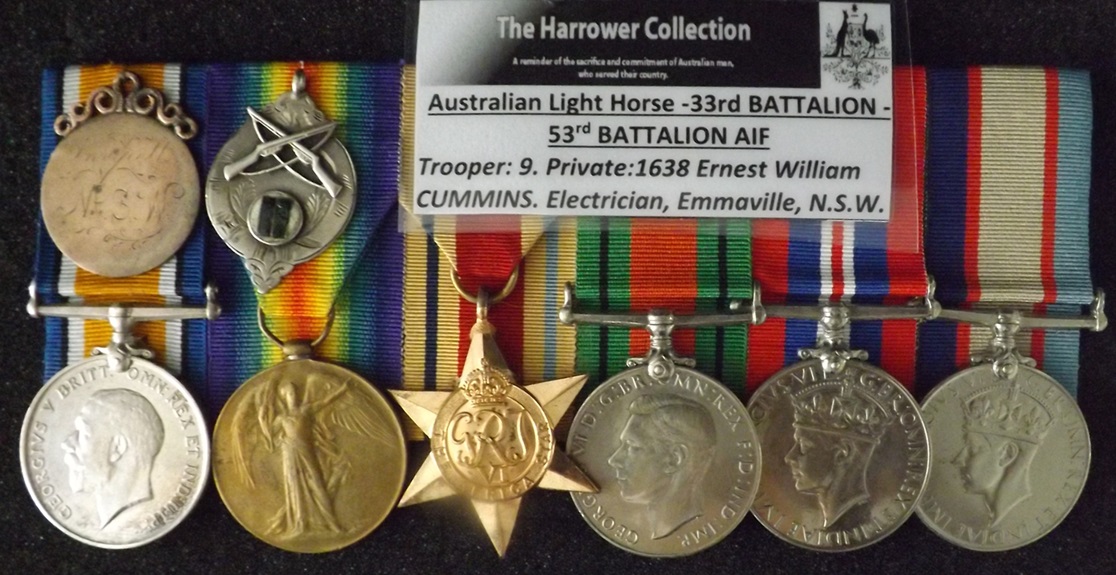
Australian Light Horse - 33rd BATTALION - 53rd BATTALION AIF
Trooper: 9 Ernest William CUMMINS
Private: 1638 Ernest William CUMMINS
Born: 11th October 1896. Adamstown via Newcastle, New South Wales, Australia. Birth Cert:
Married: 1919. Sydney, New South Wales, Australia. Marriage Cert:
Wife: Florence Irene Peal Cummins. nee: Stevenson. (1893-16/09/1986)
Died: 9th November 1943. Newcastle Hospital, Newcastle, New South Wales, Australia. Death Cert:26625/1943.
Father: Charles Ernest Cummins. (18..-1905) Died at West Maitland, New South Wales, Death Cert:13237/1905.
Mother: Dora Elizabeth Cummins. (1876-04/02/1949) Died at Murrurundi, New South Wales, Australia. Death Cert:5765/1949.
INFORMATION
Inverell Times NSW : Friday 10 September 1915, page 4
RECRUITS FAREWELLED
ANOTHER BIG DEMOMSTRATION.
STIRRING APPEAL BY MR. HAWTHORNE.
Another splendid farewell to departing volunteers, and a recruiting demonstration, was held in the Town Hall last night. The occasion was the usual citizens' farewell to a large batch of volunteers, 31 in number, who occupied seats on the stage. The hall was packed to the doors, and the utmost enthusiasm prevailed throughout the meeting. The Deputy Mayor (Ald. Jas. McIlveen) presided, and he was accompanied by Messrs. W. le Brun Brown (Chairman of the Recruiting Association), J. Hawthorne, C. Gallagher, A. M. Cansdell, A. de M. Freeman, and Ald. Maidens. The recruits sat in a semi-circle behind, the chairman. The Austral Band played several selections outside the hall prior to the commencement of the meeting. At the instance of the Chairman cheers were given for the recruits, who constituted the following: W. J. Campbell, T. J. Ryan, V. J. May, W. F. Bell, G. F. Wright, J. C. Boottom, G. E. McCarthy, W. Morgan, J. H. Bulluss, H. Thompson, C. A. Woods, E. Mason, C. F. Warby, F. G. Weizler, A. W. Addison, W. E. Medhurst E. J. Bulluss, Geo. Senior, B. Mahony, J. H. Frisby, A. Bottrell, F. B. Doyle, E. A. Stormer (farewelled at station). P. H. Bentley, C. E. Folkard, W. Madigan, H. P. Burgin, A. Barber, P. Burns, E. C. Bartley. The Deputy Mayor opened the proceedings by saying that they were assembled for a dual purpose. One was to give a fitting send-off to the splendid young men on the stage, who were going to the front. The second object was to hear a recruiting speech from their friend Mr. Hawthorne, ex-Member for Leichhardt. Mr. Hawthorne had represented his late constituency for 20 odd years, and had been selected as one of seven speakers in the State to address recruiting meetings. Already they had despatched something like 300 men from this centre, which was not at all discreditable for Inverell. He then introduced the speaker from Sydney. (Applause.)
Mr. Hawthorne , who was very cordially received, first turned to the recruits and said, "God bless them for their efforts.'" He had felt a bubbling in his throat when he watched those men, who were still wailing for their khaki uniforms, marching to the hall, as it was setting an example to the men of this district, and he hoped the example would be followed by large numbers of other eligible men. (Applause.) Politicians, generally speaking, were not the most modest of men when engaged in political warfare. It was not so that night. They had no sides in this great conflict. He would say that if they searched amongst their volunteer friends on the platform they would find descendants of all nationalities, most of them would probably be born in Australia, but their nationality would probably be mixed. It did not matter what country they belonged to, except Germany. They also did not want to know what politics a volunteer subscribed to, and thank God, it was the same all over the world. (Applause.) When the Servian incident arose which gave the Kaiser the pretext to declare war what took place at that memorable conference between the British Ambassador and the German Chancellor? The Chancellor said his troops wanted to go through Belgium. Great Britain's representative replied, "If you propose to destroy your signature you have put in connection with the treaty which guarantees the neutrality of Belgium, what will be the outcome of it all? Do you think Great Britain is going to stand by quietly and allow that treaty to be violated? I tell you, in the name of the country I represent, that Great Britain, whose name in the past has never been sullied by breaking a treaty, because she looks upon it as solemn an obligation as the honoring of a promissory note, that if you put a soldier through Belgian territory, then you must be prepared to fight the armies of England, the battleships of England, and you must be prepared to stand up against the last drop of English blood and the last shilling, for to that extent we will defend that little country." (Cheers.)
"I ask you," continued the speaker amidst applaud, "to carry out what that Ambassador said would be carried out. You must prove to Kaiser Bill that we are going to keep this battle going until every German soldier is outside Belgium, and outside France, and until such time as we can conclude an honourable and lasting peace" Great Britain was at the present time the most beloved nation in the world. If she had not declared war she would not have had a friend amongst the nations in the world. The Kaiser, with the single exception of Austria, and that not too strongly, and the unfortunate, Turk, had not a single nation on the face of the earth whom he could call a friend. The Kaiser imagined that the Home Rule controversy would rend Ireland asunder, but he had mistaken the Irish people. When the Irish were faced with an enemy like the Kaiser, and those associated with him, all creeds in Ireland buried the hatchet. Soldiers from Belfast mingled with soldiers in Dublin, and they marched together down the street singing "God Save the King." (Applause.) The Kaiser also thought that Canada would be divided, but instead the ranks closed, and the rival leaders did all they could to raise the largest army to send to the front. And they all knew what a grand part Canada had played in that magnificent battle which they fought in France. That battle would live in the history of battles. There was only one other battle equal to it in the war-fare to date, and that was the magnificent battle put up by the Australians when they landed in Gallipoli on that memorable day. (Cheers.) Thank God Mr. Kaiser had been mis-taken in the response he expected from Australia. In all their State Parliaments political warfare had been put aside; "all were for the Stale and none for the party"; and men of all classes, of all shades of religion, and of all shades of opinion whatever rose as one man, so that to-day they had the magnificent spectacle of 100,000 men fighting their way to Constantinople, and fighting in such a way as had called forth such praise from General Hamilton. (Applause.)
And so it was also with India. Again in Russia, before the war the Czar was afraid to show himself outside his place for fear of being assassinated, whereas now he had gone to the front to lead his soldiers. (Cheers.) Continuing the speaker said that if all the various portions of Australia had responded to the call of the purse and men like Inverell, the quota would be much greater than it is. He alluded to the Australia Day and Belgian Day efforts, the work of the ladies in making soldiers' comforts, and the response of the population in recruits, and said "Inverell today can stand and look all the world in the face and say, at least, that she was trying to do her duty." (Cheers.) To-day not one single vessel of the enemy was on the high seas in any of the trade routes of the world. Not only had they swept the warships from the face of the sea, but they had also swept Germany's mercantile marine off the trade routes. In the last 12 months the loss to Germany in this direction alone was 400 millions. The loss in trade and shipping combined was estimated at 550 mil-lion pounds. The boasted German navy had either to come out and be sent to the bottom, or stay in Kiel Canal until Great Britain told them they could come out. It was also now beyond a shadow of a doubt that Germany was becoming short of munitions, and both Germany and Austria at the present time were in a state of bankruptcy. Germany was now living on paper money, whereas the Allies were working on gold, and a bank note could still be turned into gold at the Bank of England. Answering his own query as to why he was canvassing for recruits, Mr. Hawthorne said, "I have come for the purpose of trying to keep the Kaiser and his friends out of our country." (Loud applause.)
Young men of fighting age must surely have arrived at the conclusion that if other people were offering their services and their lives in defence of the Empire that they had no right to stay at home and play tennis, football, or other sport. To the ladies he would say, "If you see a young man of fighting age ,and in a position to go to war, carrying a tennis racquet on his shoulder, you should tell him that instead of having a tennis racquet on his shoulder he should have a rifle." (Applause.) Any man who could give up Saturday afternoon to play sport should be able to spare six months and fight for his country. When they saw young men going to sport in nice flannel suits, cut to the latest fashion, the ladies should tell them that instead of a flannel suit they should be wearing a suit like Winter Jones. (Loud applause.) He (Mr. Hawthorne) had travelled up in the train with Winter Jones that day, and he had found him as fine a gentleman as one could wish to meet. He had given up a splendid business to go to the war, and his two brothers also intended enlisting. After a graceful little compliment to the worth of the Inverell newspapers, the speaker told how he had read of a send off at Nullamanna to Mr. Geofrey McDonald, who was leaving a wife and six children behind him. What were the single men doing that they should be placed in the position of allowing a man to leave a wife and 6 children to go and fight for us. It showed what a type of man McDonald was, and the sort of wife he had. She, brave woman, did not begin to moan about her children, but said to her husband, "If you feel it is your duty to go I'll do my duly to the children while you are away." (Applause.) Mr. Hawthorne then touchingly referred to the noble sacrifices made by several families in this town, and in this direction he mentioned Mr. and Mrs. G. S. Bone, Mrs. Jones, Staggs, C. L. Smith, and J. A. Anderson, and at his call ringing cheers were given for the families mentioned. Mr. Hawthorne went on to say that thus far Australia had not responded quite us well as she might. In the Australian forces 66 per cent. of the men belonged to some part of the Motherland, which left only 34 per cent of pure bred Australians. They did not want people who had emigrated here to turn right about and defend the Empire. They in Australia wanted to respond with Australian born soldiers.
On the 20th of the month another great recruiting campaign was to be started, and if they wanted to stop conscription they had better respond in larger numbers. Were any of those present amongst the slackers? Nothing was so effective as example. He (Mr. Hawthorne) had two sons. One had been for the past 5 months at the battle front fighting with Kitchener's army in France, and the other was at present in camp at Liverpool. (Applause.) Professor David, who was another of the seven recruiting speakers, had only one son, and he was close beside his (the speaker's) boy in France. It was the same with the judges and other influential men in the community. They were all re-presented at the firing line. There-fore he wanted them to come up on the stage and volunteer in large numbers that night. To the mothers and fathers who had hesitated about letting their sons go, he would say, "Are we to allow our sons to go and you not send yours.'' They must not keep their sons from enlisting.
"I appeal to you as a Britisher, as a father, as one who is going about using his efforts to induce men to view the seriousness of the position, to allow your sons to go," added Mr. Hawthorne. They wanted men to go to the Dardanelles to fight. The key of the whole situation, the unlocking of which would bring about a speedy termination of the war, was the forcing of the Dardanelles, and the entry into Constantinople. "Are you men of Inverell going to stand idly by and not perform your part?" The battle is in full swing. At this very moment it is about 7 o'clock in the morning at the Dardanelles, and the battle has started, and some of your comrades are shedding their blood for you are you going to allow their call for increased forces to go unheeded? are you going to shut your ears to that call? or are you going to answer that call for help from the Dardanelles as these men (pointing to the recruits on the stage) have, and respond to it?" (Loud applause and cheers.) In concluding a stirring address Mr. Hawthorne said that if they had heard that cry of "Come on boys and help us," they should enlist, and thus send the message back to their fighting comrades, "Hold on to the fort we will be with you in a couple of months, and be with you in the march through the streets of Constantinople." (Cheers.) The speaker then called for recruits, and immediately about a dozen fine stalwart young men marched up the aisle to the platform. Each volunteer was loudly applauded as he stepped forward. Mr. H. G. Stoyles, M.A., then rendered in fine style, "The Heroes of the Dardanelles," and gave as an encore, "The Blue Dragoons." Mr. Hawthorne made another appeal, and seven more young fellows responded. The Deputy Mayor next read out the names of the 19 recruits. The departing volunteers were then each presented with the usual medal and two pairs of socks. The medals were pinned on the soldiers' tunics by a couple of local young ladies, Mr. Hawthorne jocularly remarking that he would be surprised if those girls were single for long after the boys came back. The Deputy Mayor also presented to Private Medhurst, on behalf of his employers, Messrs. F. and E. Thomas, with a set of military brushes, and to Private Bentley, on behalf of four lady friends, a gold mounted fountain pen.
"Tipperary" followed, Mr. Stoyles leading, and the audience taking up the refrain. "Who'll make the twentieth?" appealingly called Mr. Hawthorne. "You know I'd like to make it up to the £." (Laughter.) The appeal was promptly answered by two sturdy chaps, and the night's work thus resulted in a batch of 21, as under:
W. Chappel, E. Cummins, O. Barker, M. Bymes, W. D. Underwood, H. Lamrock, J. H. Abbott, G. Coggan, C. G. Lennard, R. H. Burke, S. S. Jones, O. R. Jones, E. W. May, A. Kennedy, J. Rixon, S. G. Lewis, A. J. Benson, P. Truman, C. J. Kimmorley, W. Seagrott, and W. Smith.
Private E. C. Bartley responded on behalf of the farewelled recruits. It was pleasing for him to stand there facing such a crowd and speak on behalf of his comrades. It was not the value of the tokens they had received, but the hearty manner in which they had been given, and he could not express in words their appreciation of the gifts and the attendance of the people in the hall that night to bid them farewell. He was very glad that he has such a number of comrades who were going to take the places of those who had fallen at the Dardanelles. (Applause.) A vote of thanks was accorded to Mr. Hawthorne on the motion of Messrs. C. Gallagher, and Ald. Maidens, and a most enthusiastic gathering terminated with the singing of Rule Britannia and the National Anthem, and cheers for the soldiers.
A warrant for Arrest issued for his arrest on the 21st March 1916, but Ernest has already re enlisted on the 7th April 1916 with the 1st Reinforcements 33rd Battalion AIF at the Armidale Army Camp were he was was allocated the service number 1638 and was allocated to C Company.
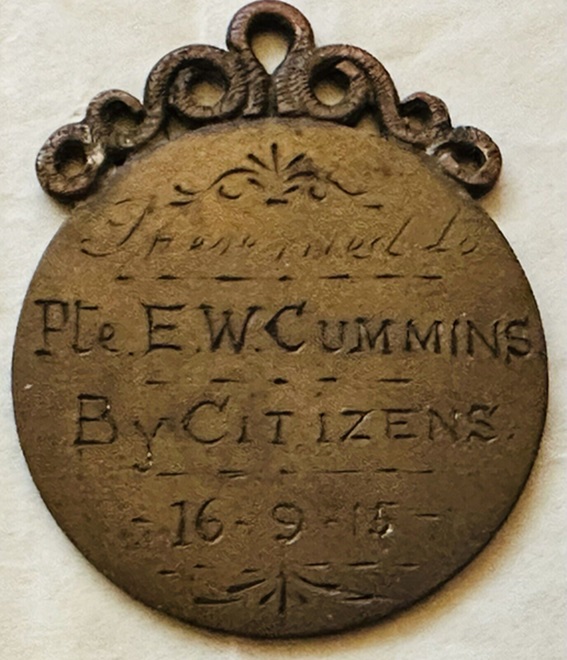
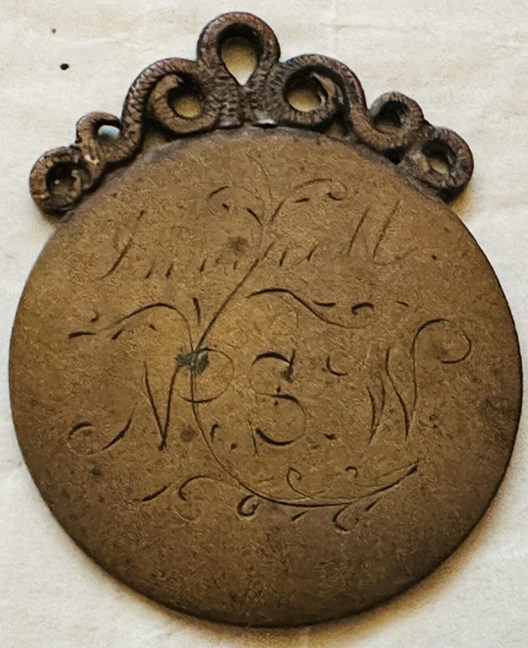
Inverell Recruitment Medal presented to Private: 1638 Ernest William CUMMINS. From the Citizens of Inverell.
The 33rd Battalion became a part of the 9th Brigade of the 3rd Australian Division. The Battalion en trained from Farley Station and embarked from Sydney on the 4th May 1916 bound for the United Kingdom aboard the HMAT A74 "Marathon".

HMAT A74 "Marathon"
Ernest CUMMINS was appointed Acting Sergeant on the 10th May 1916. The journey was long and convoluted involving stops at Albany, Fremantle (where they returned for restocking coal after being ordered to proceed to England via Durban, not straight to Egypt) It was whist at Durban, Cape Town, Ernest was charged with being AWL and was apprehended by Military Police on the 9th June 1916 with Private: 558 Alfred Norman TONKINSON - Private: 919 Claude FULMER - Private: 391 James Henry CUNDY - Private: 602 John Alfred RICHARDS - Private: 734 Harold John CHAPMAN and escorted to the Base Depot where they remained until embarking on board the Hospital Transport "MEDIC" for England on the 13th June 1916.
Ernest reverted to the rank of Private and proceeded overseas for France on the 9th September 1916 and was Taken on in Strength with the 53rd Battalion on the 26th October 1916. Ernest was Wounded in Action on the 4th December 1916 1st occasion for Shell Concussion and was treated by the Australian Field Ambulance before he was evacuated to the 36th Casualty Clearing Station for further treatment. The next day Ernest was taken by Ambulance Train to the 24th General Hospital as Etaples, France and after he was discharged he was invalided to England on board the Hospital Ship "Dover Castle"
In England he was admitted to the 1st Southern General Hospital with severe Shell Concussion where he was treated and discharged on leave before proceeding overseas again for France via Folkstone on the 9th May 1917. Ernest was Wounded in Action: 2nd occasion at Barleux near Peronne, France on the 2nd September 1918. and was again returned to England. He returned to Australia on the 23rd June 1919.
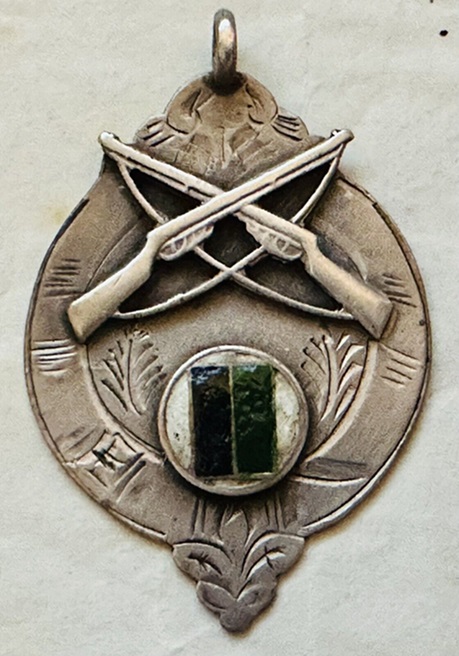
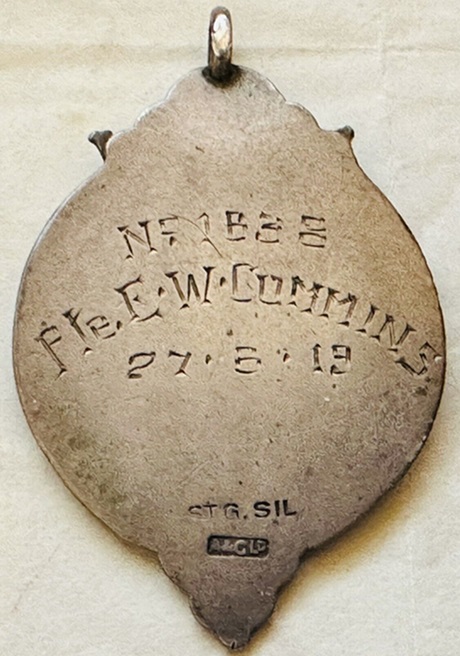
Silver Fob presented to Private: 1638 Ernest William CUMMINS. 53rd Battalion AIF 27th June 1919.
Private: 520194 Ernest William CUMMINS enlisted on the 7th March 1939 with the 55/53 Infantry Battalion, D Company 13th Platoon. CMF. He was allocated to perform Security Duties until he enlisted with the AIF on the 1st August 1940 as Corporal:NX12869 Ernest William CUMMINS and served with the 2/1 Railway Construction Company (Middle East and Australia) He embarked for the Middle East on the 22nd September 1940 as a Graded Group III Plate Layer, and later a Group II Rigger and then to a Group I Fitter. Ernest returned to Australia suffering from Malaria on the 30th October 1942.
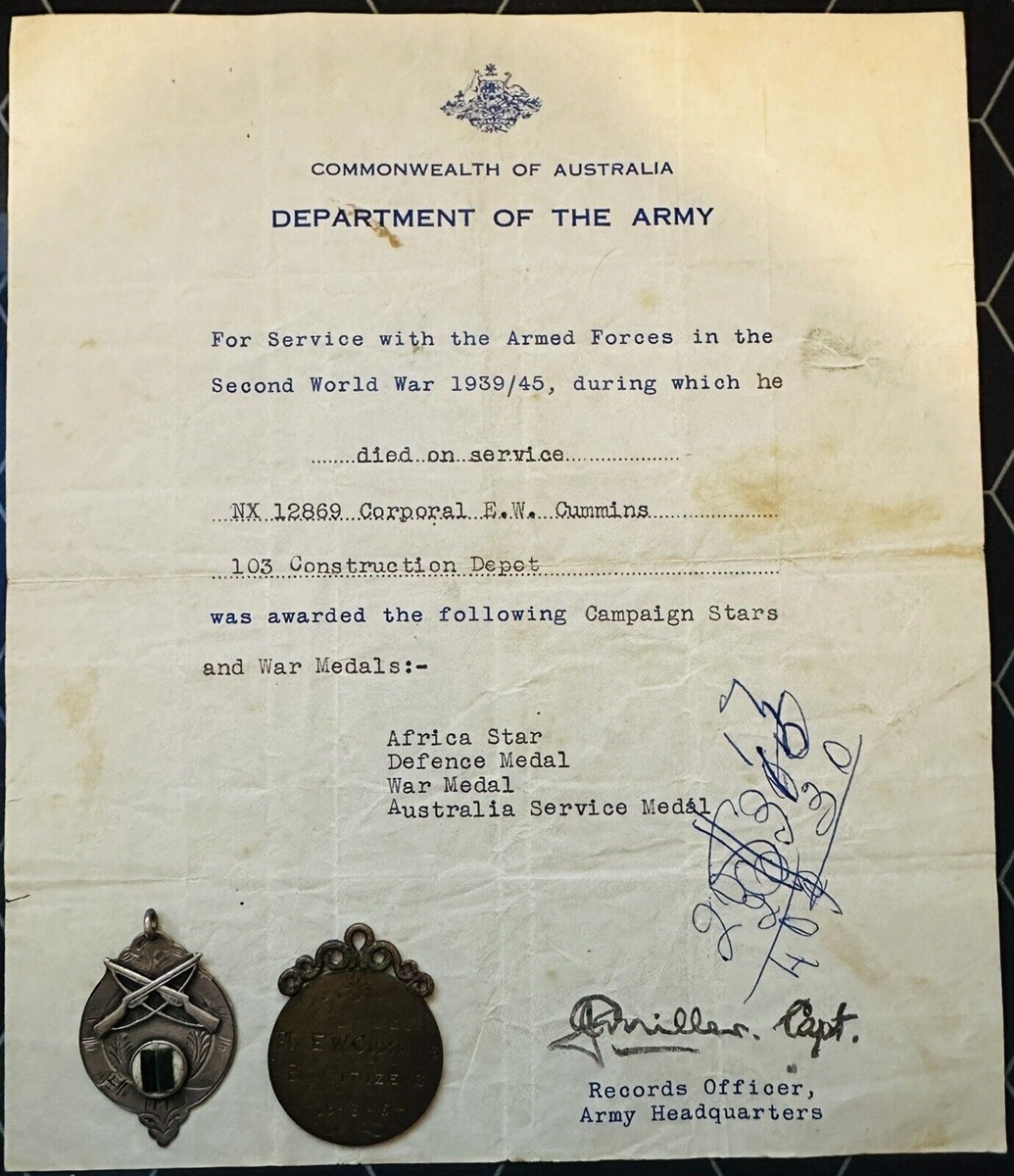
Ernest was Injured with a Fractured Skull on the 5th November 1943 whist he was in a Military Truck after being struck in the face and falling backwards out of the truck and struck his head on the roadway. He was rushed to Hospital and placed on the Dangerously I'll List but died from his injuries on the 9th November 1943 in Newcastle from injuries inflicted on him by Corporal Theophilus George Toshack AMF.
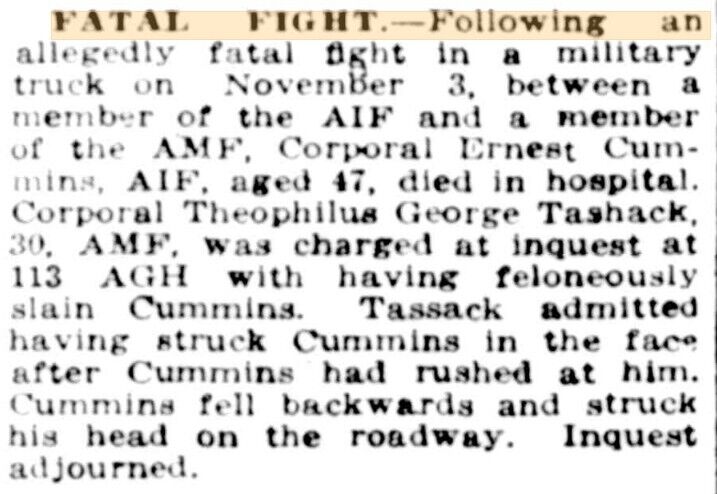
Cumberland Argus and Fruitgrowers Advocate (Parramatta, NSW : 1888 - 1950), Thursday 15 April 1937, page 1
MANSLAUGHTER CHARGE. On a charge of manslaughter, Theophilus George Toshack (22) was remanded at the Parramatta Police Court on Monday until April 19, on $50 bail. the charges against Toshack was of having at Parramatta on March 12 feloniously slain John Reynolds. Constable Stafford (police prosecutor) said that a coronial inquiry would be held at Liverpool on Saturday. Mr. John Hall appeared for Toshank.
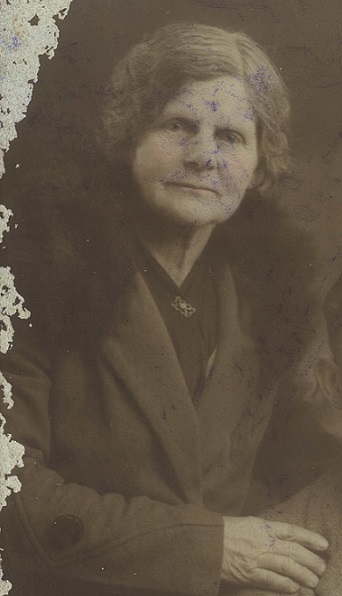
Maude Margaret Toshack nee: Kiernan. (1874-1957)
Apparently "Billy" married Olive Maud Roberts.
"Billy" was born from one of Maude's extra marital affairs as his name does not appear on Maude's divorce petition. It is known that his biological father was a Victorian Army Officer (Capt. George Sanderson) who supported his son until he was some 18 years old before he was charged with Manslaughter at 22 and again aged 30 after being charged with feloniously slaying Corporal CUMMINS.
Ernest's British War Medal:45793 and Victory Medal:44727 to PTE 1638 E. W. CUMMINS 53RD BN A.I.F. and 1939-45 Africa Star, Defence Medal, War Medal & Australian Service Medal were acquired in January 2024 and are now in the Harrower Collection.
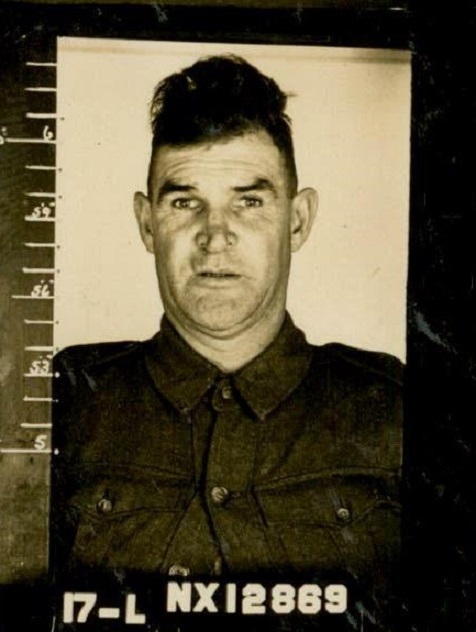
Ernest William CUMMINS (1896-1943)
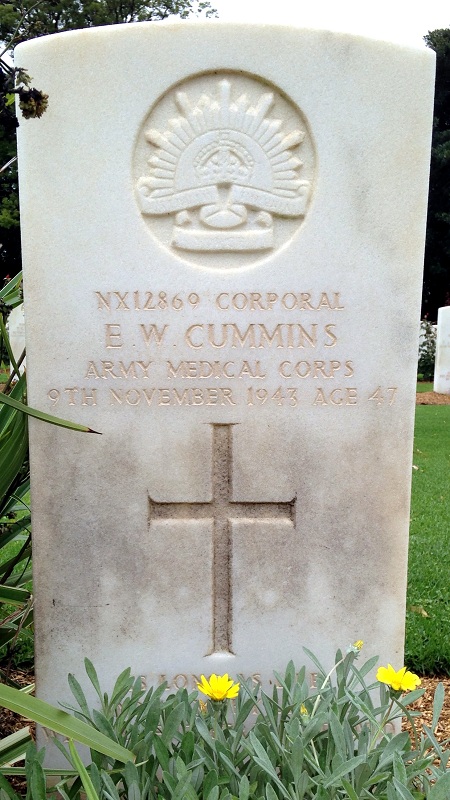
Grave of Corporal NX12869 Ernest William CUMMINS. Rookwood War Cemetery, N D 3, Sydney New South Wales, Australia
Military Records
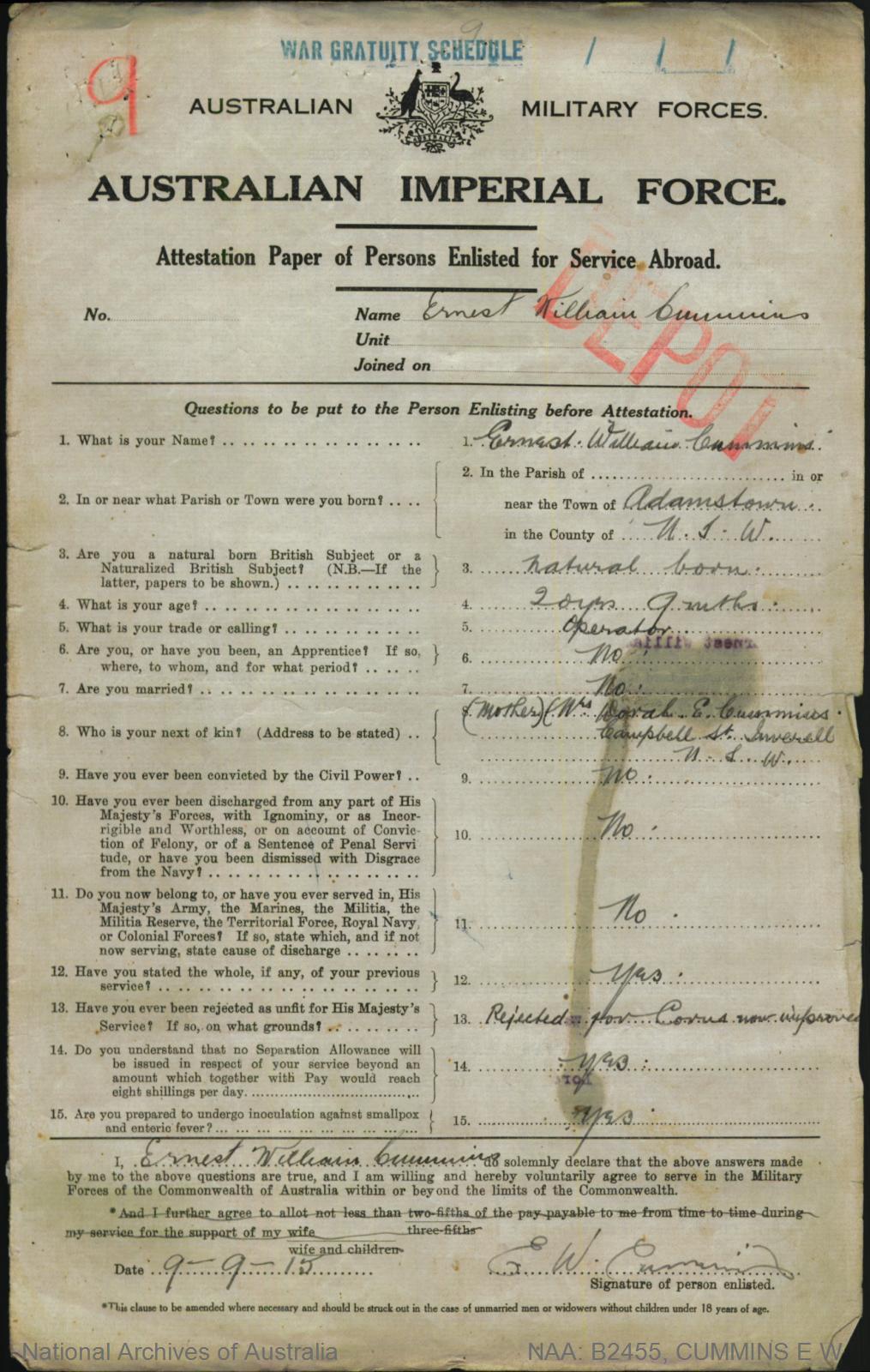
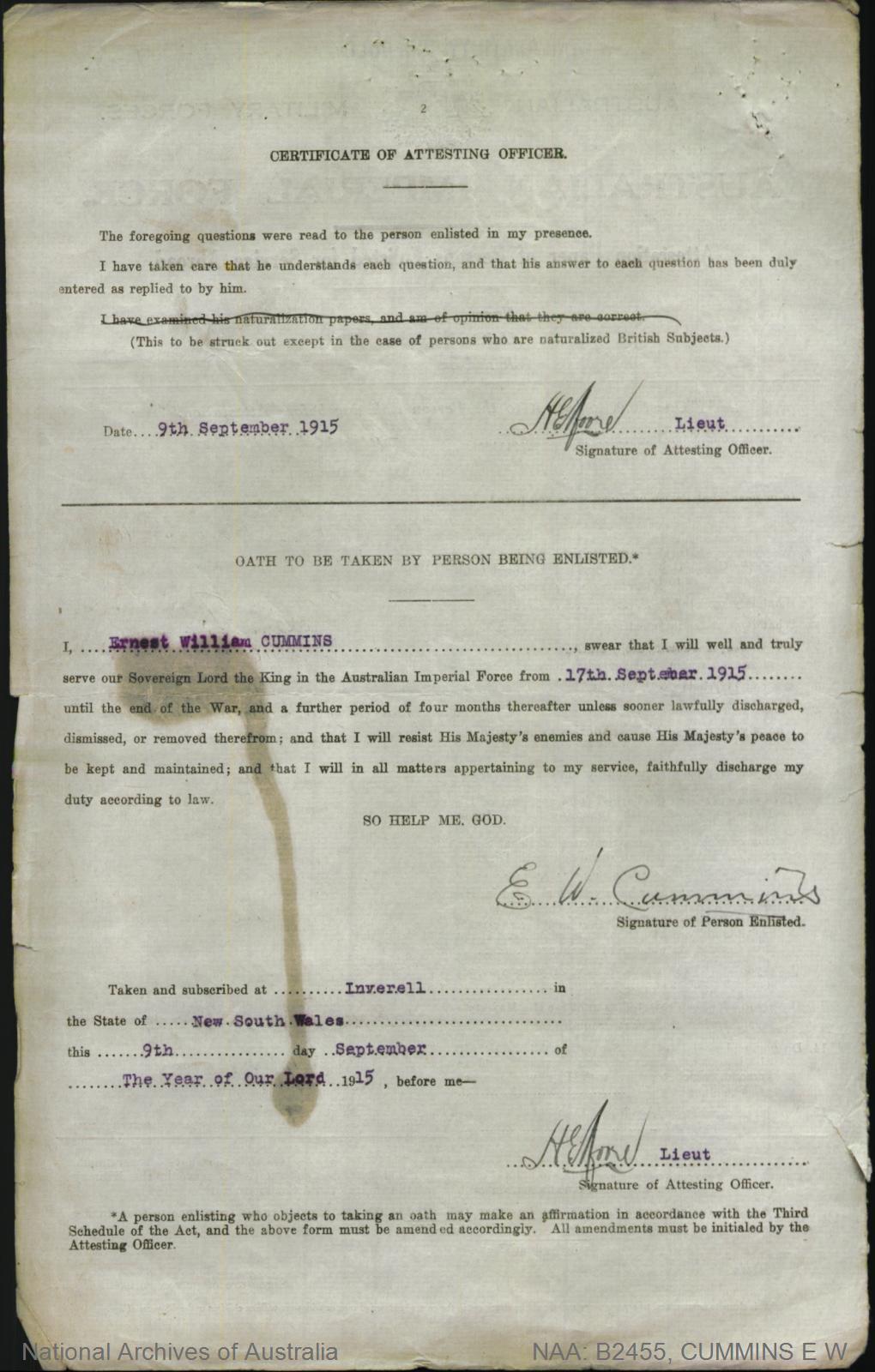
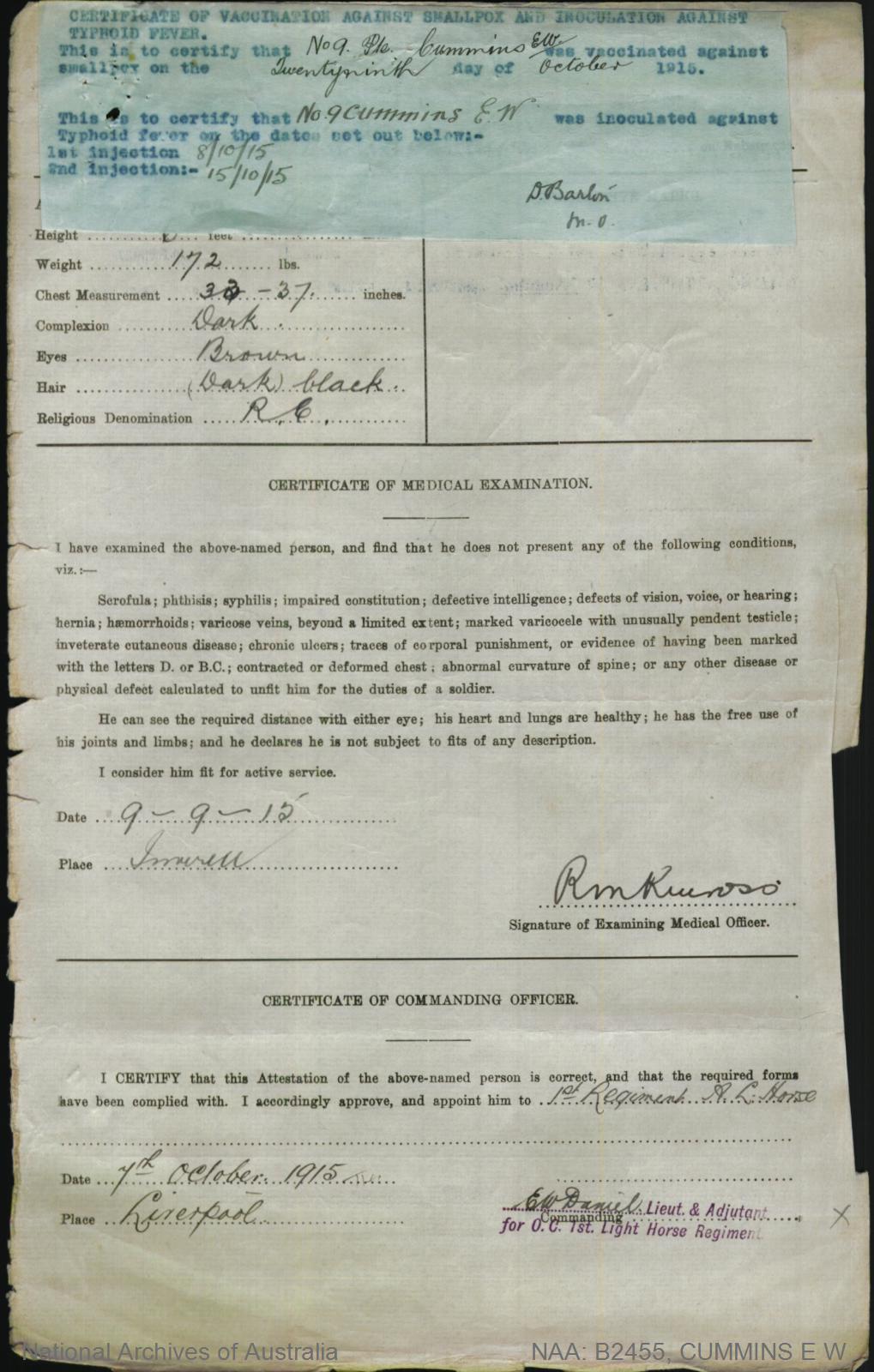
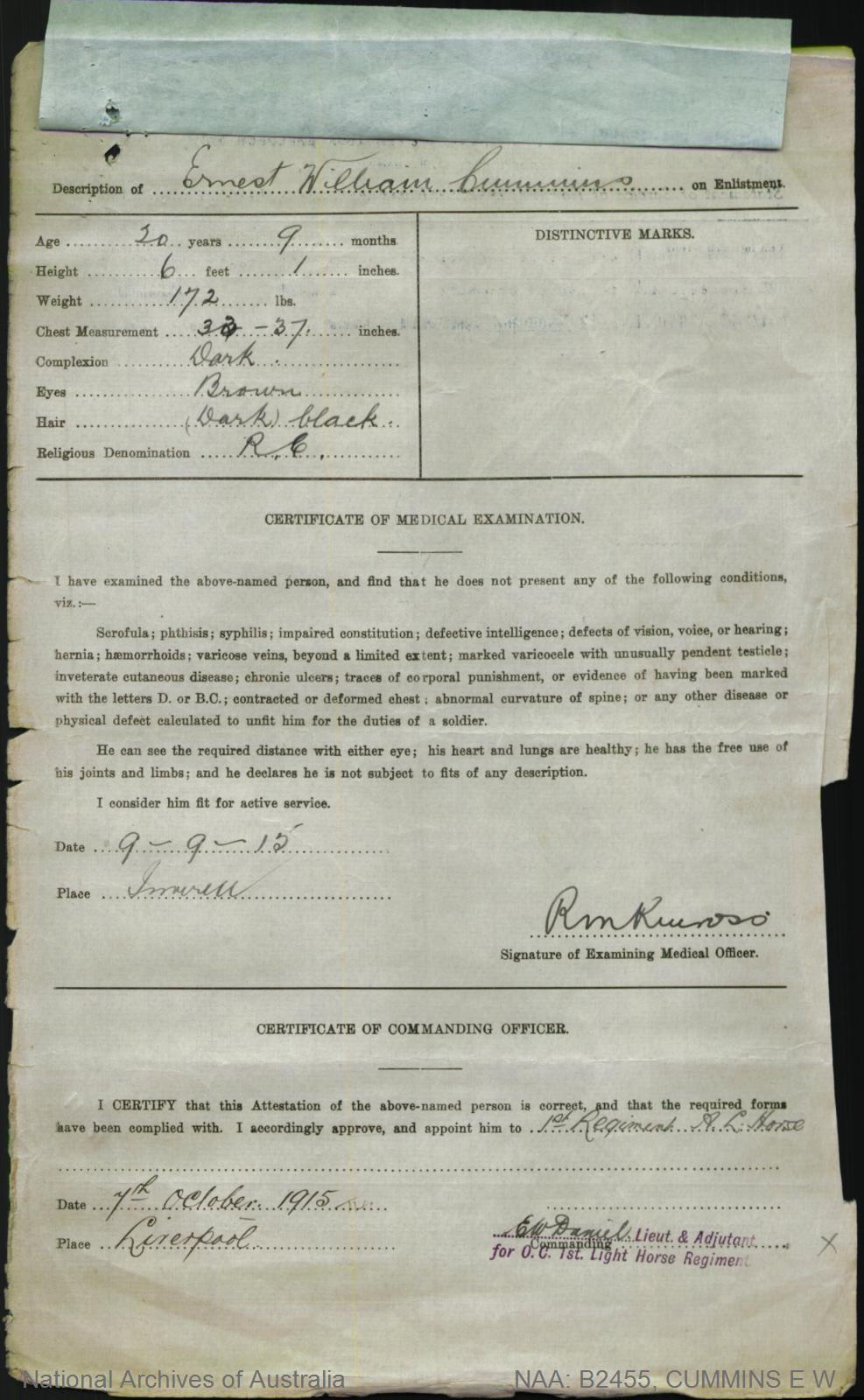
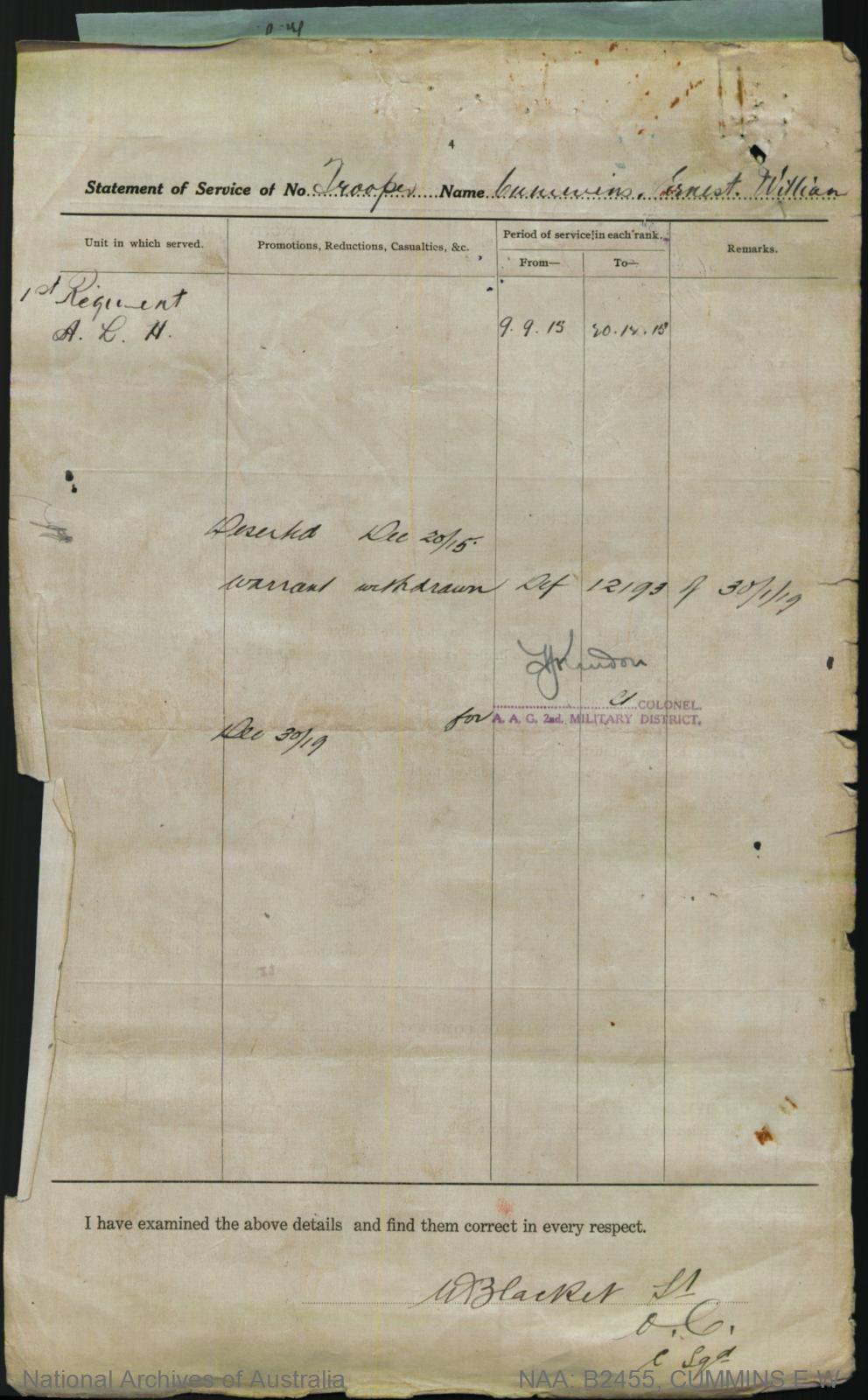
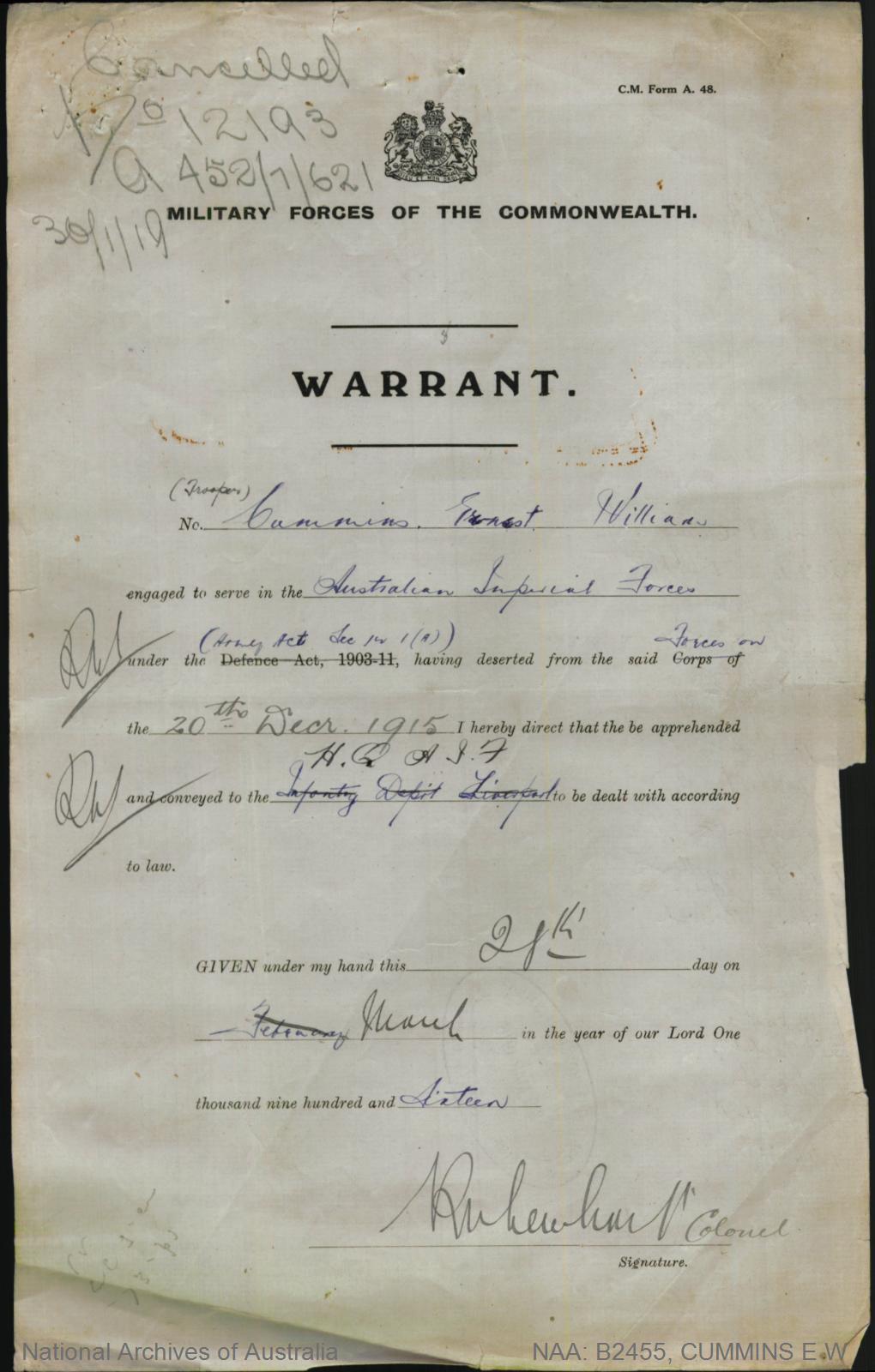
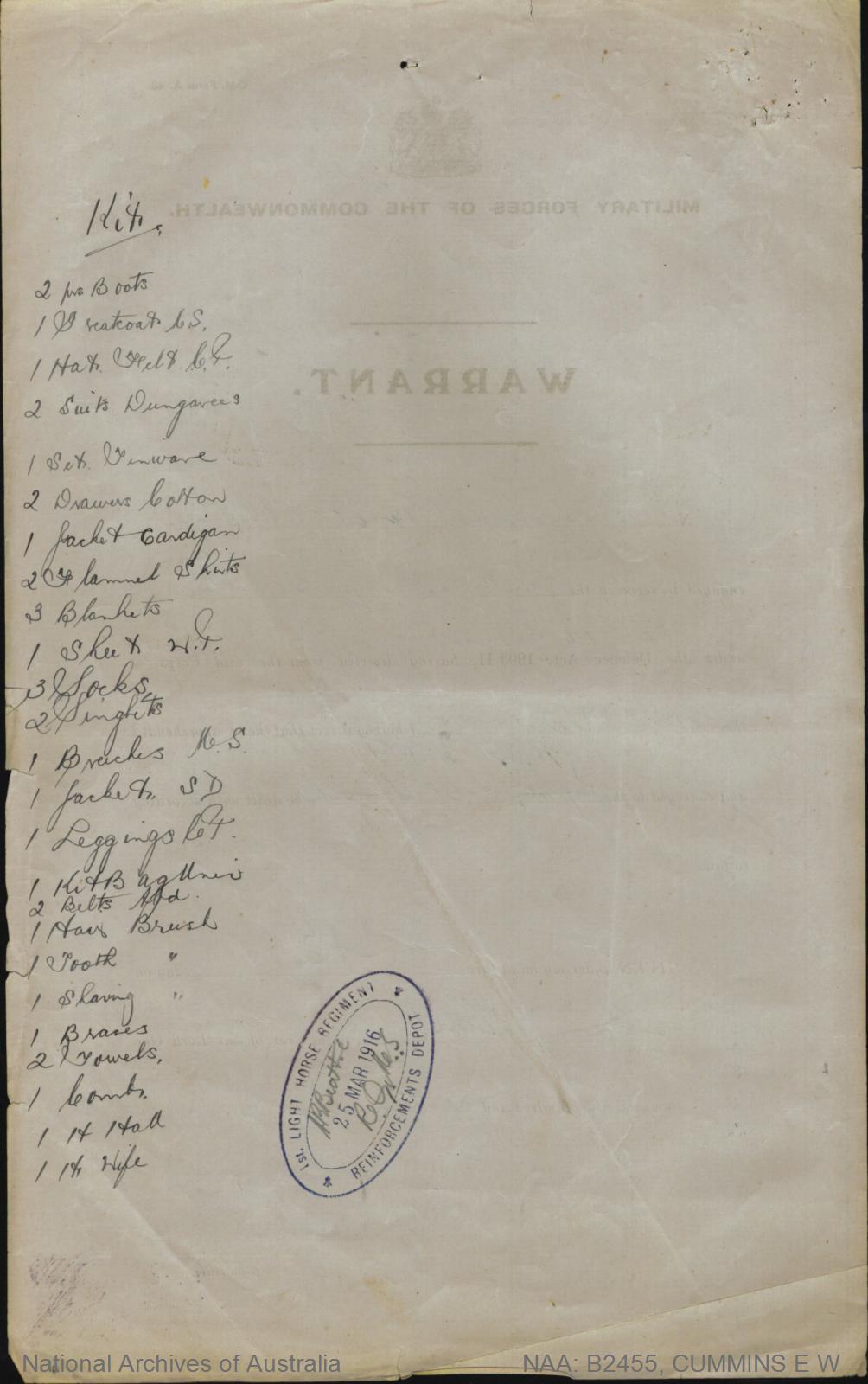
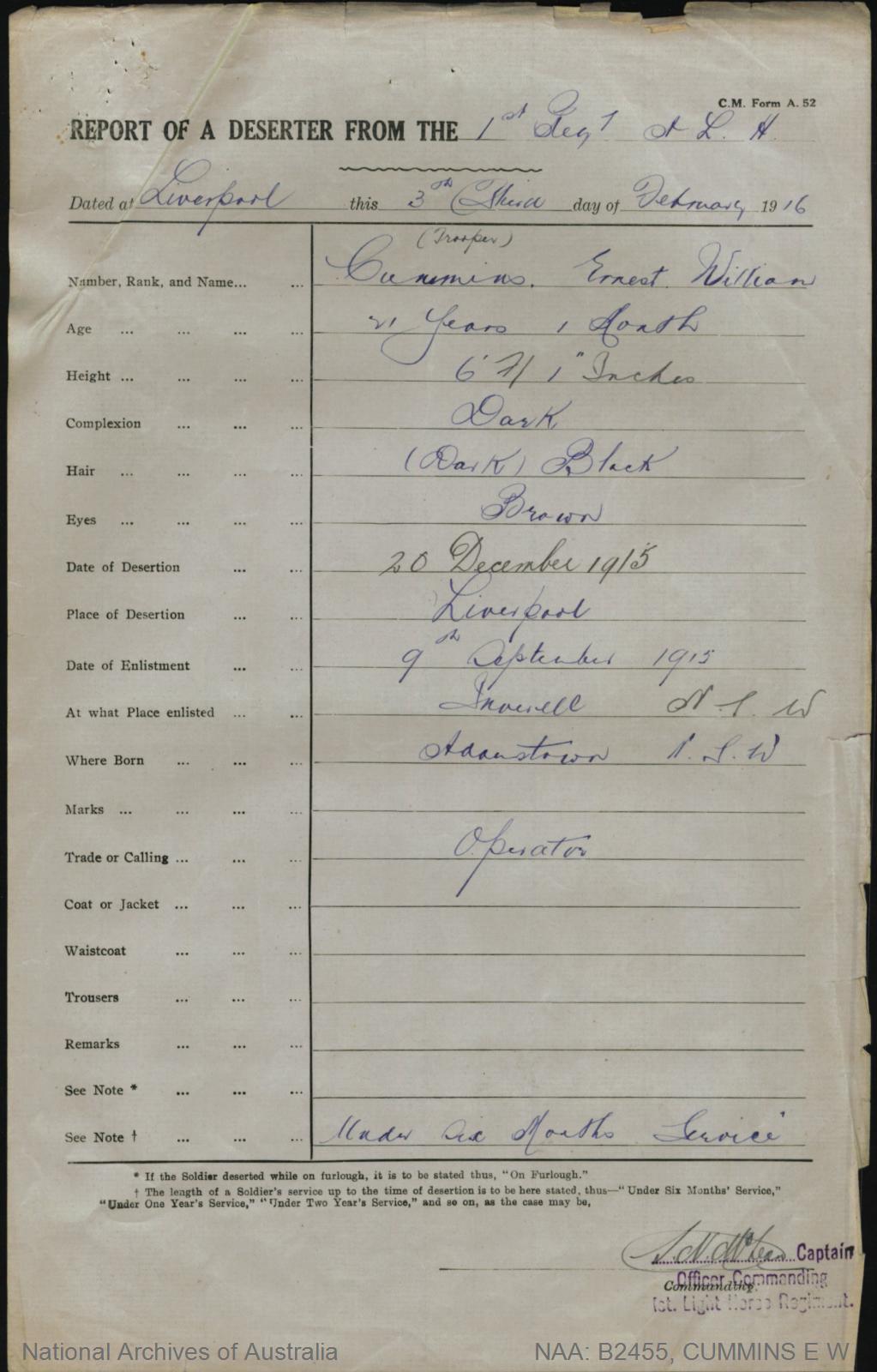
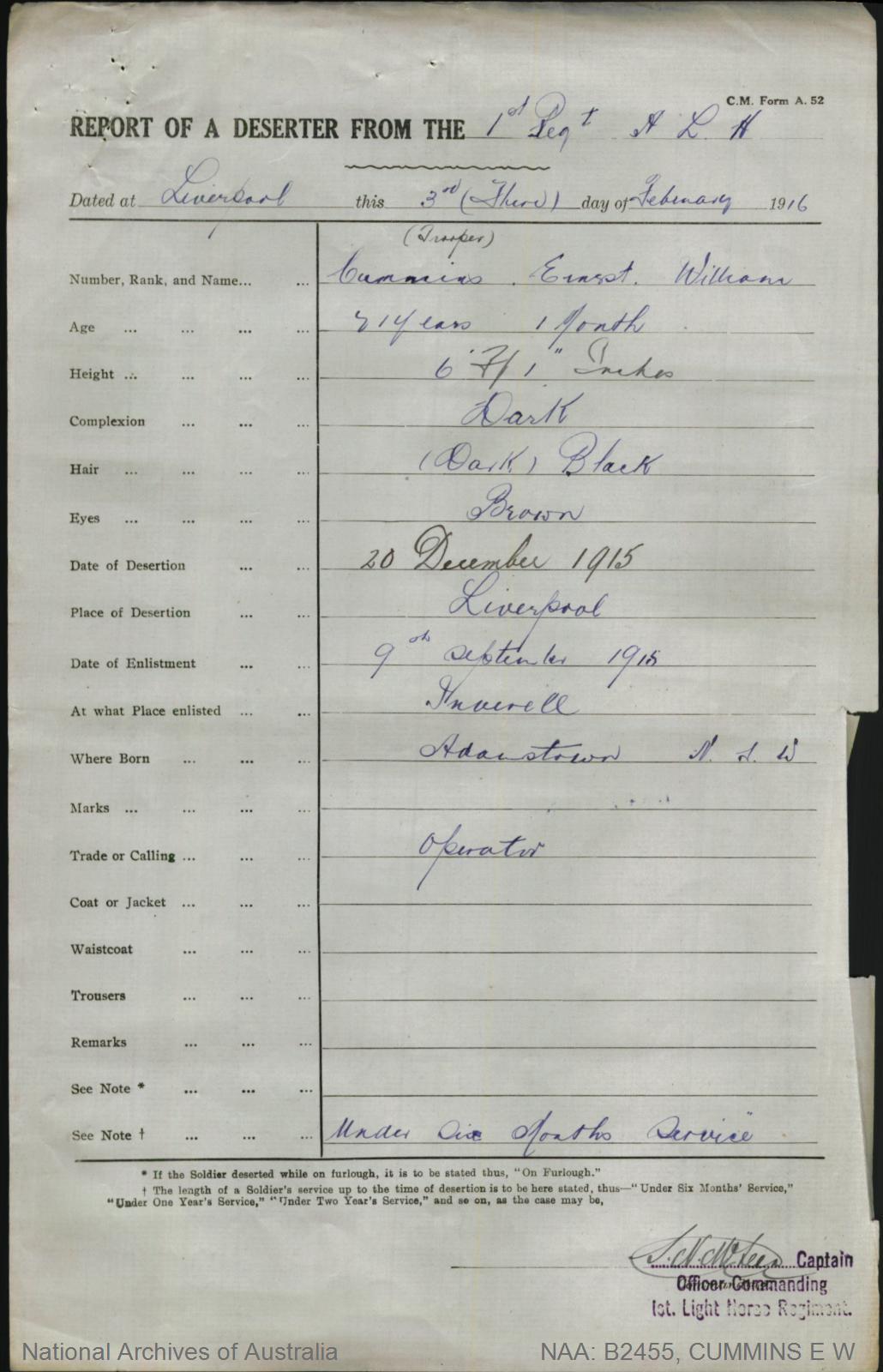
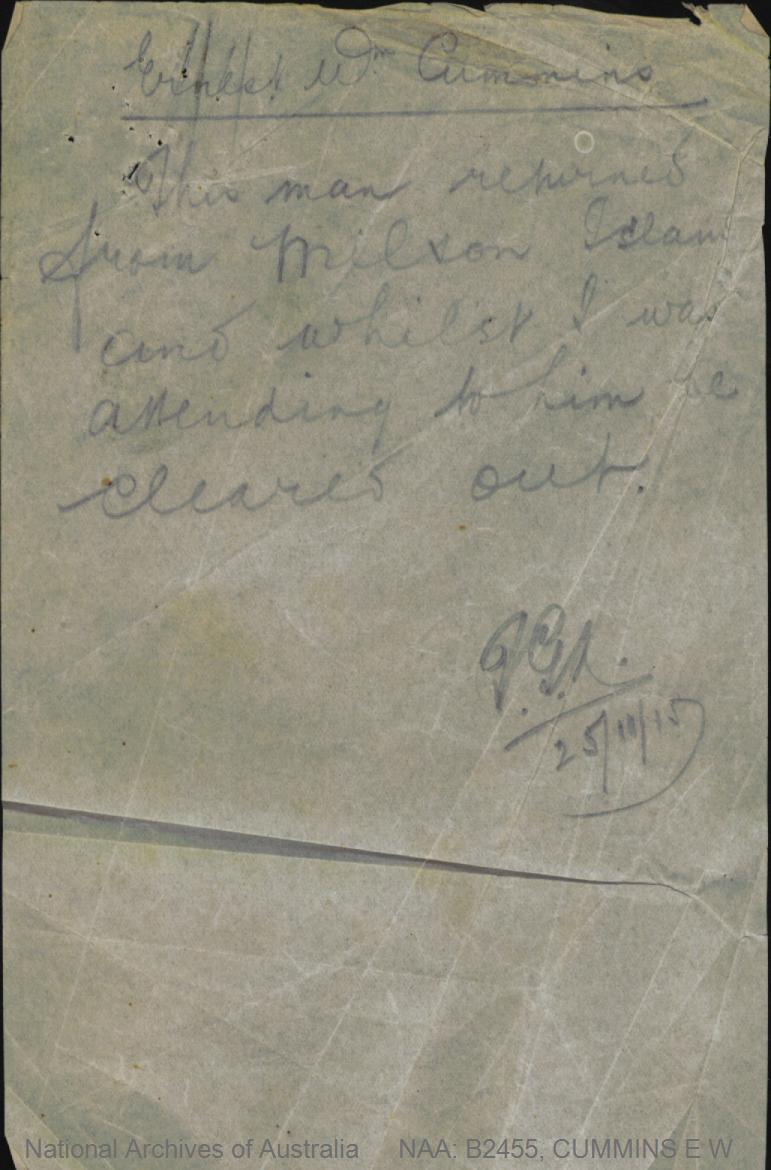
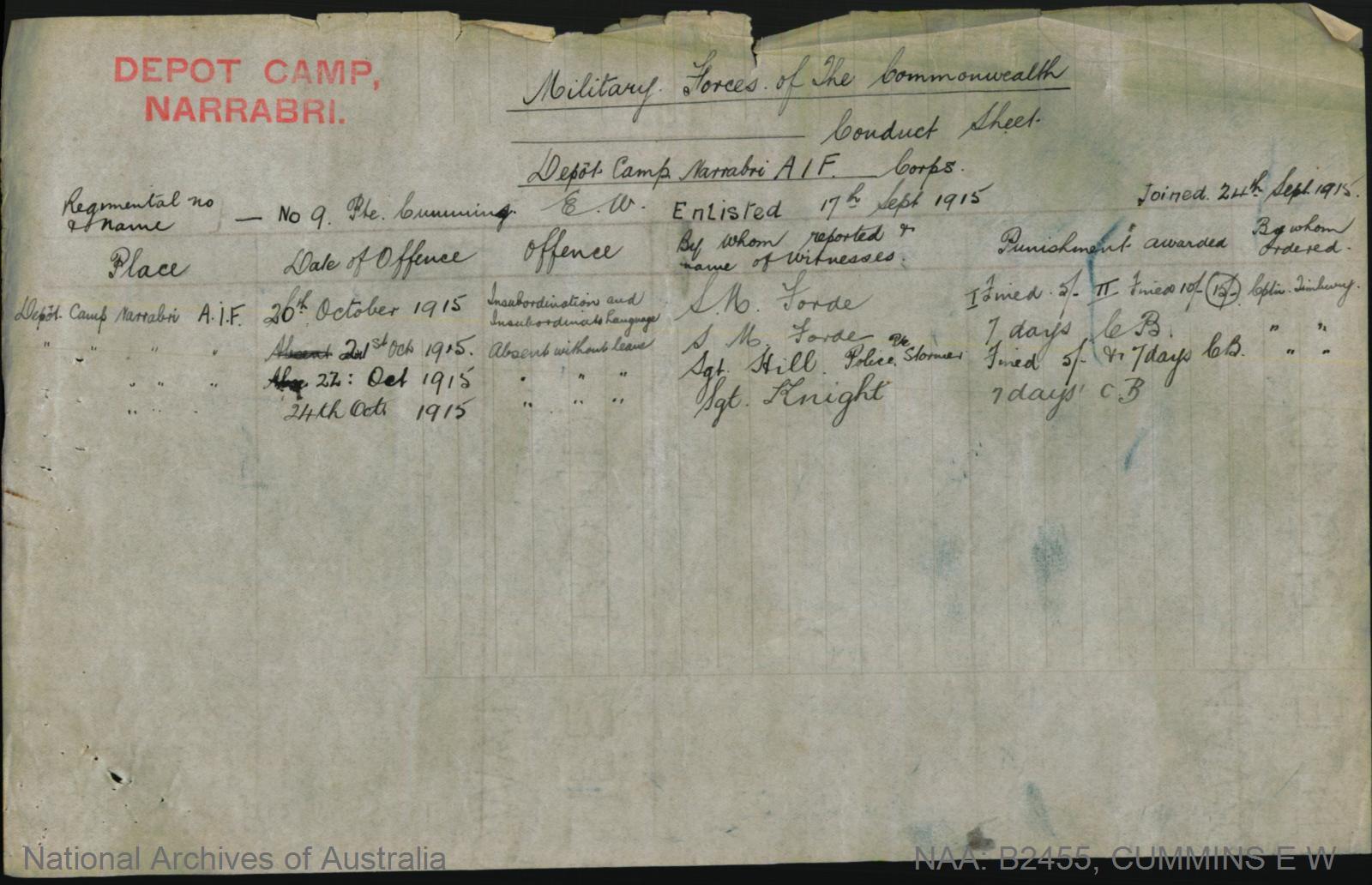
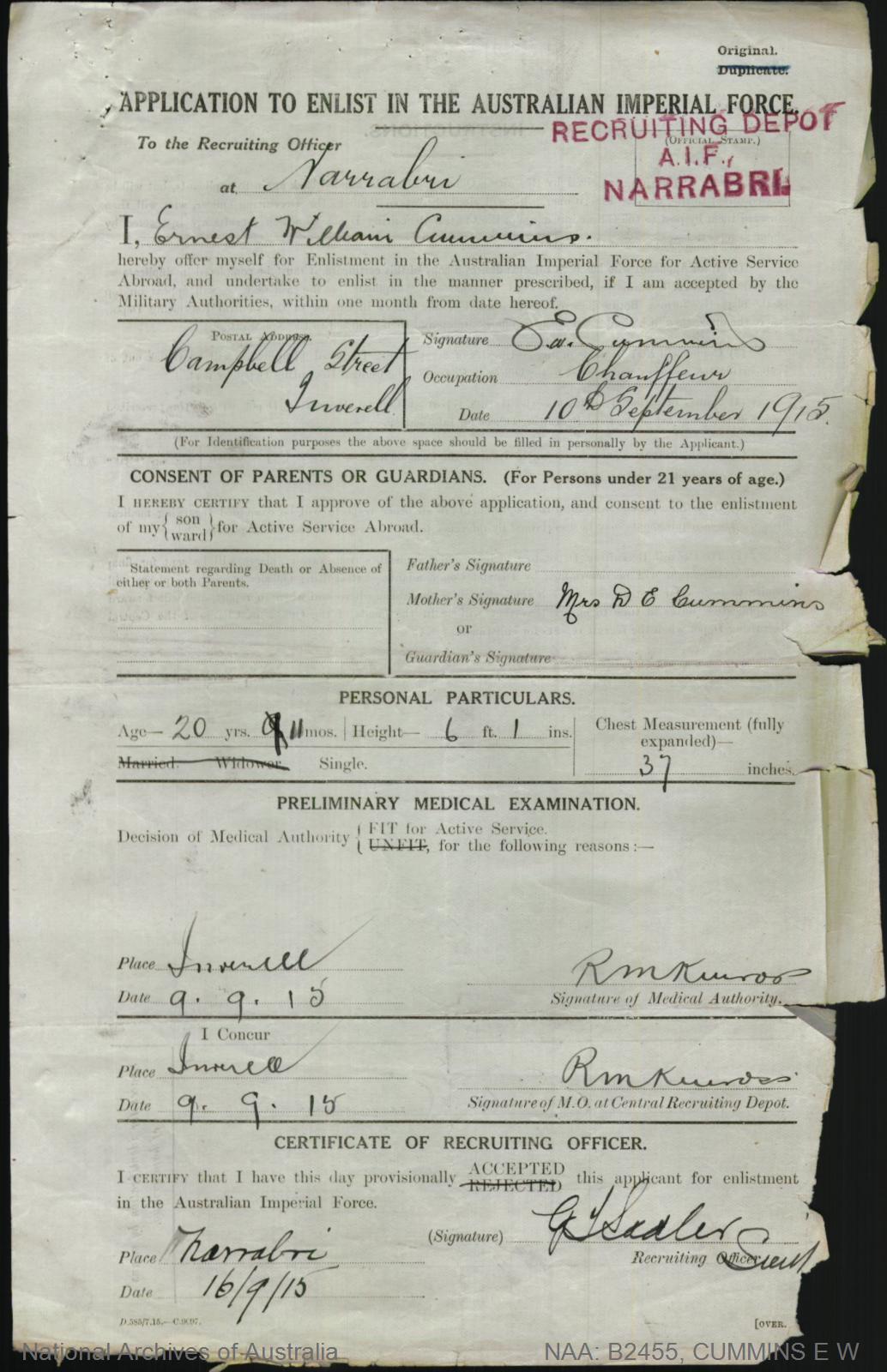
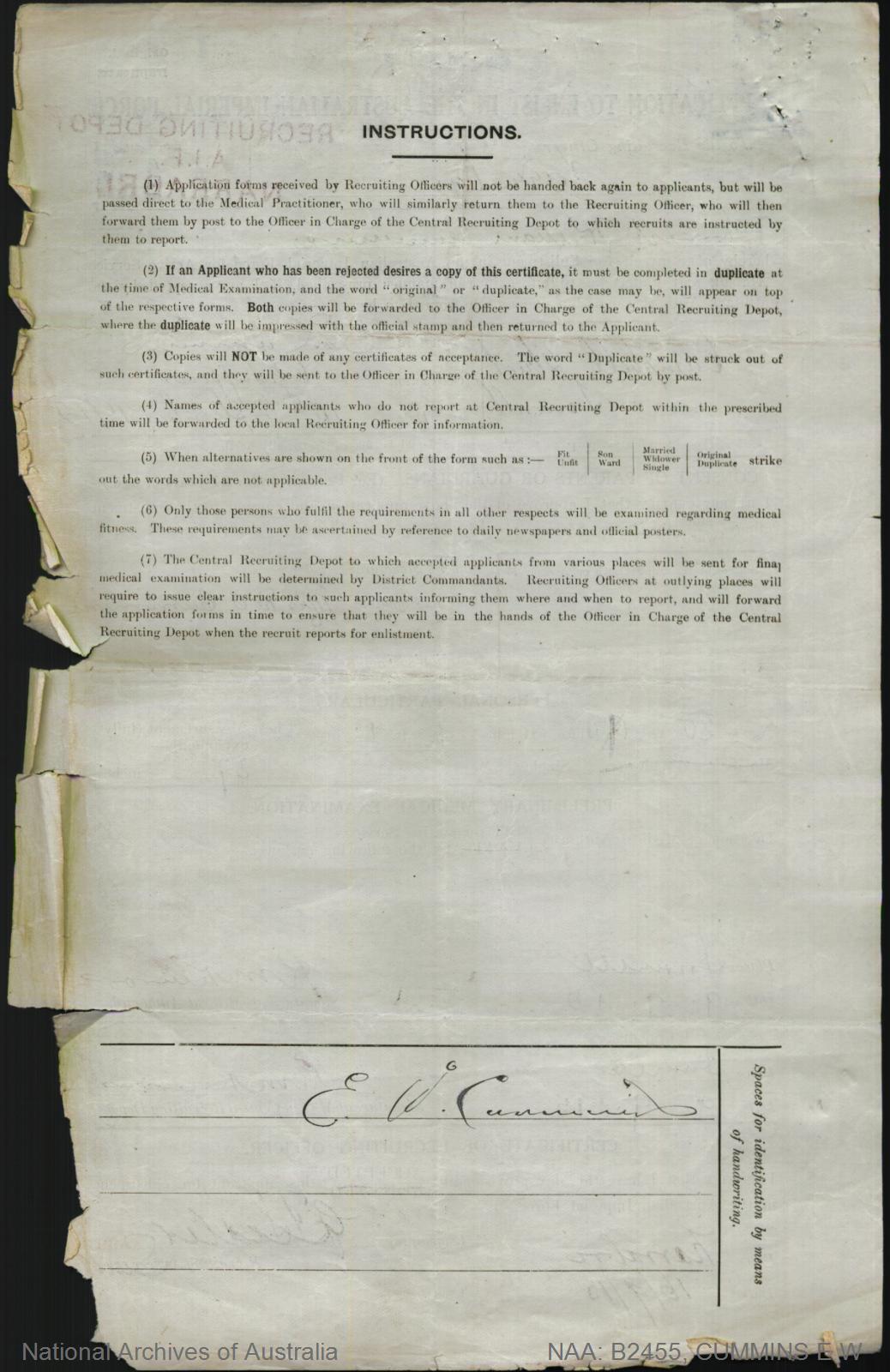

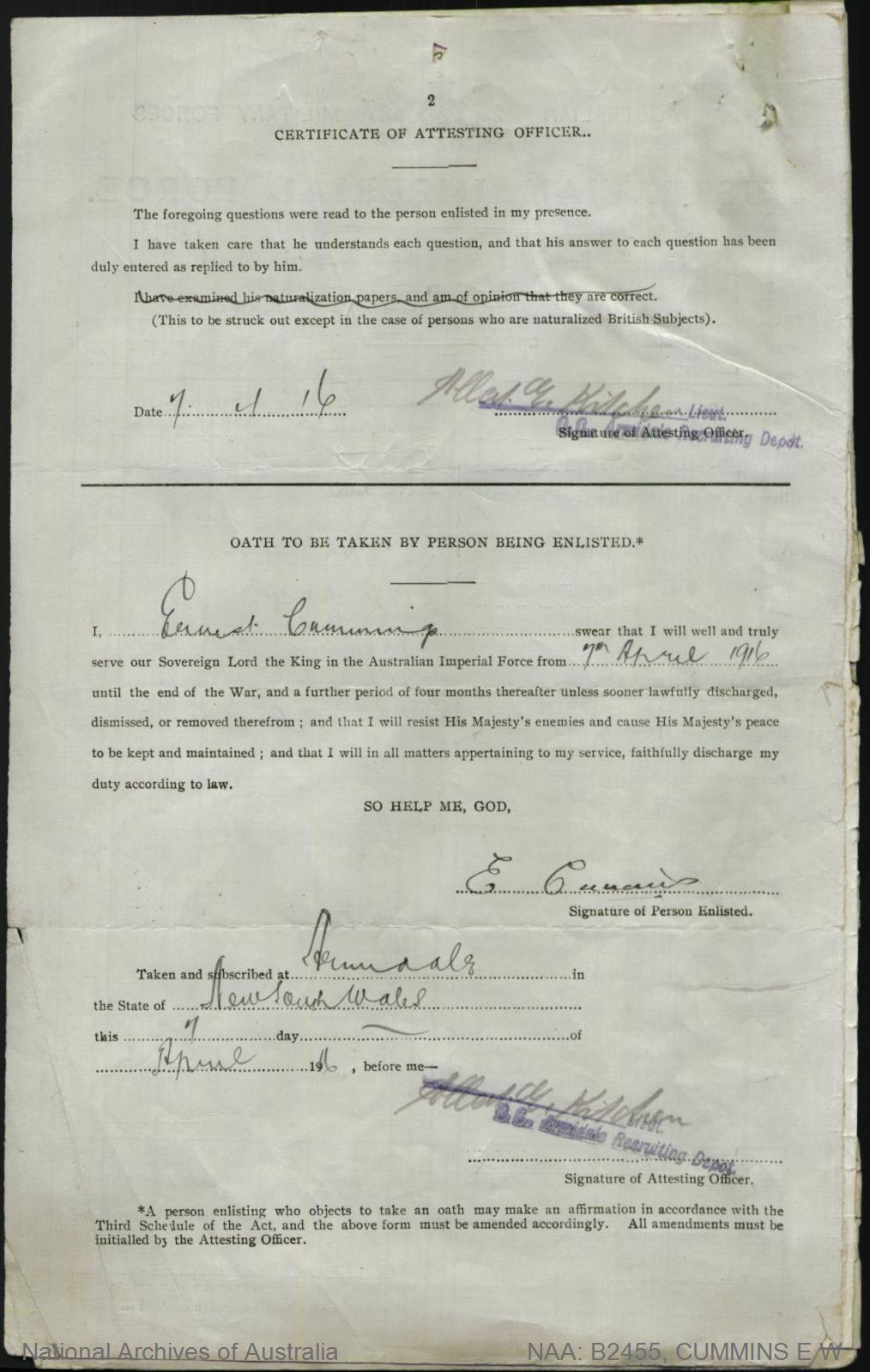
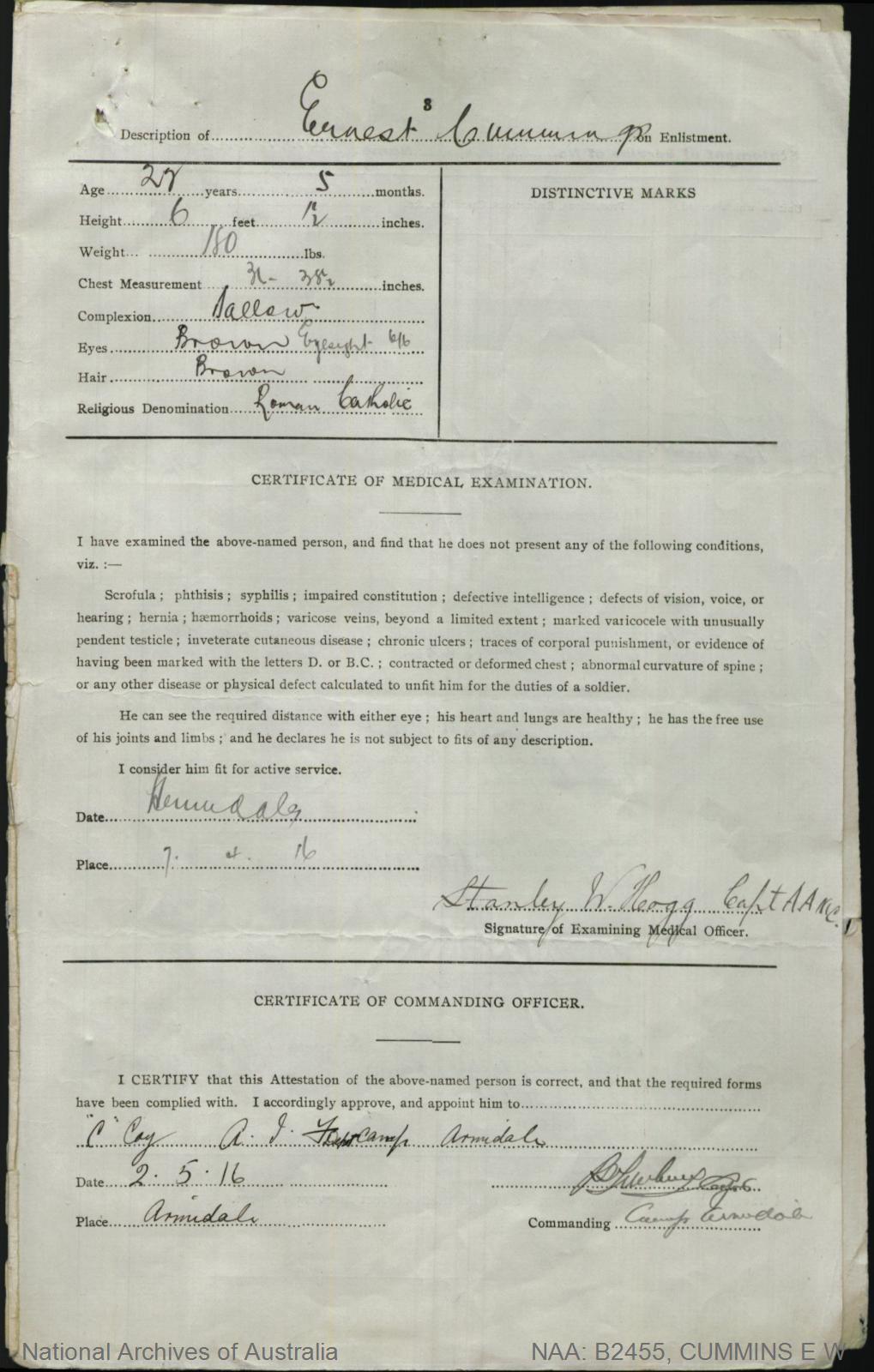
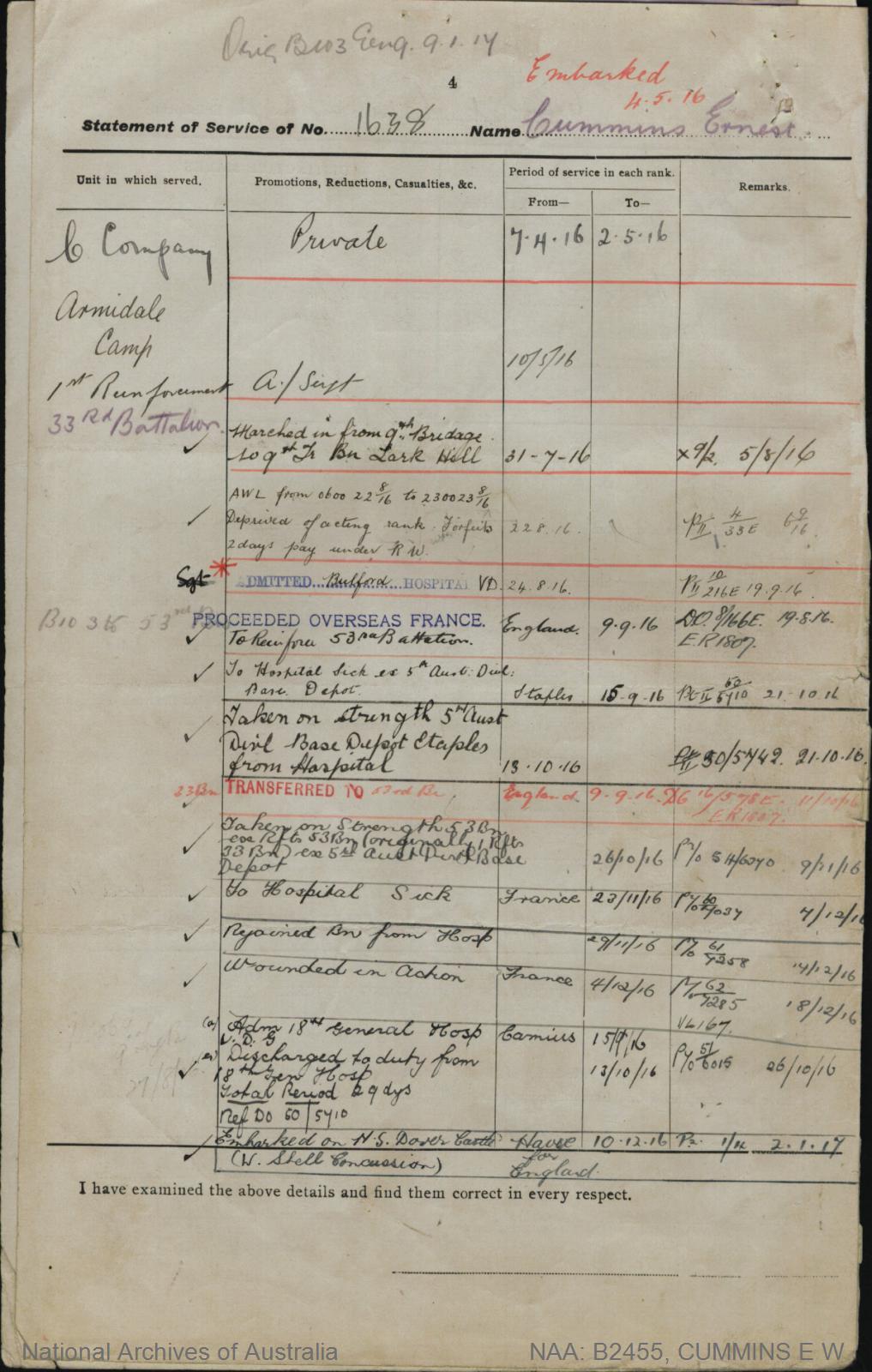
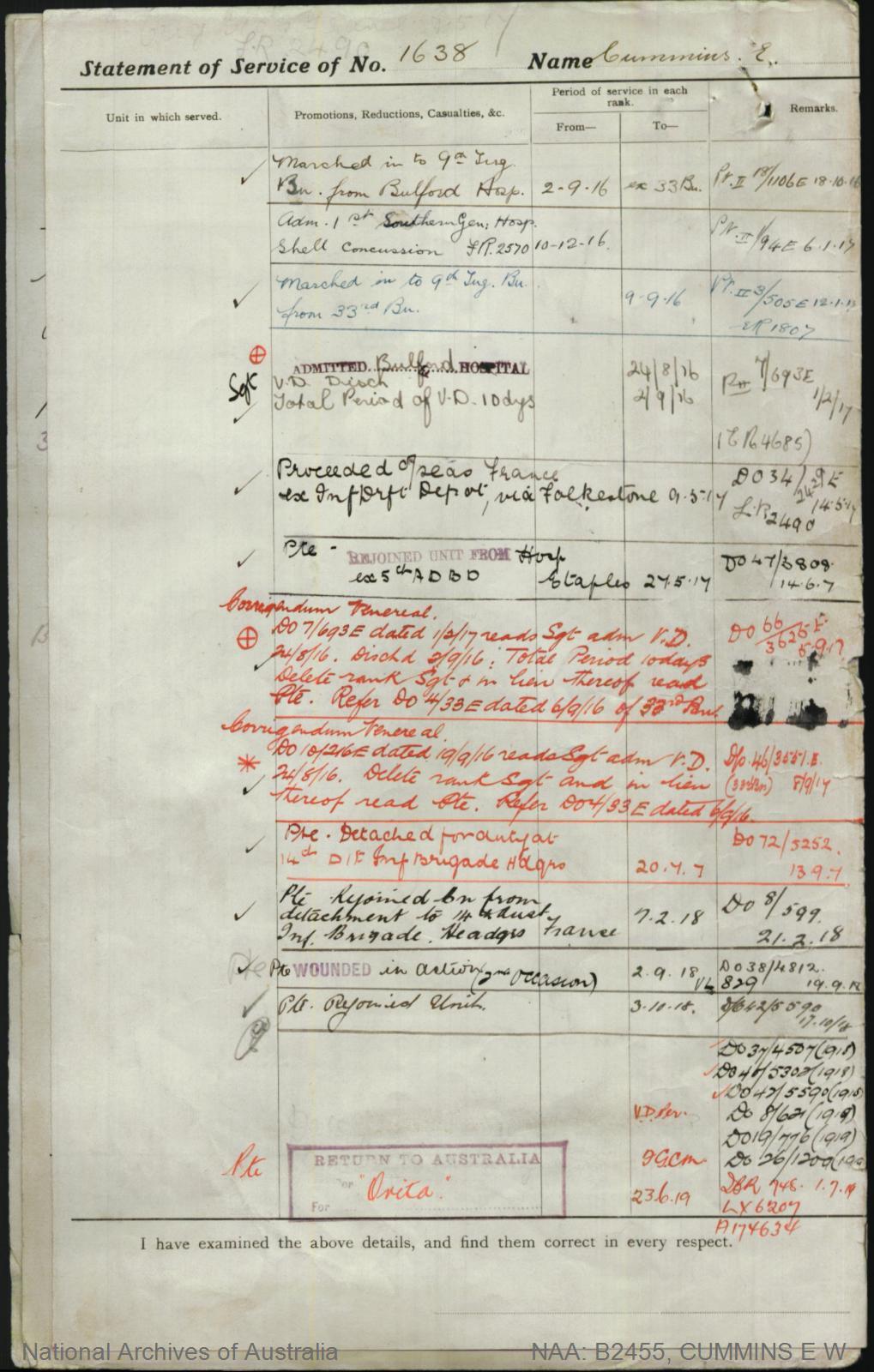
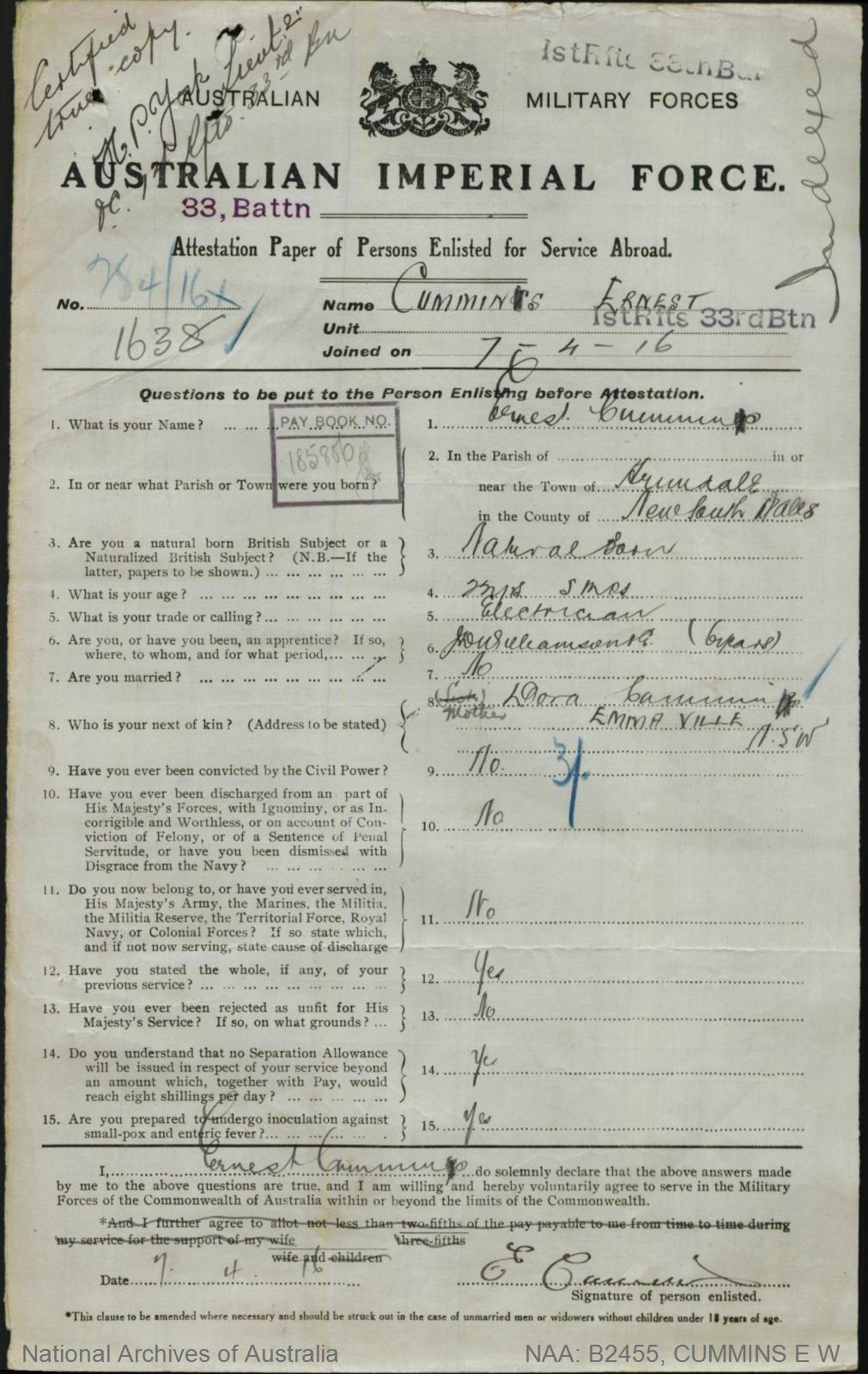
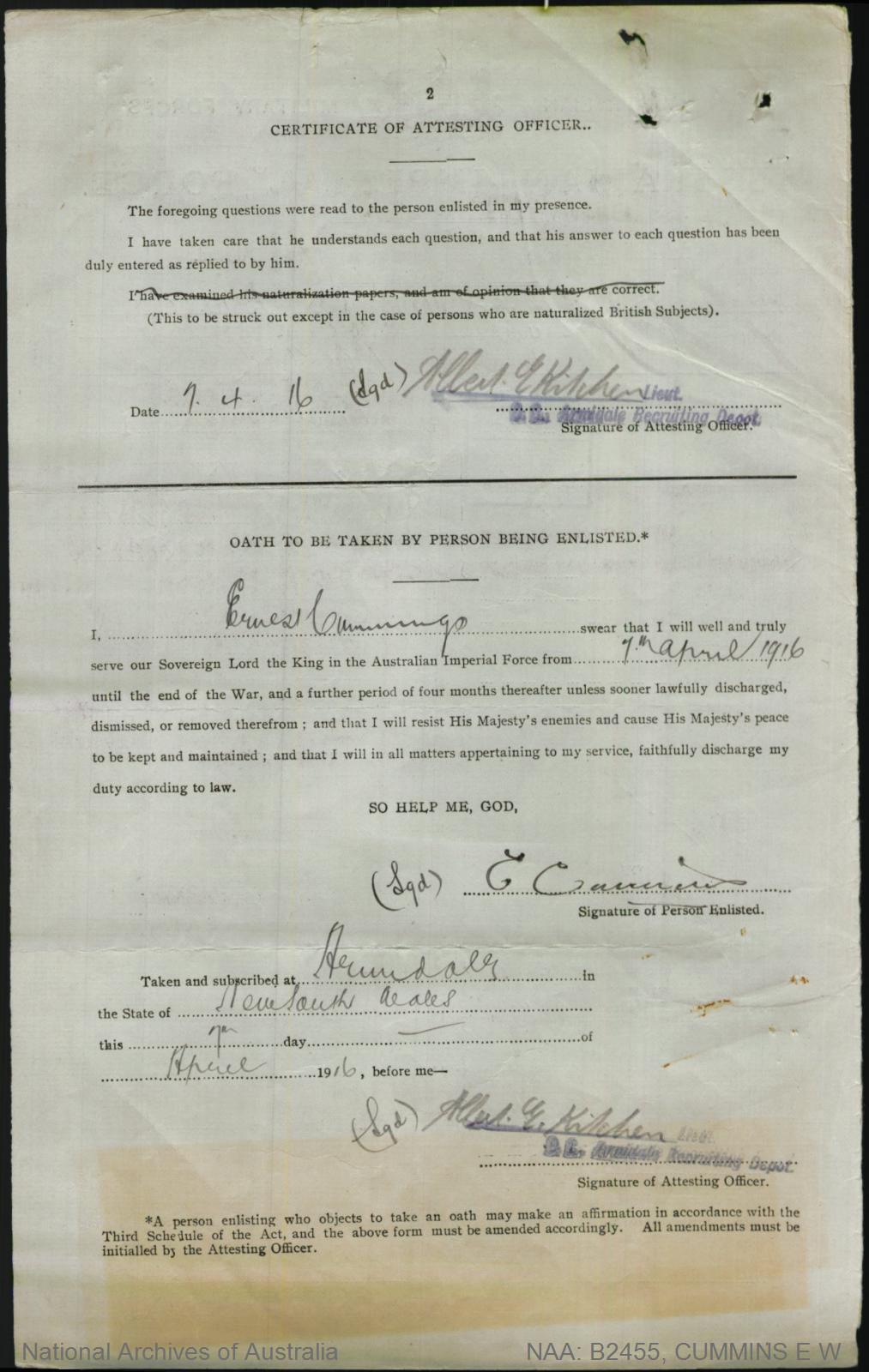
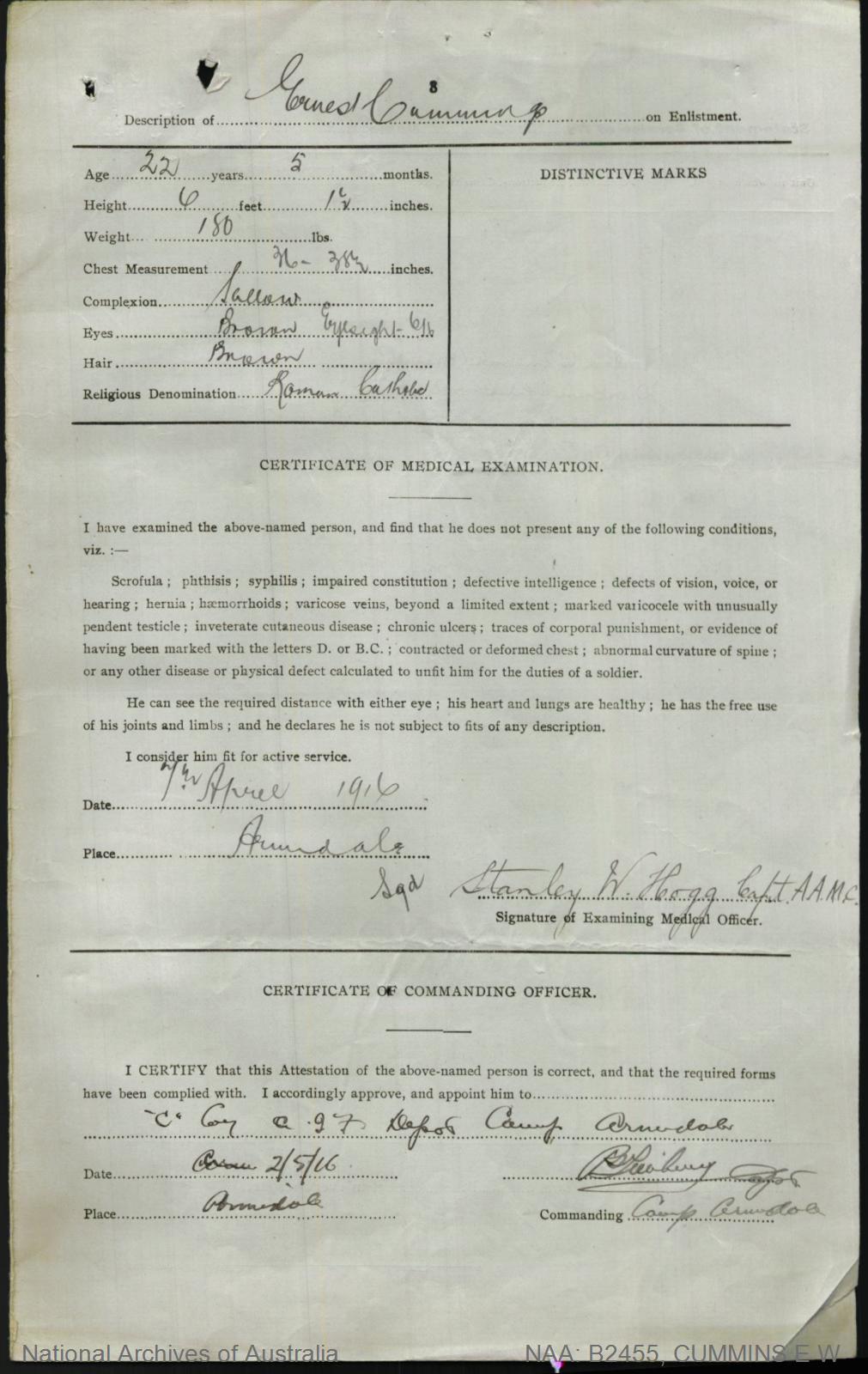
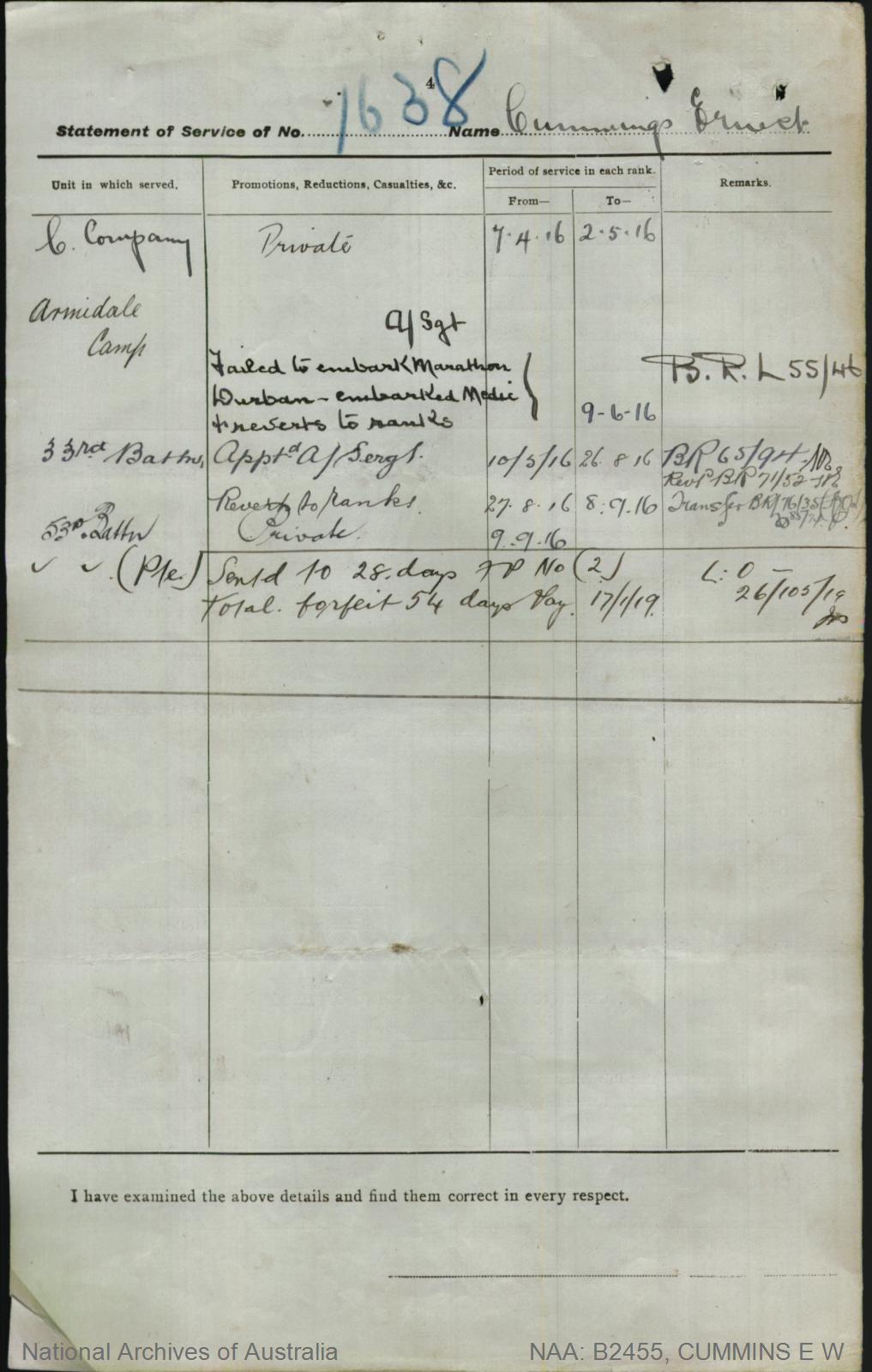
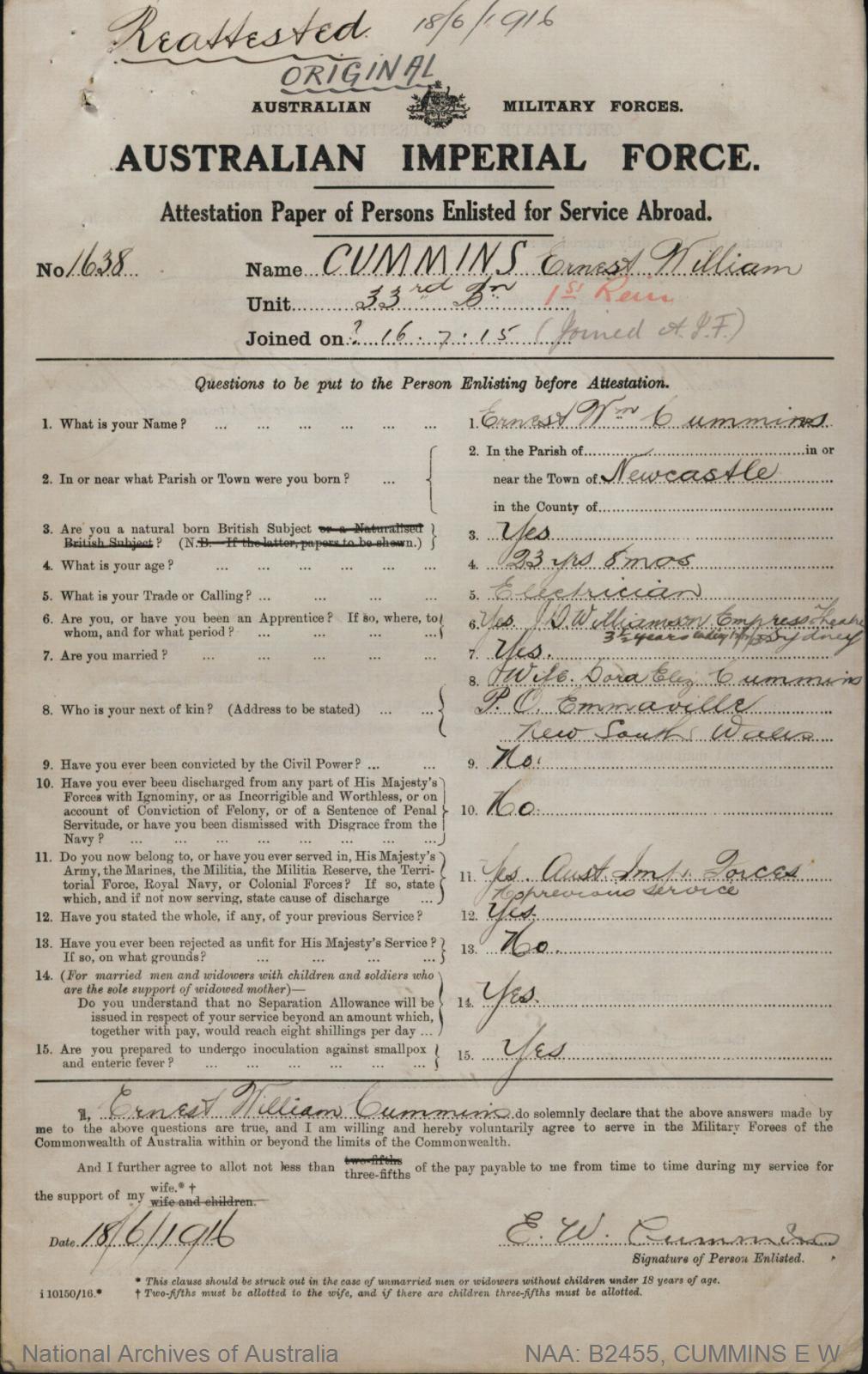
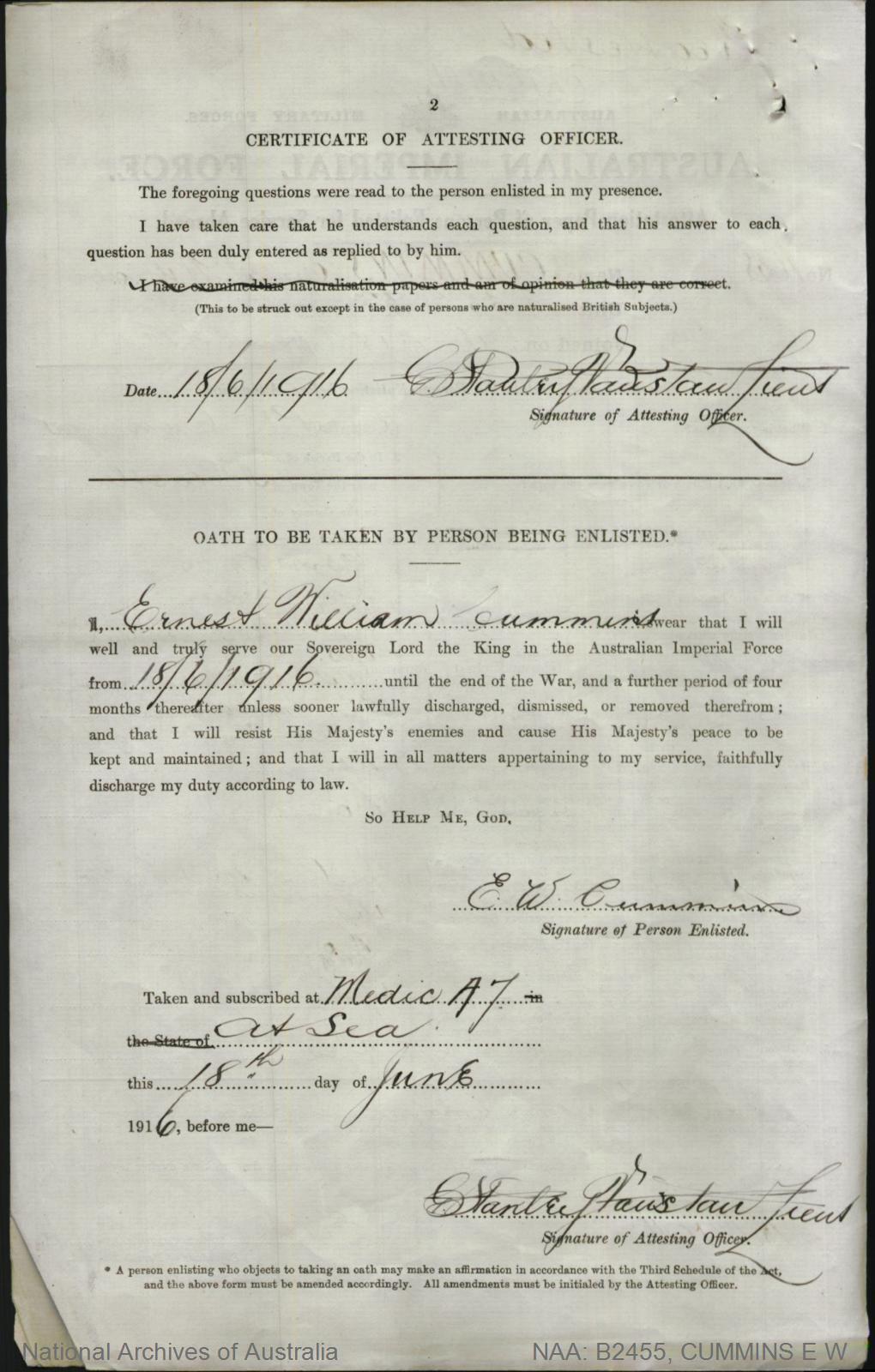
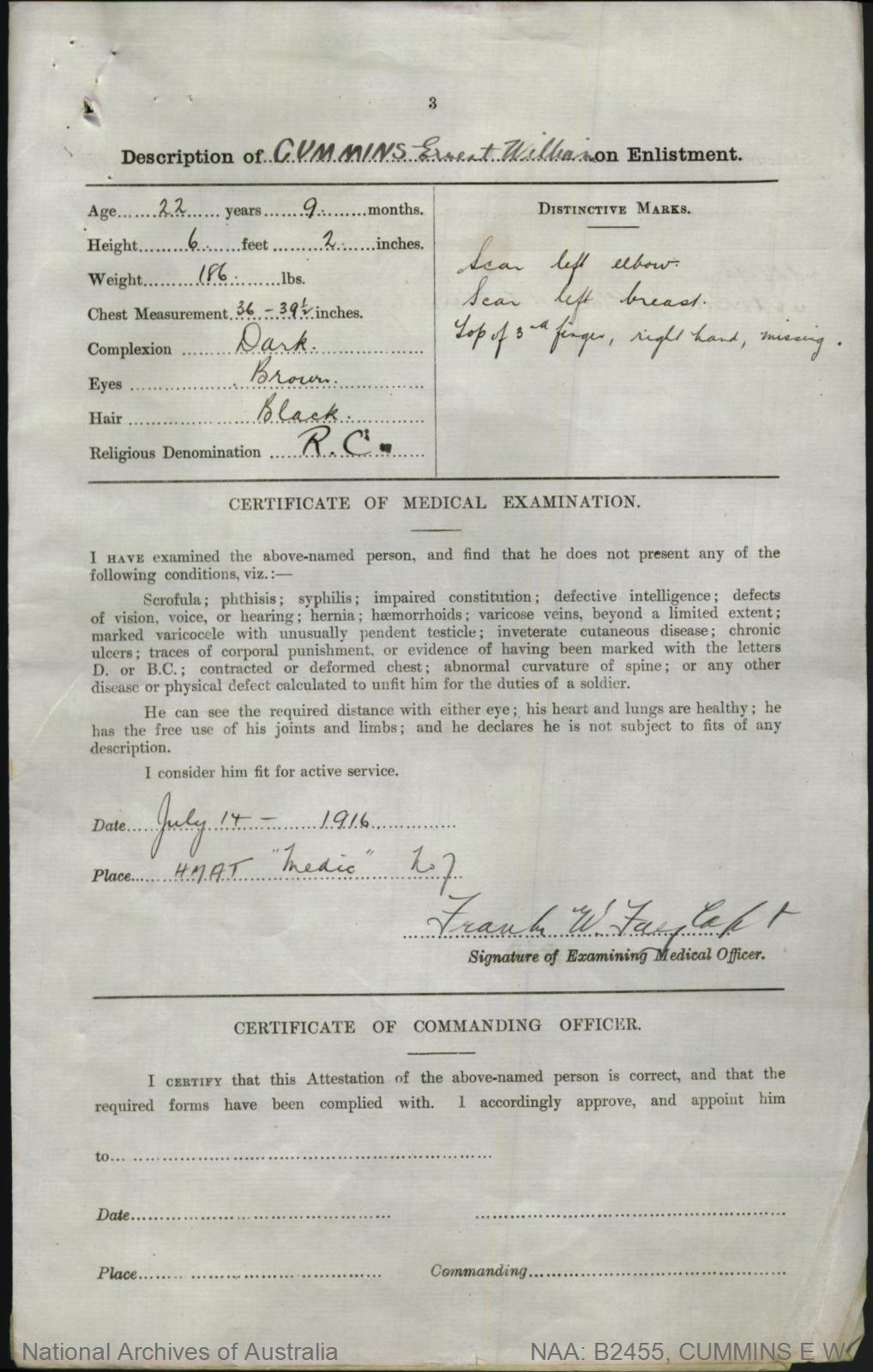
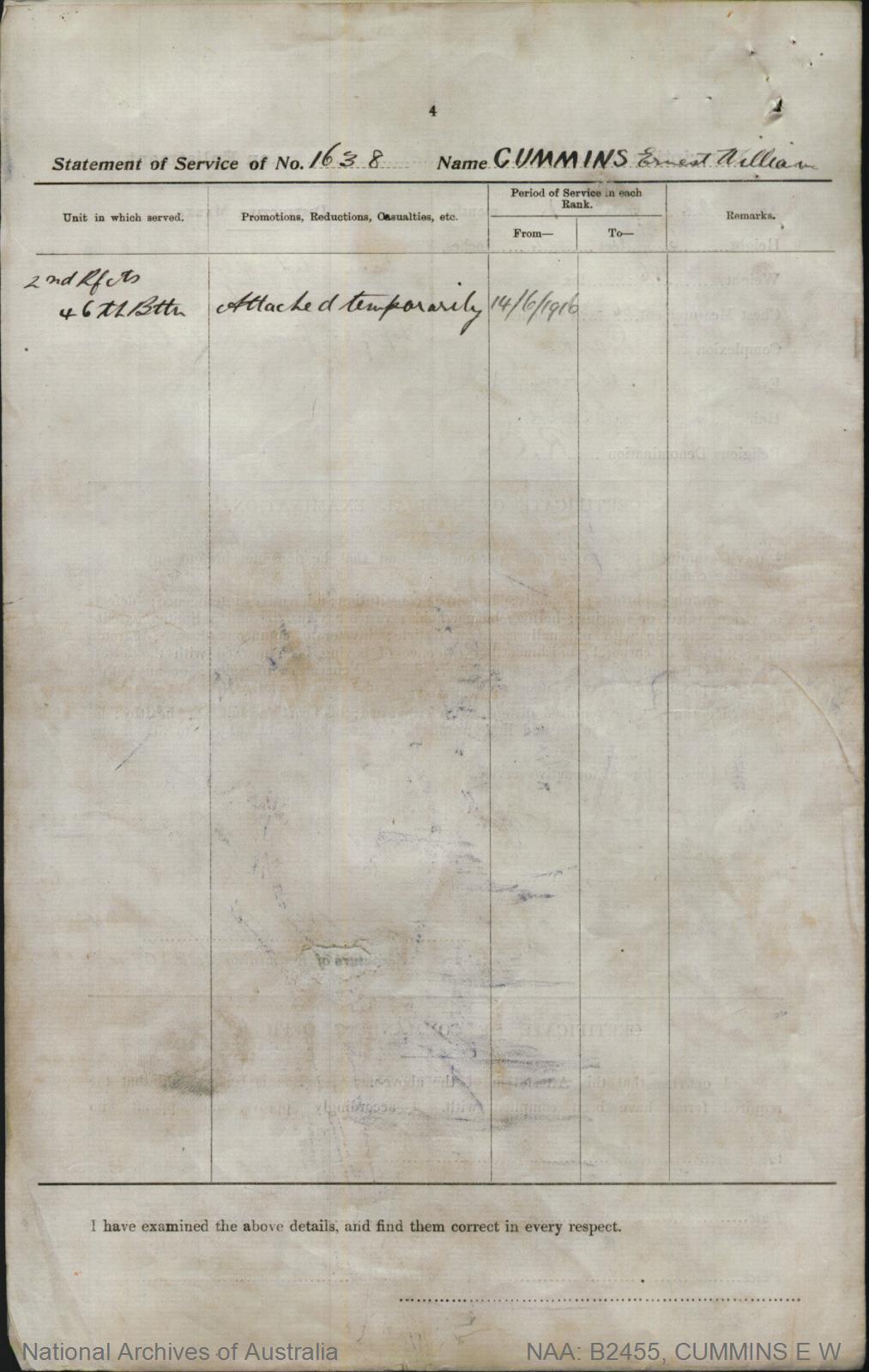

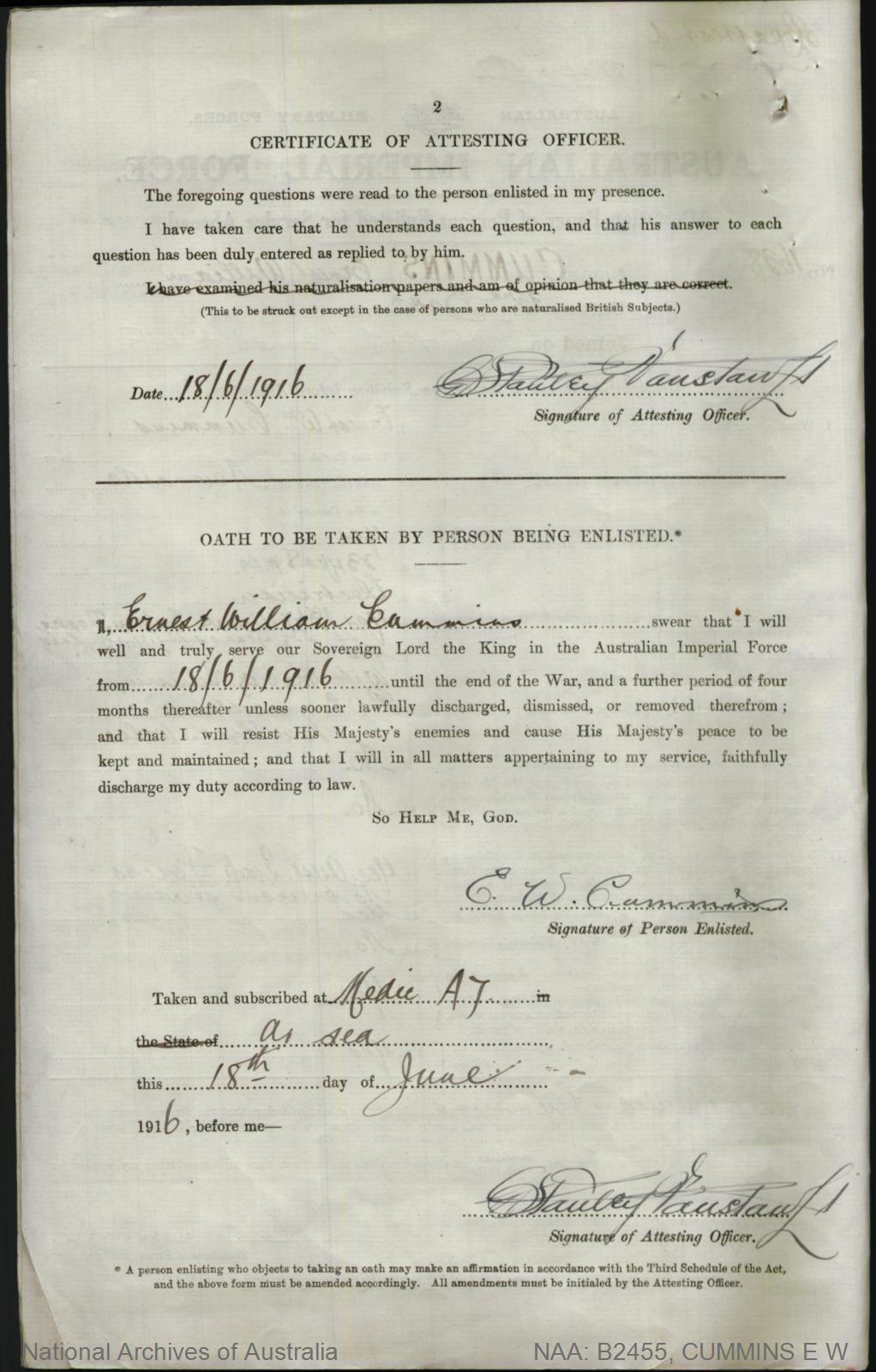
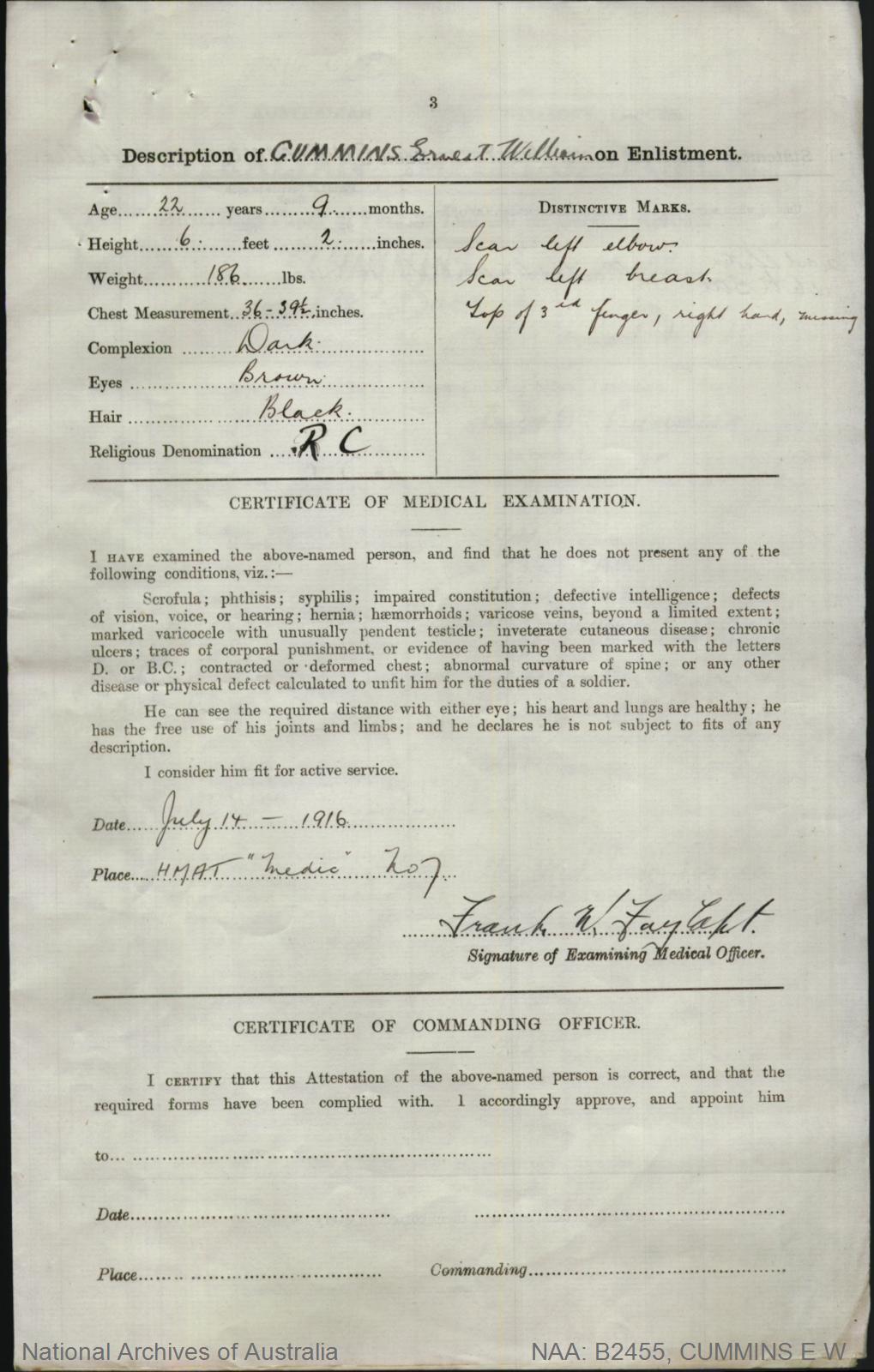
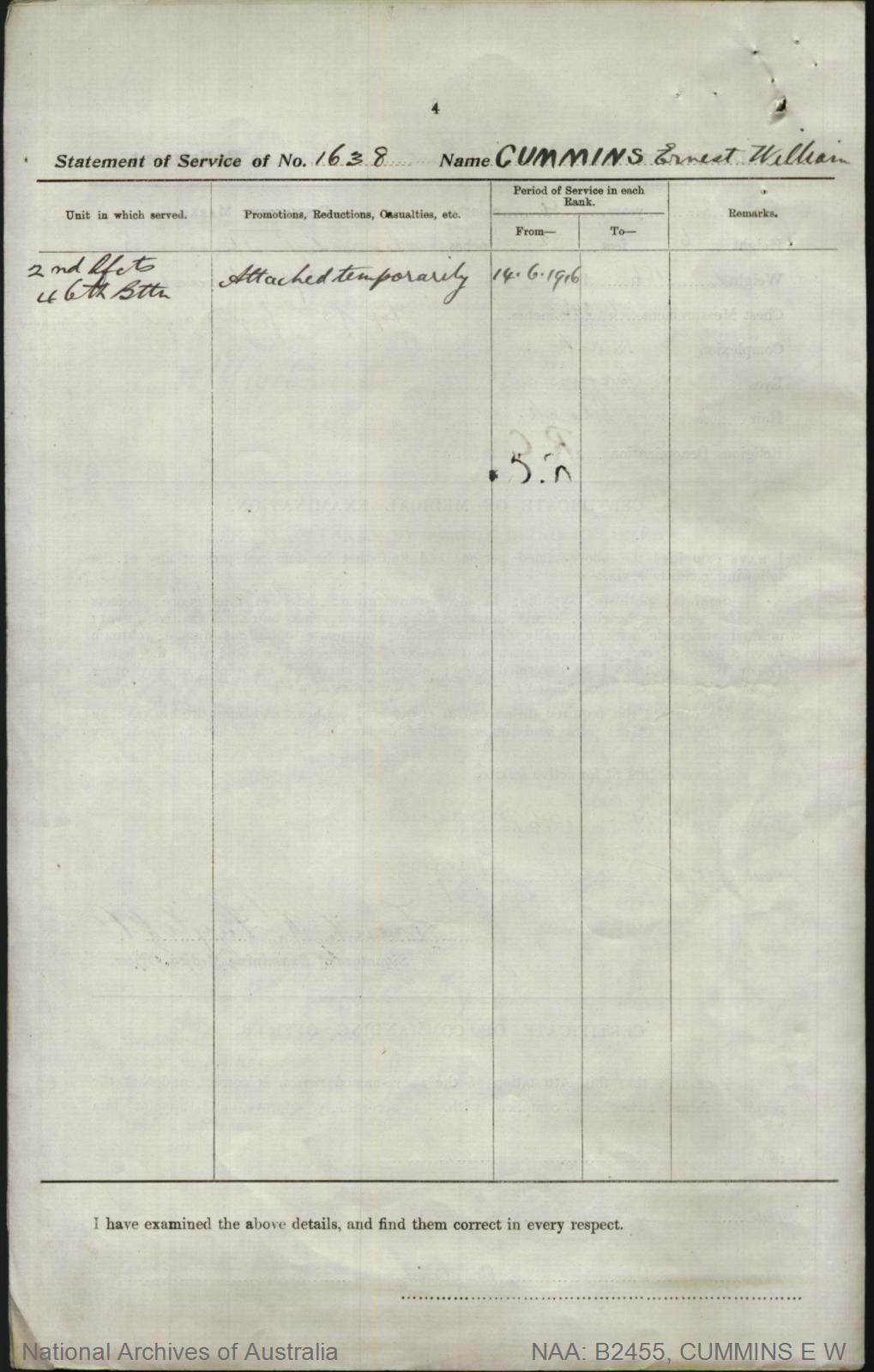
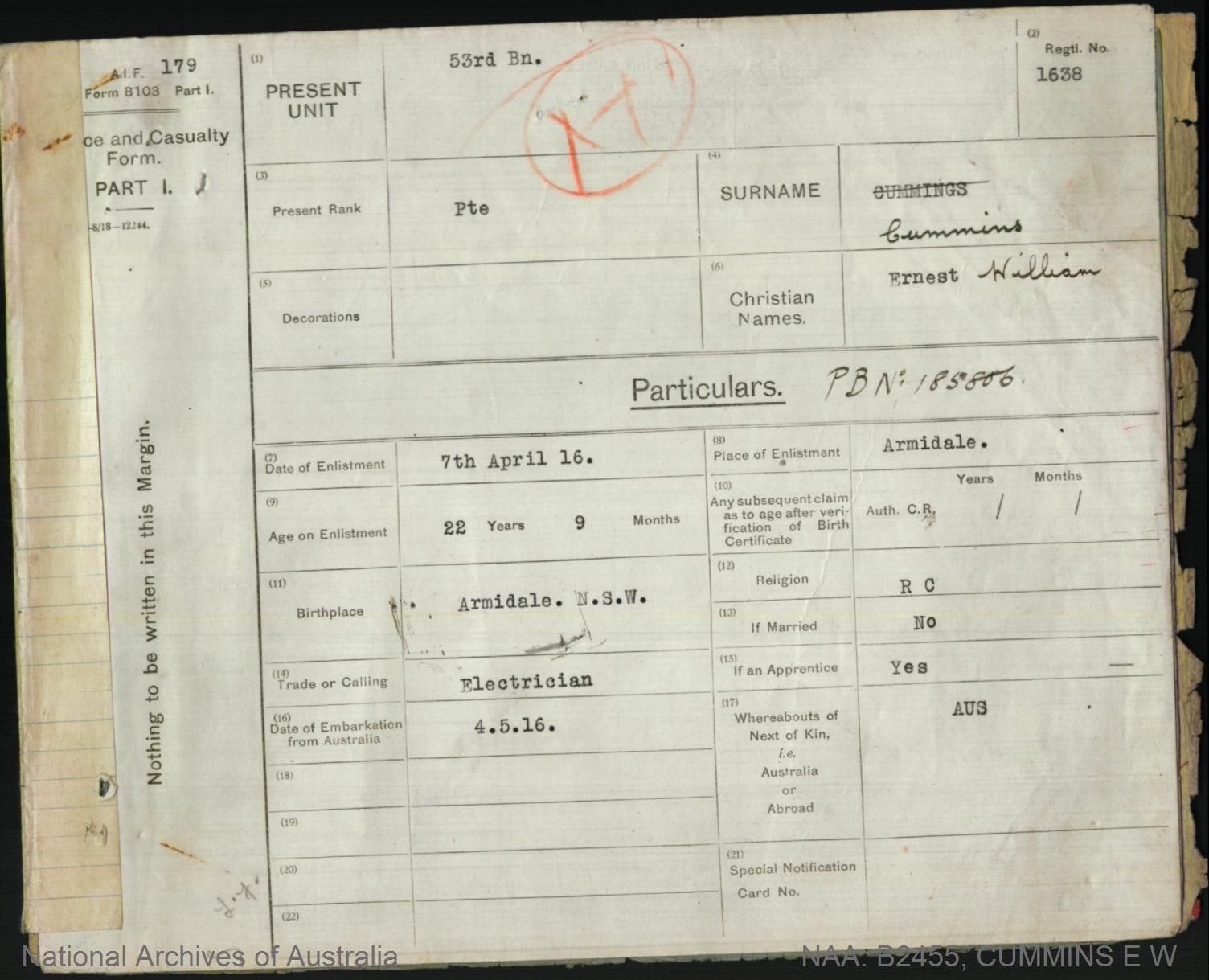
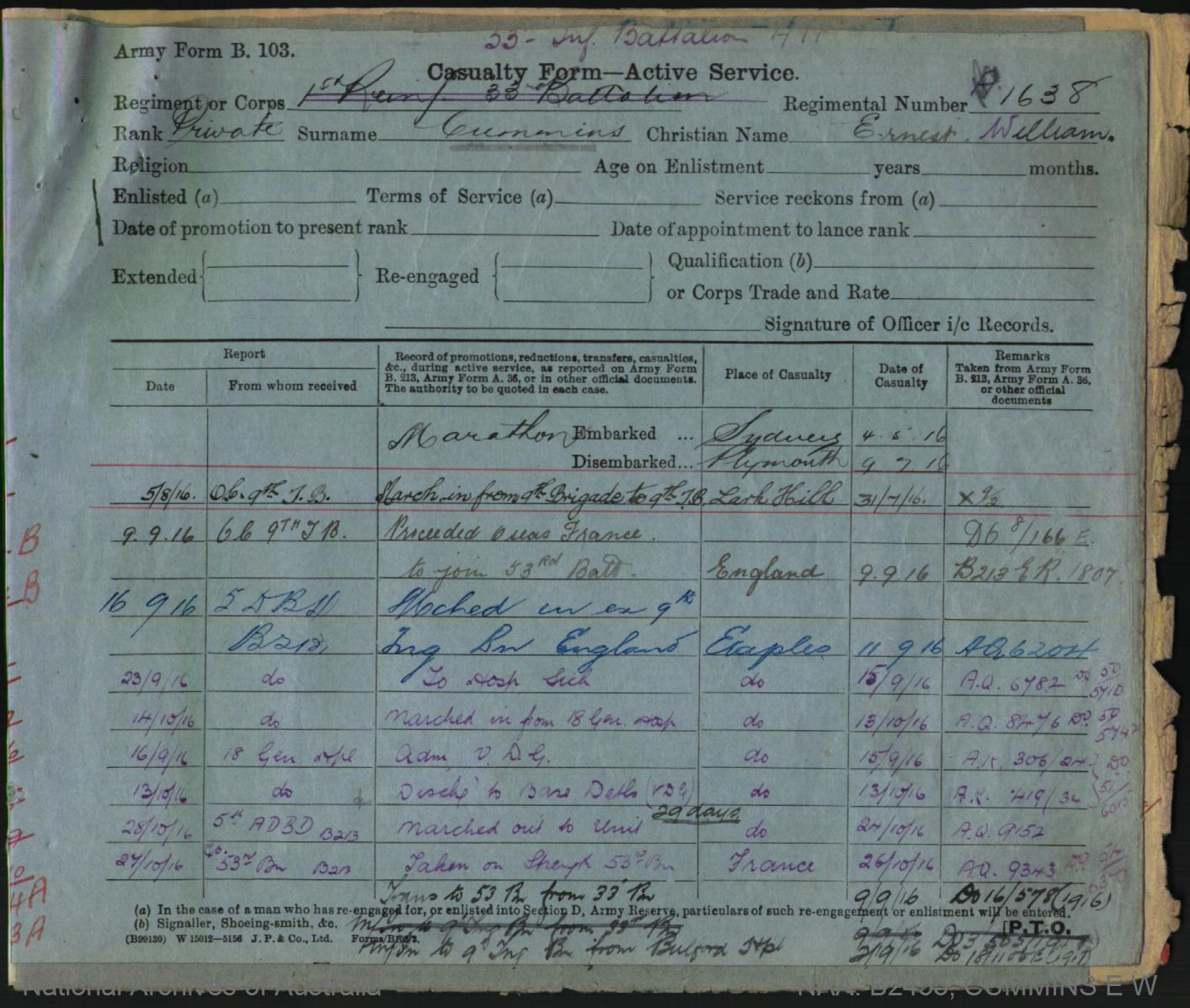

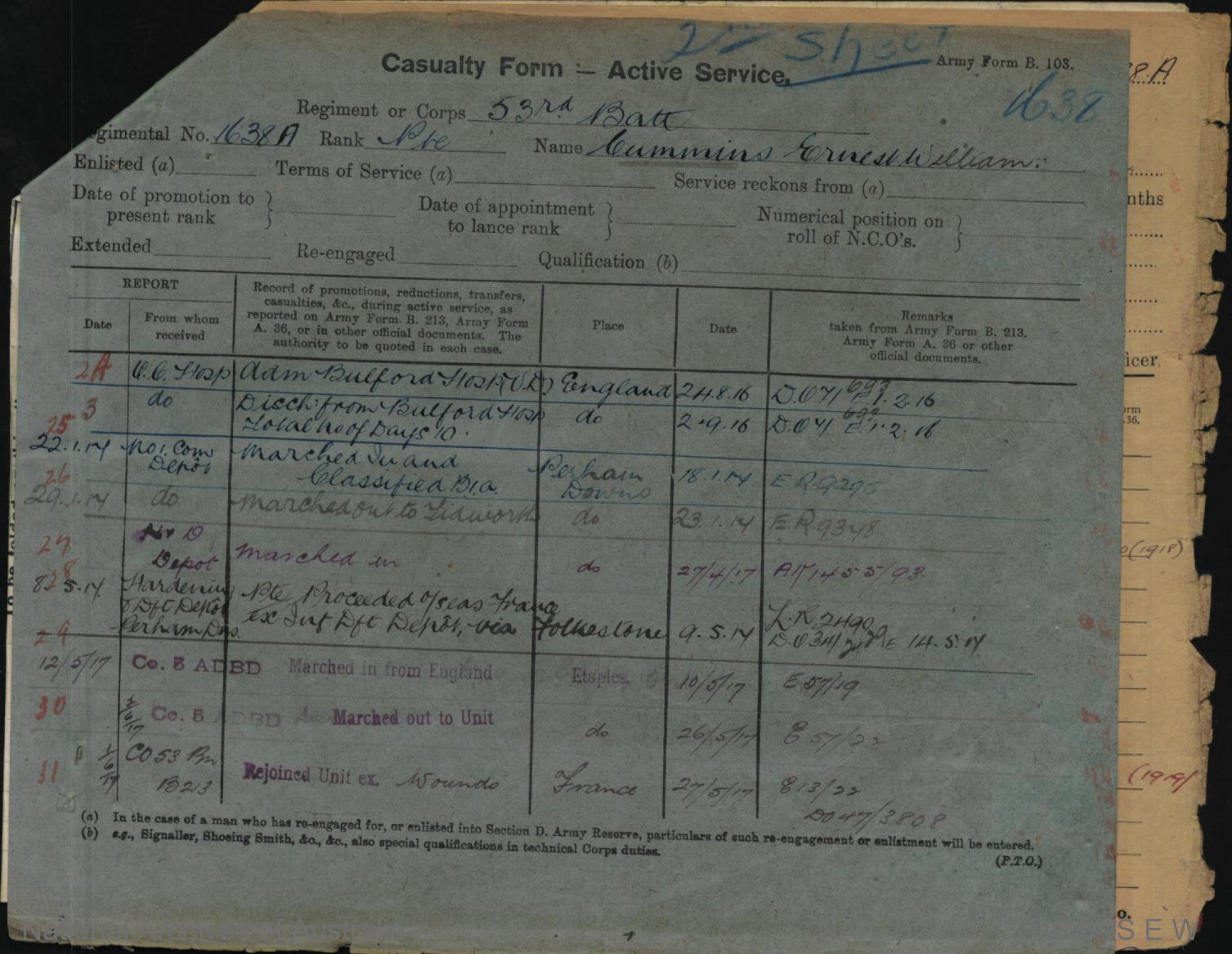
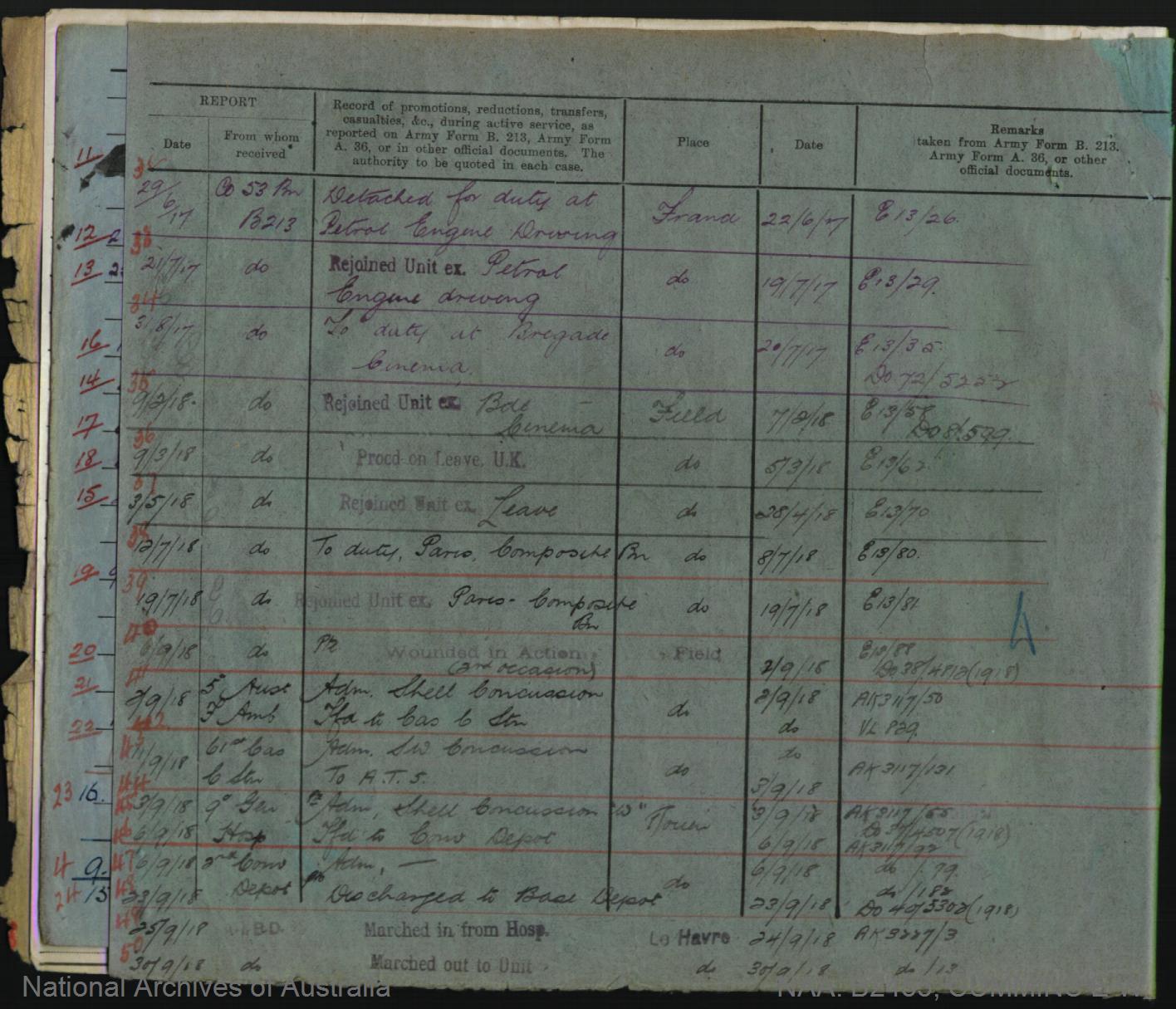
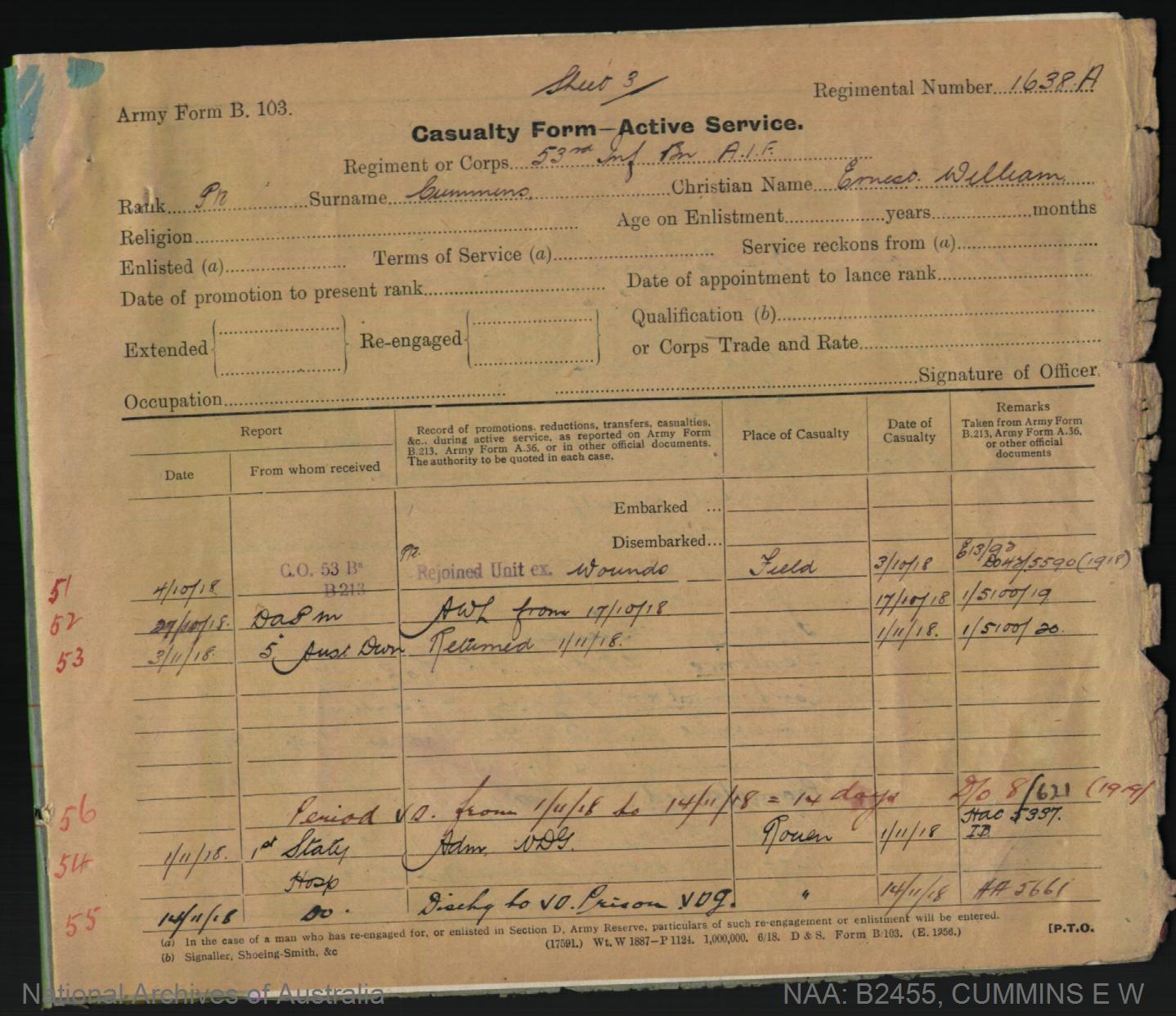

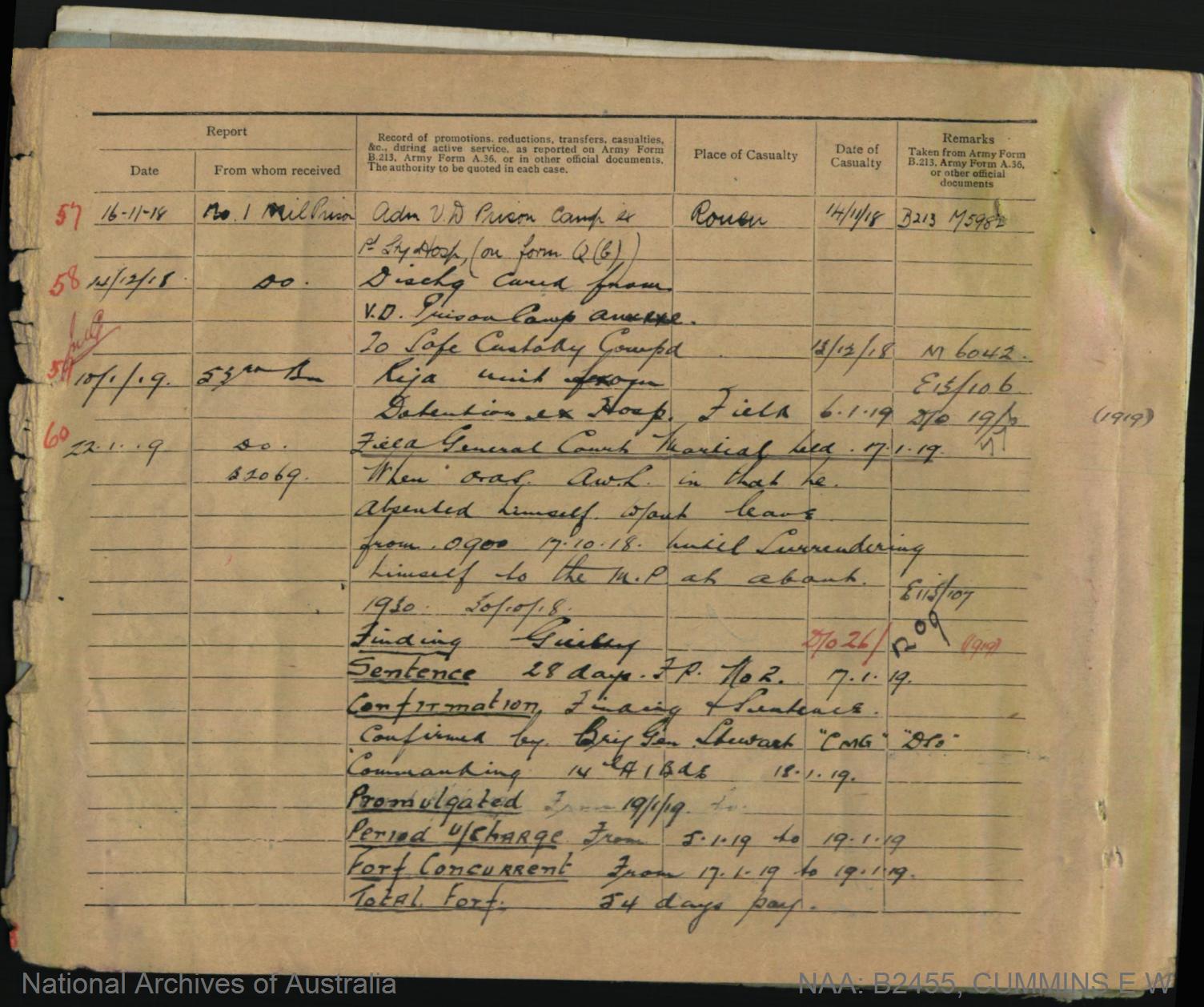
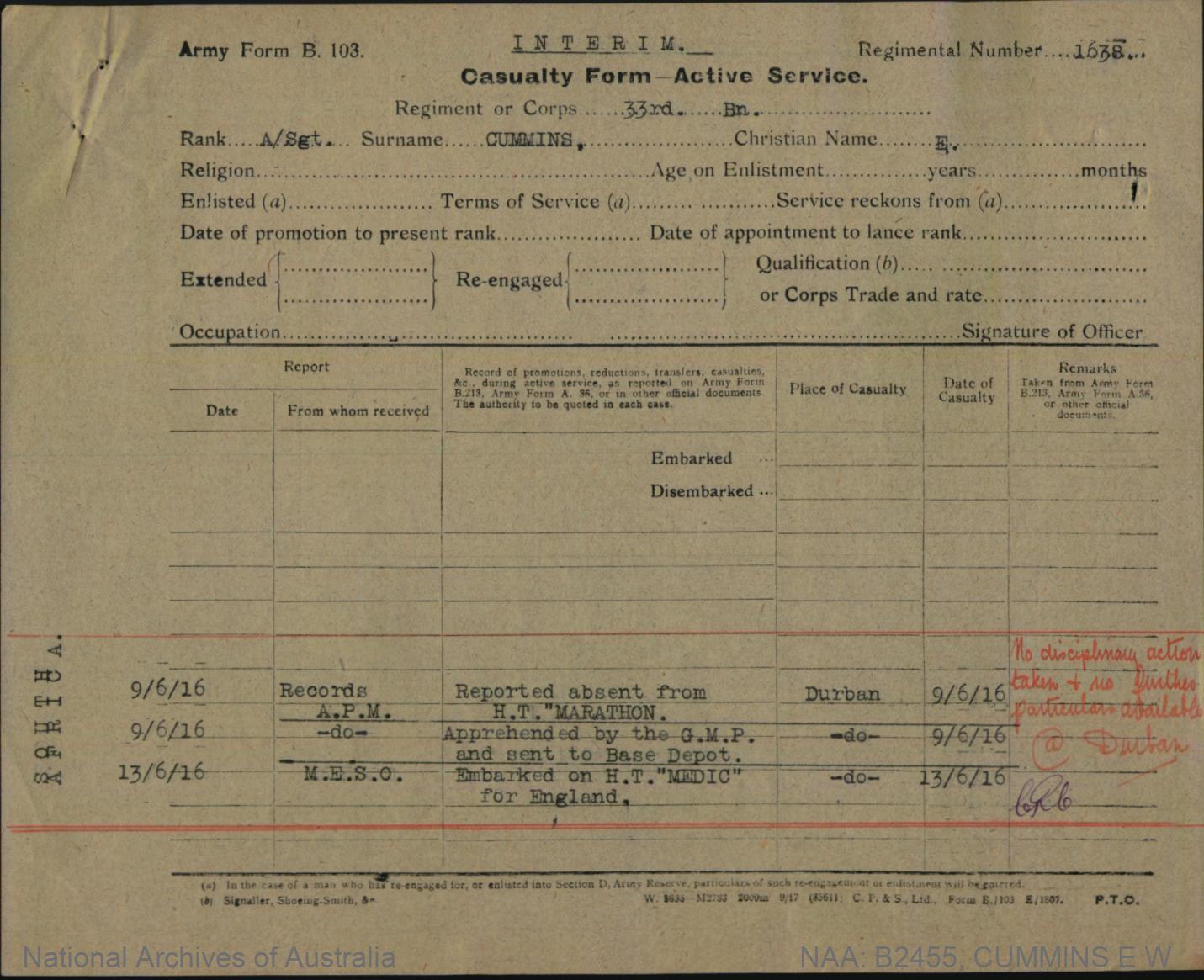


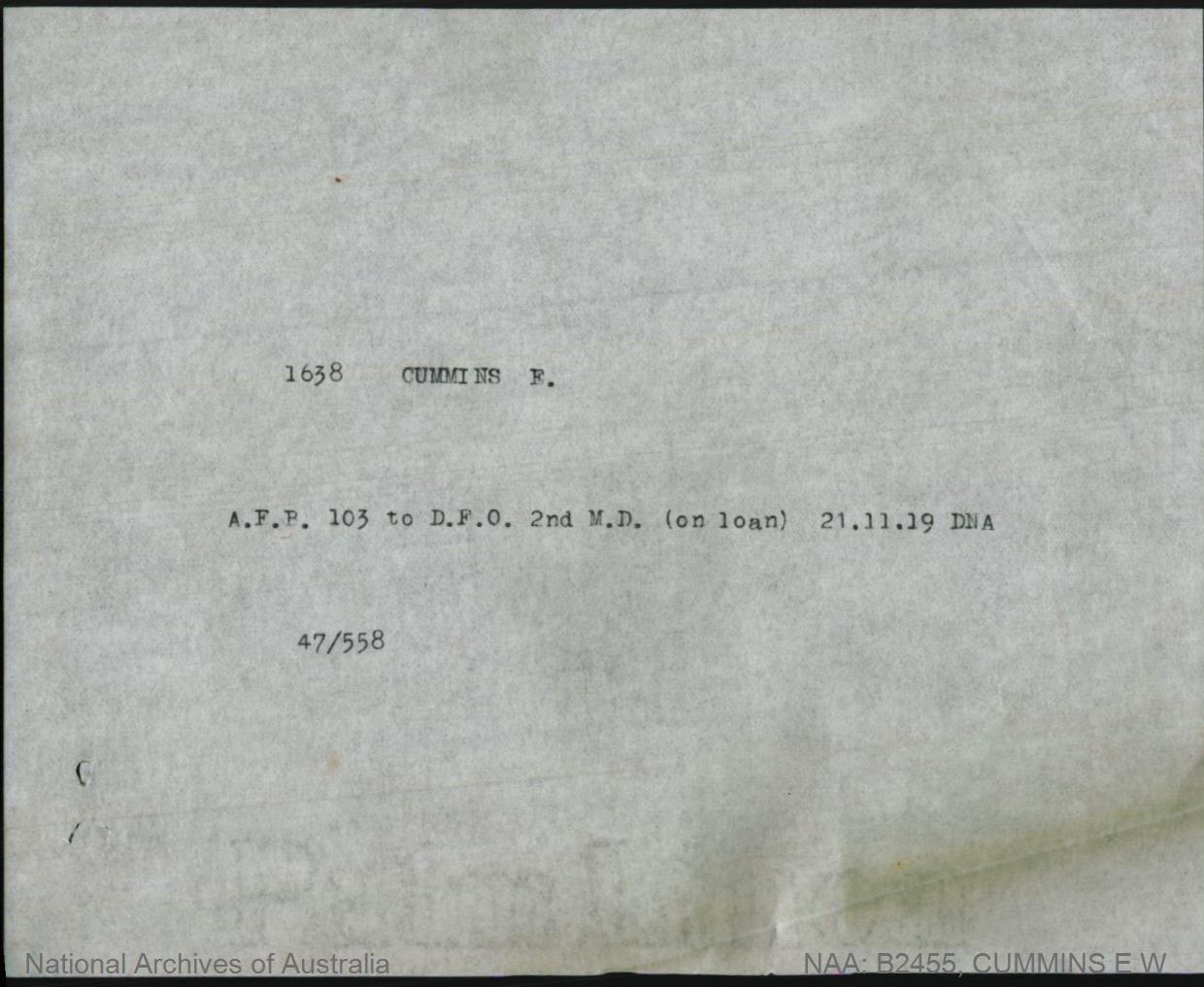
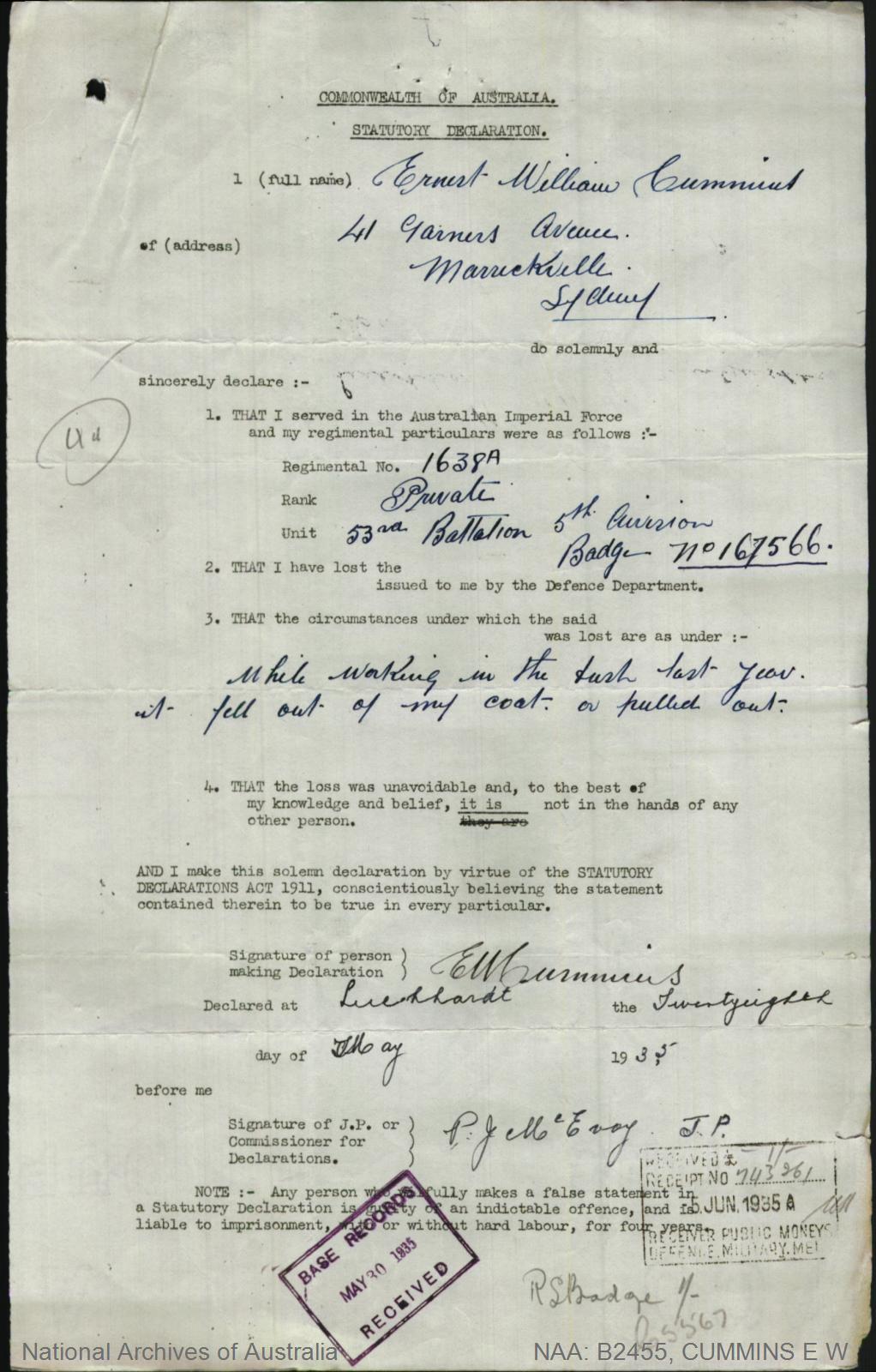
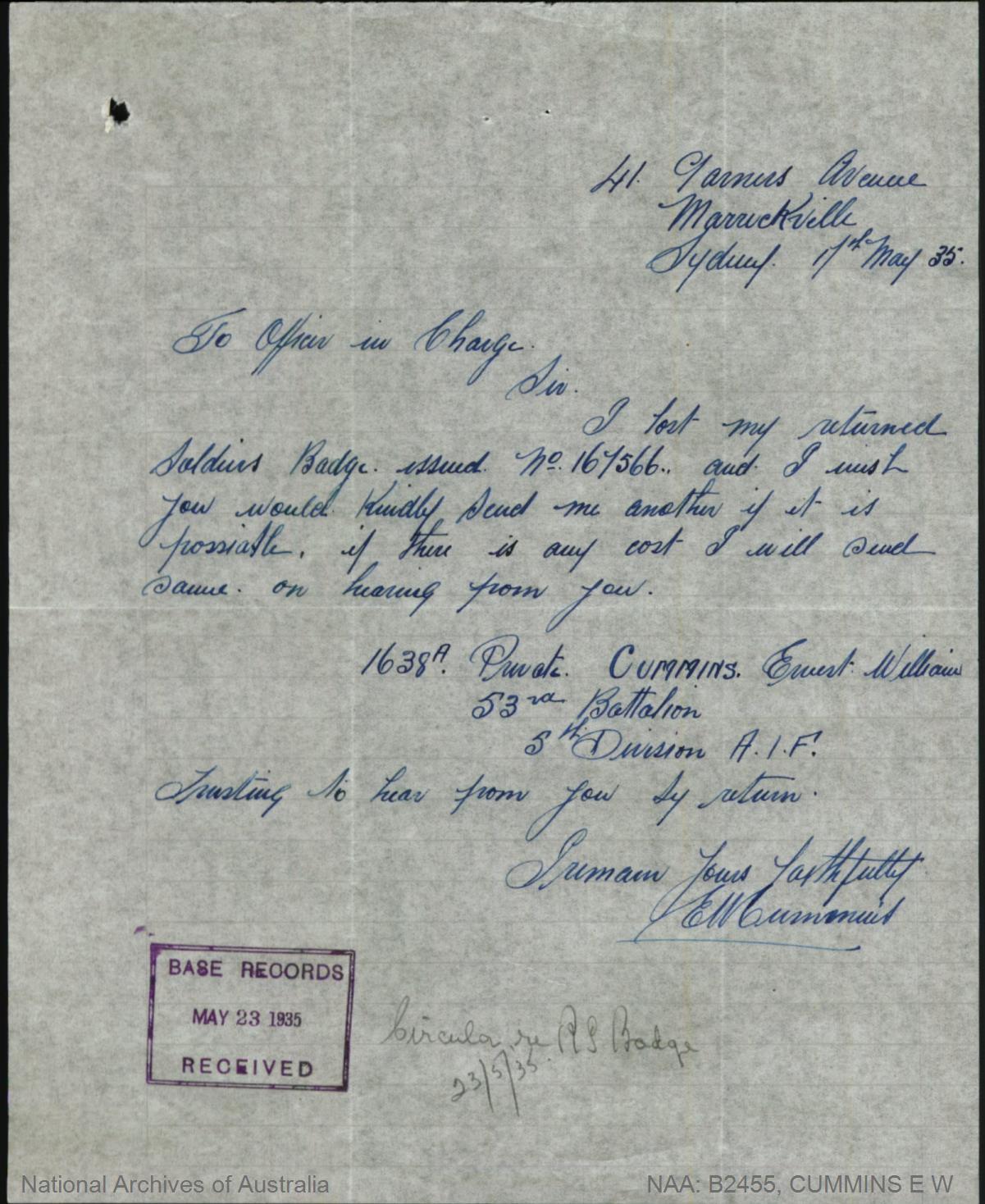
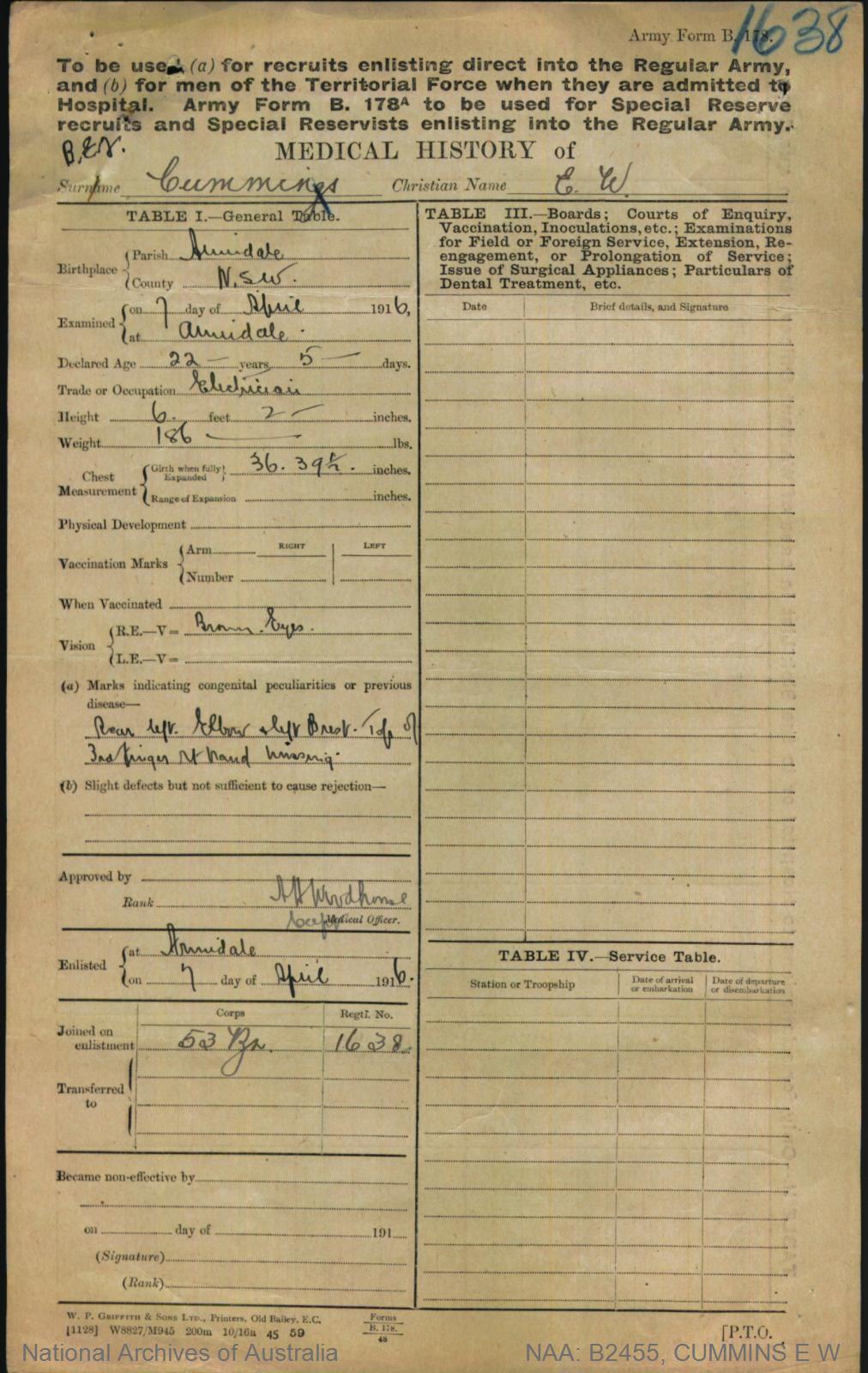
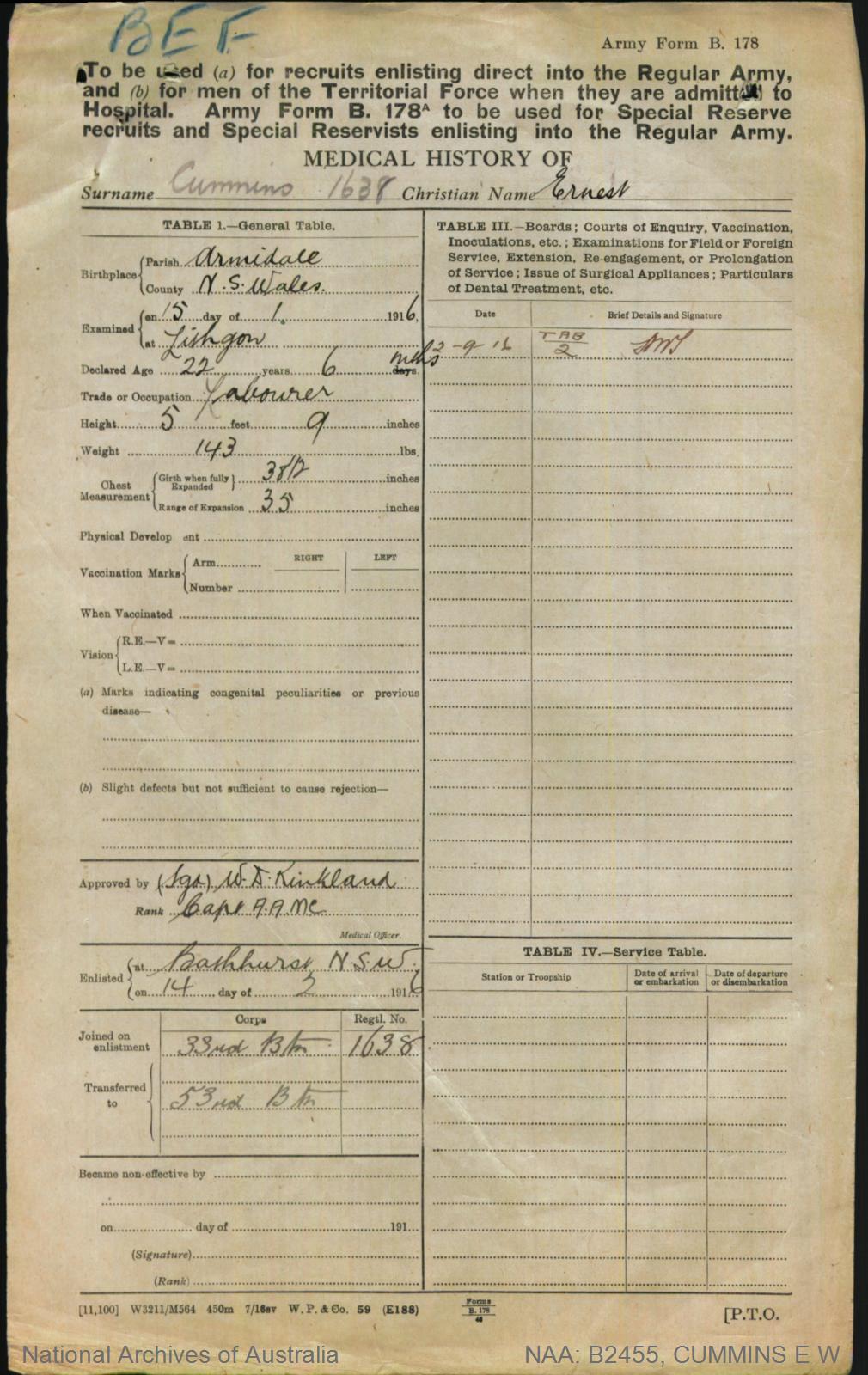
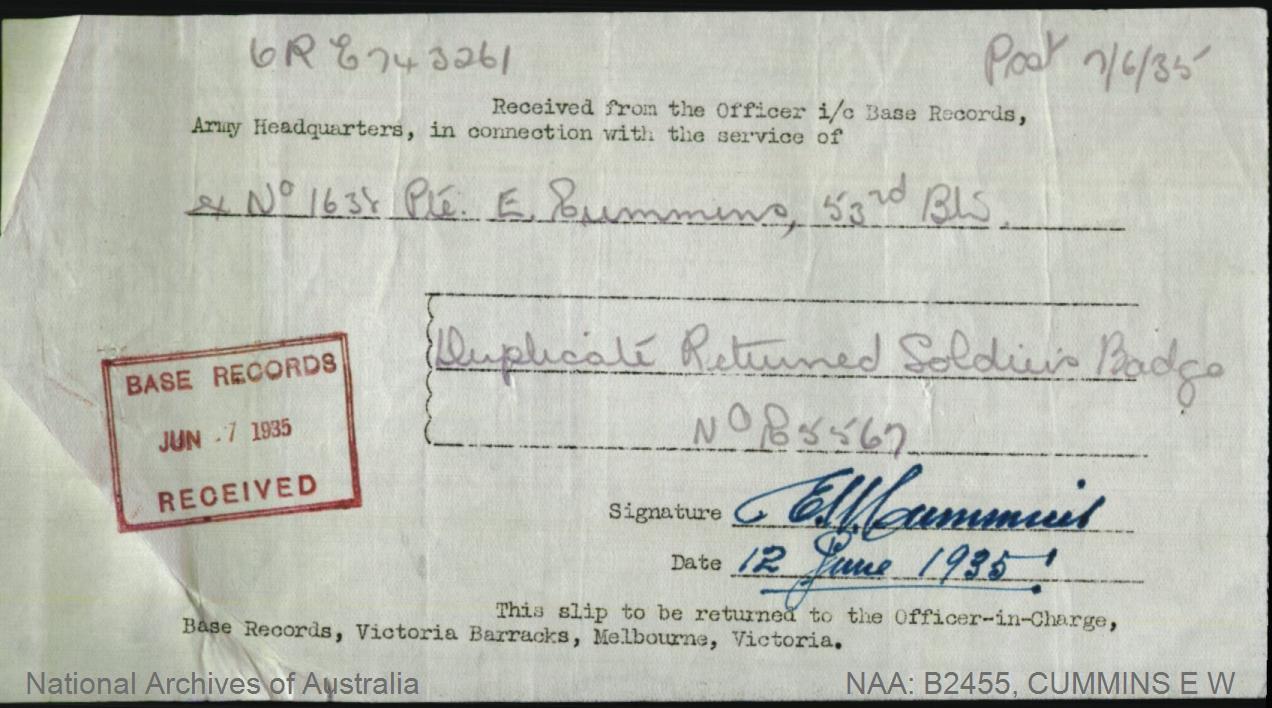
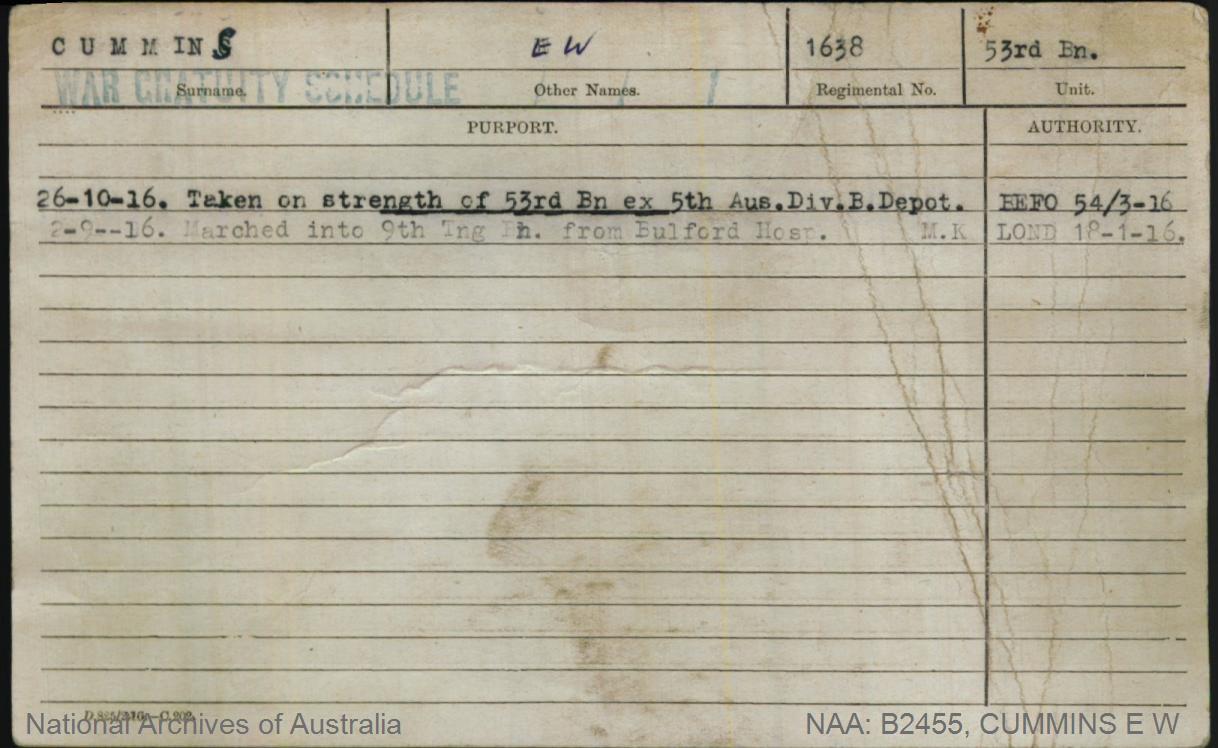
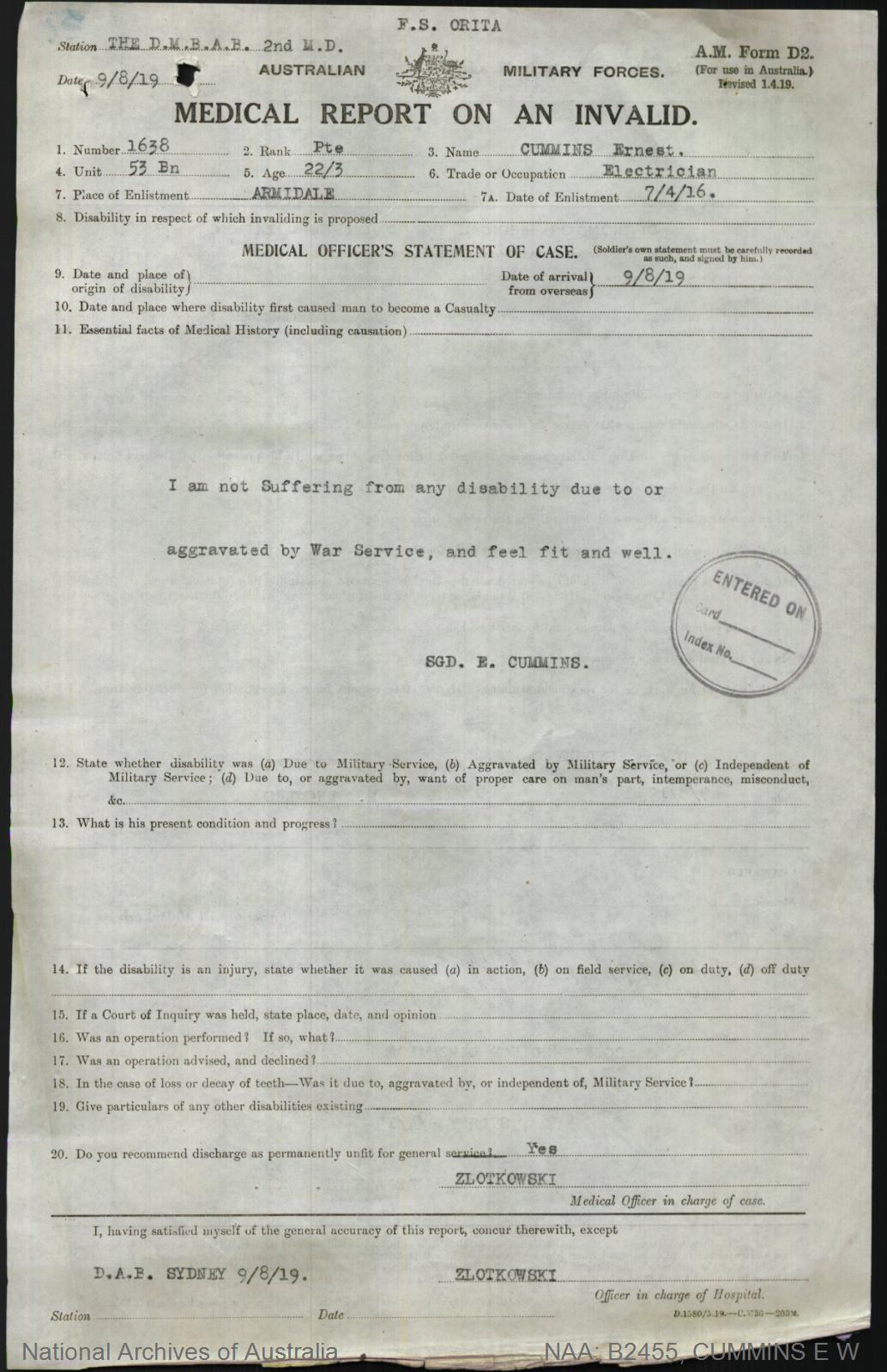

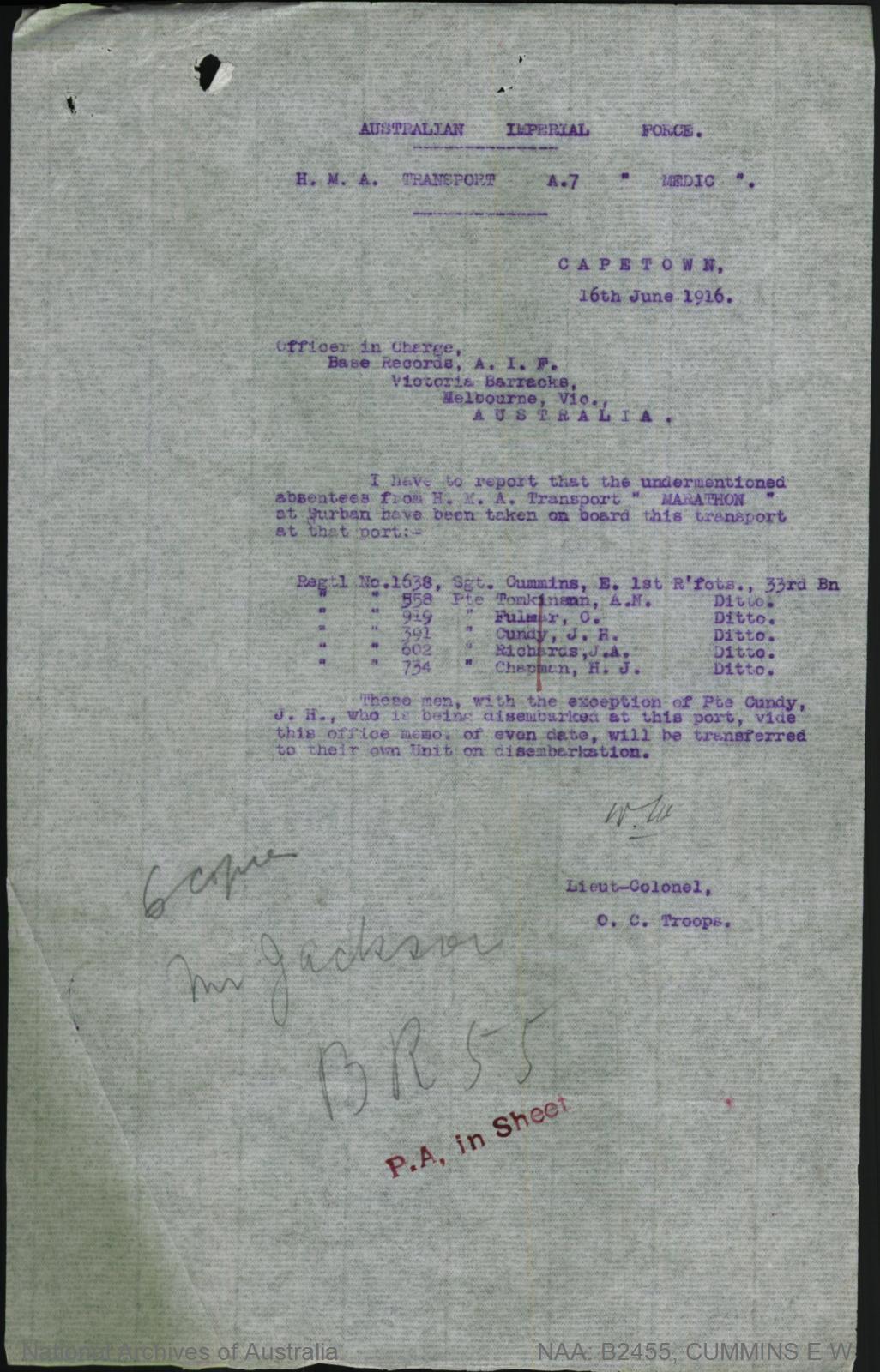
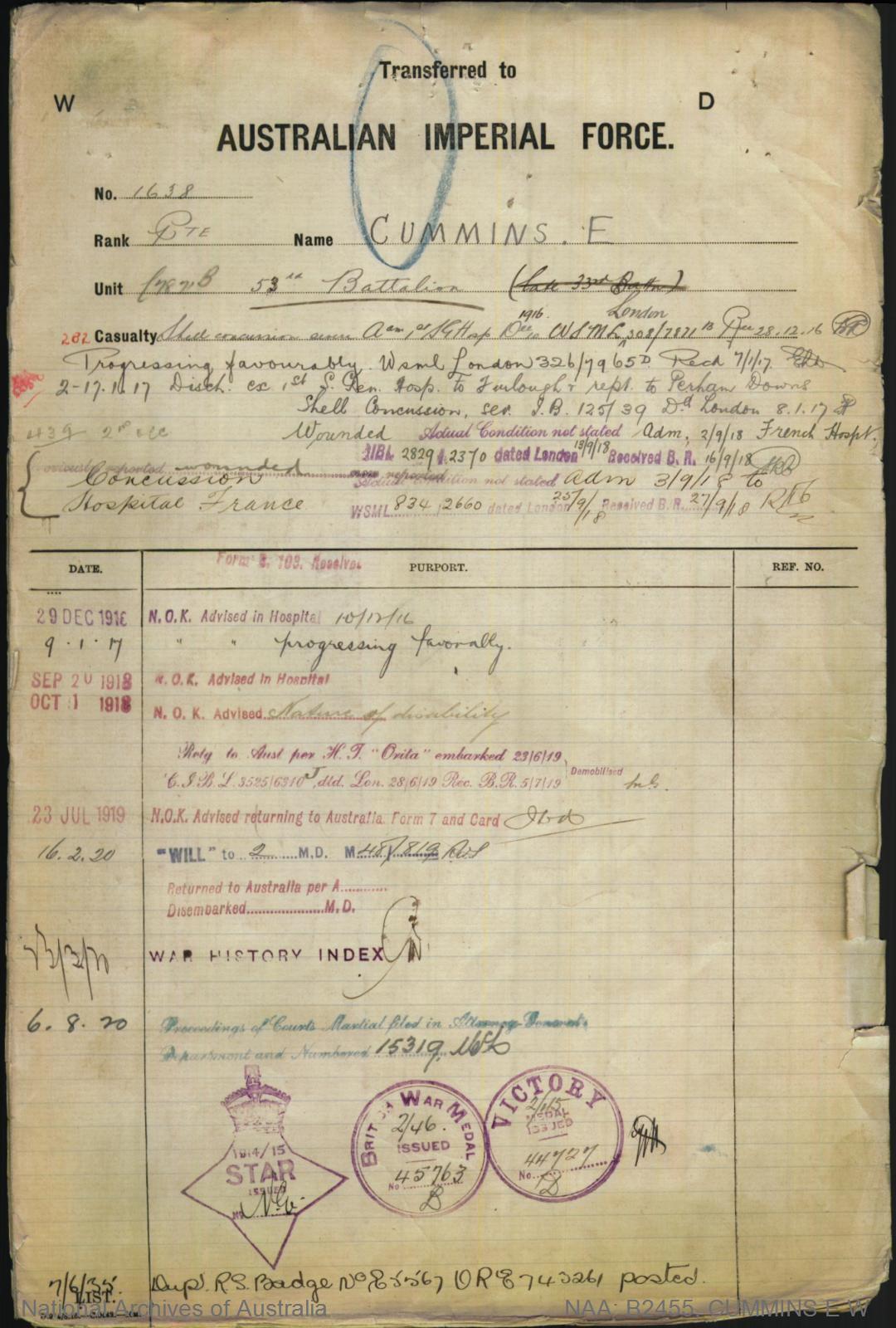
World War 2 Records
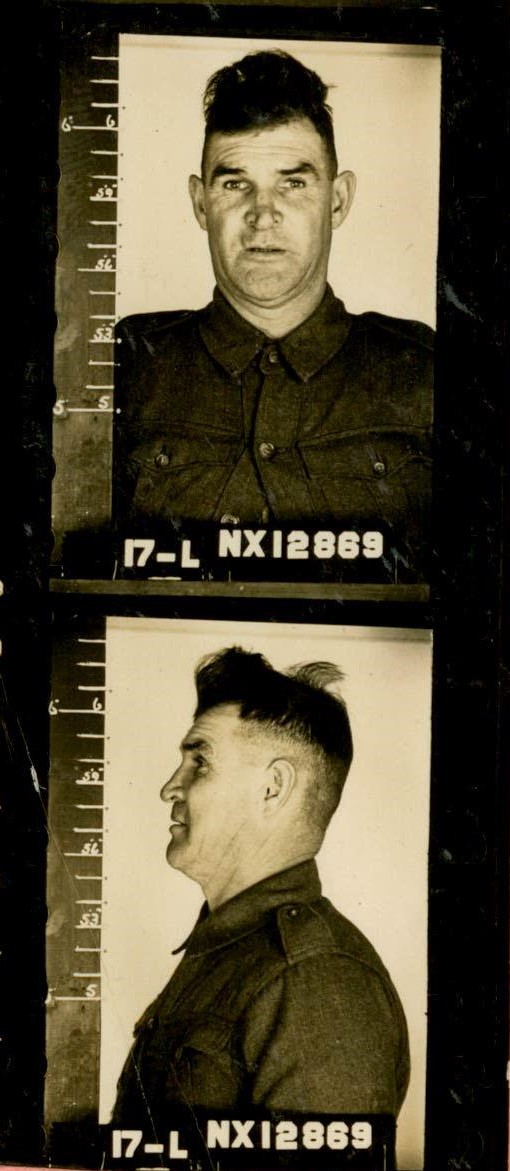

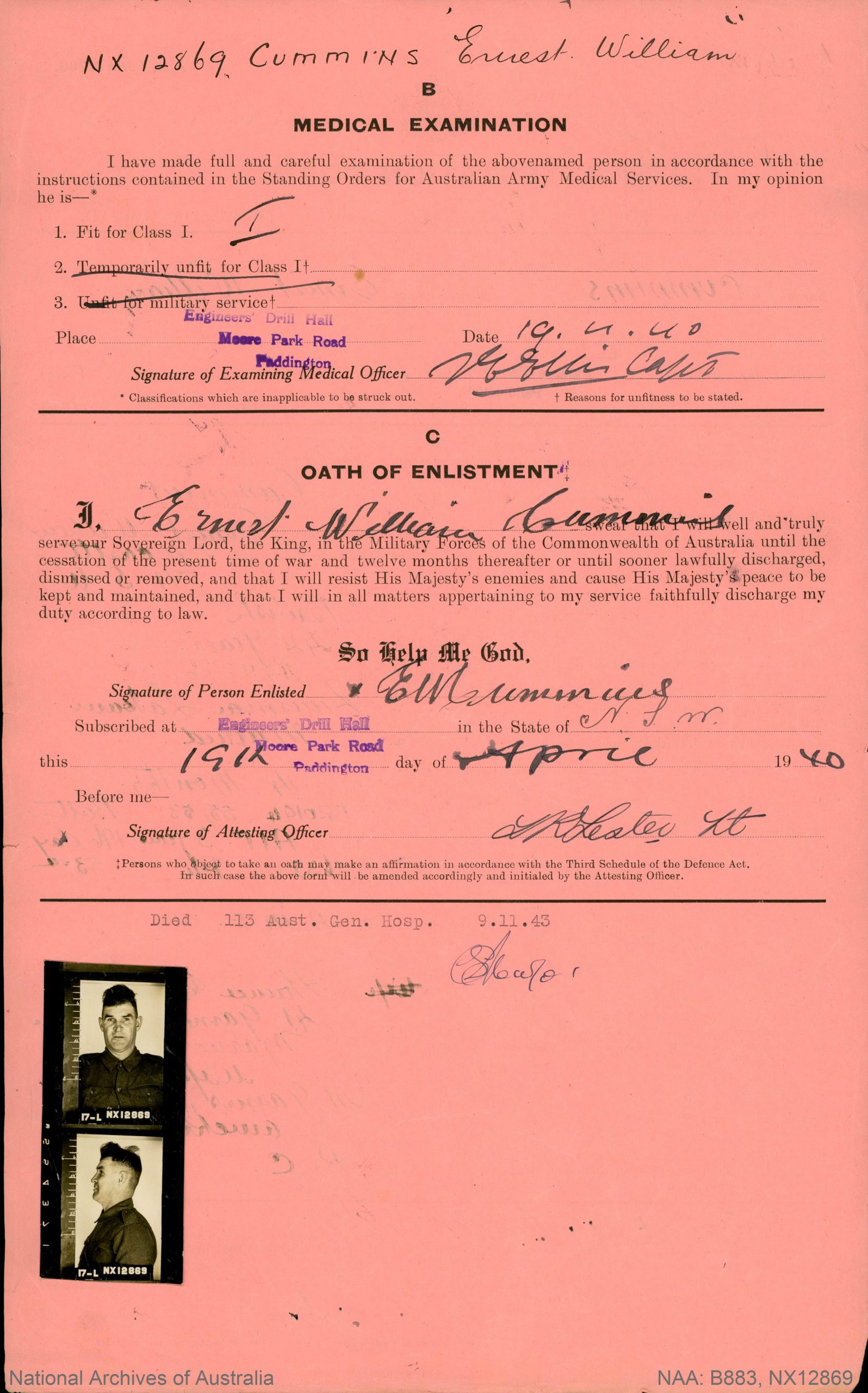


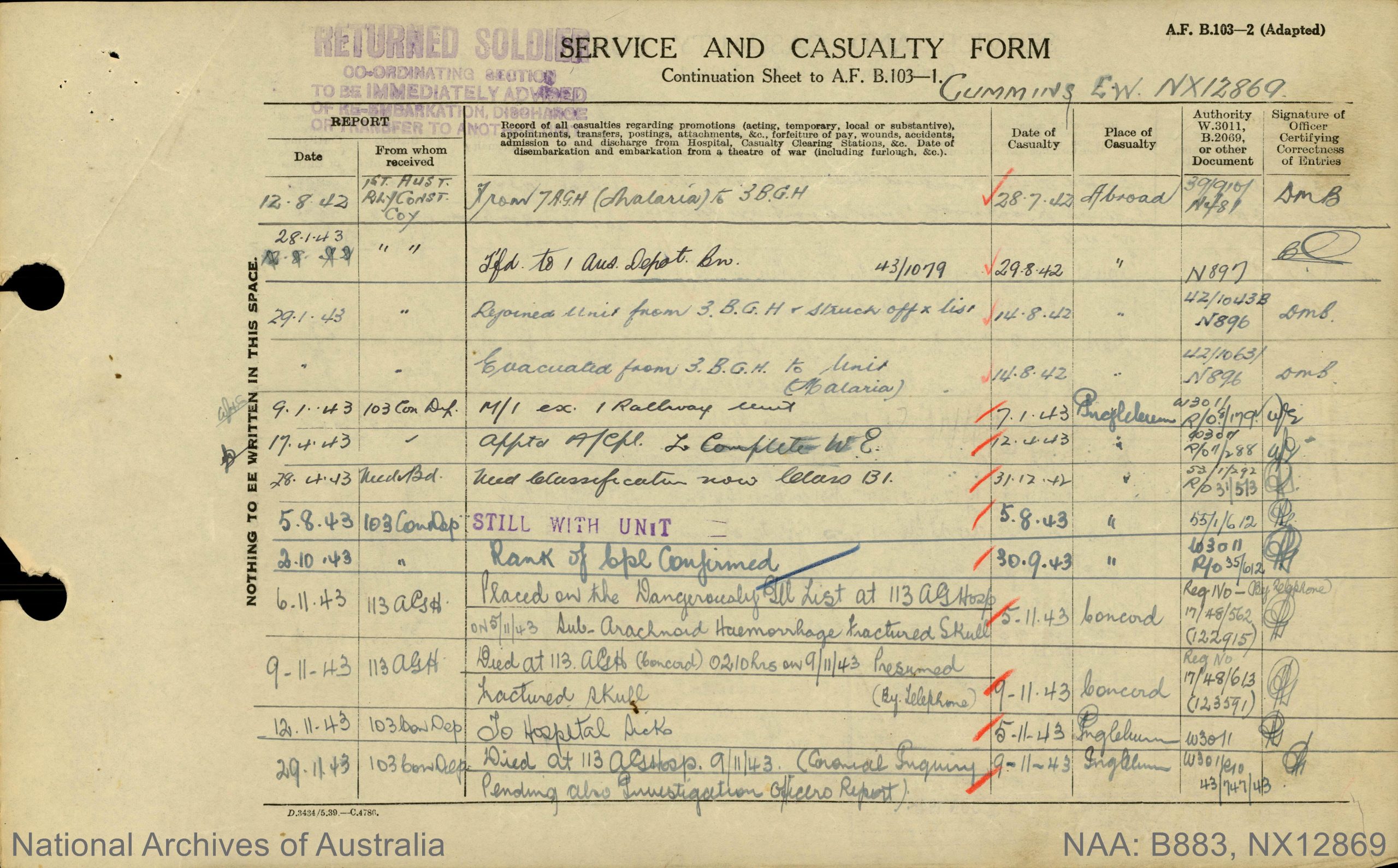
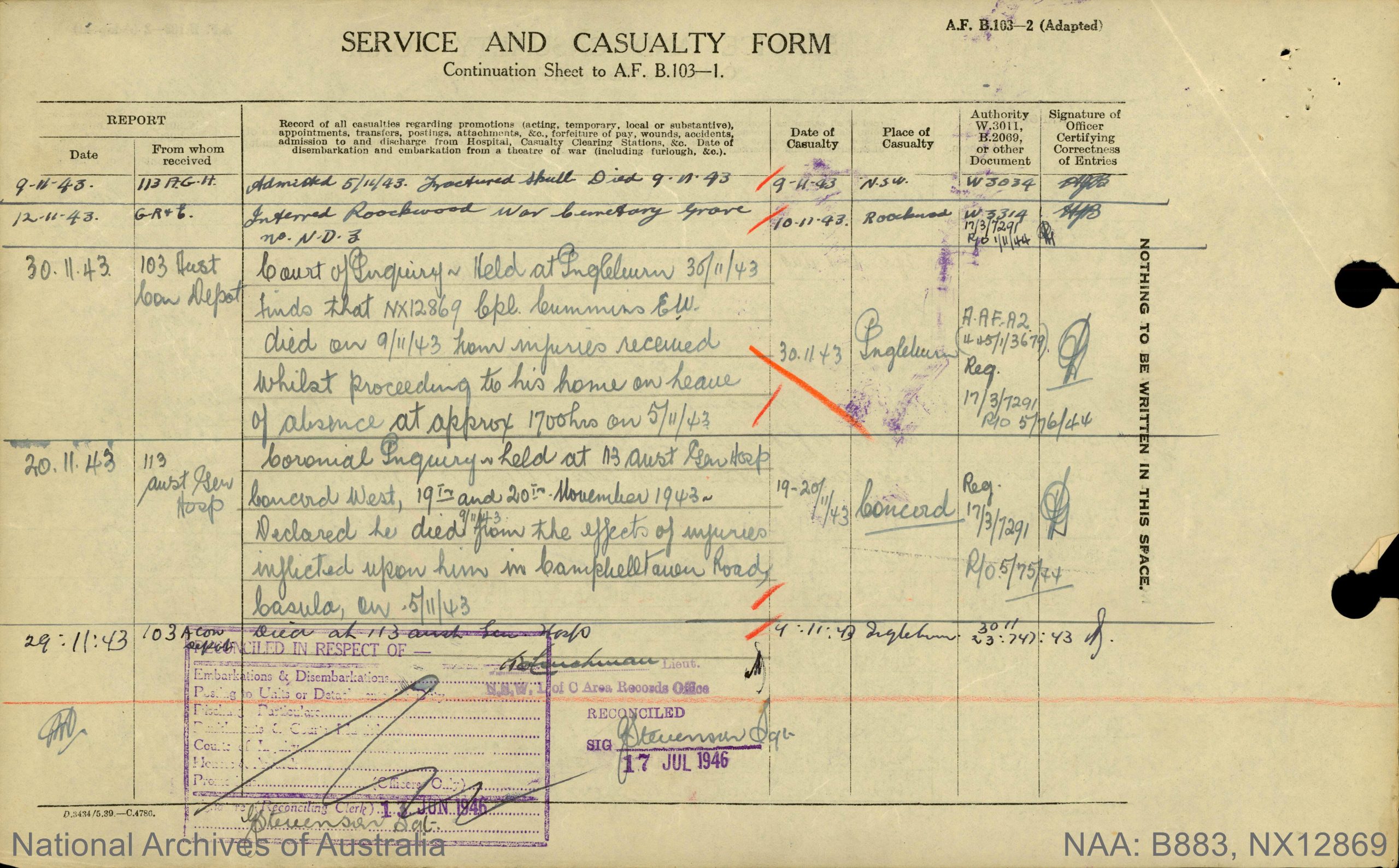
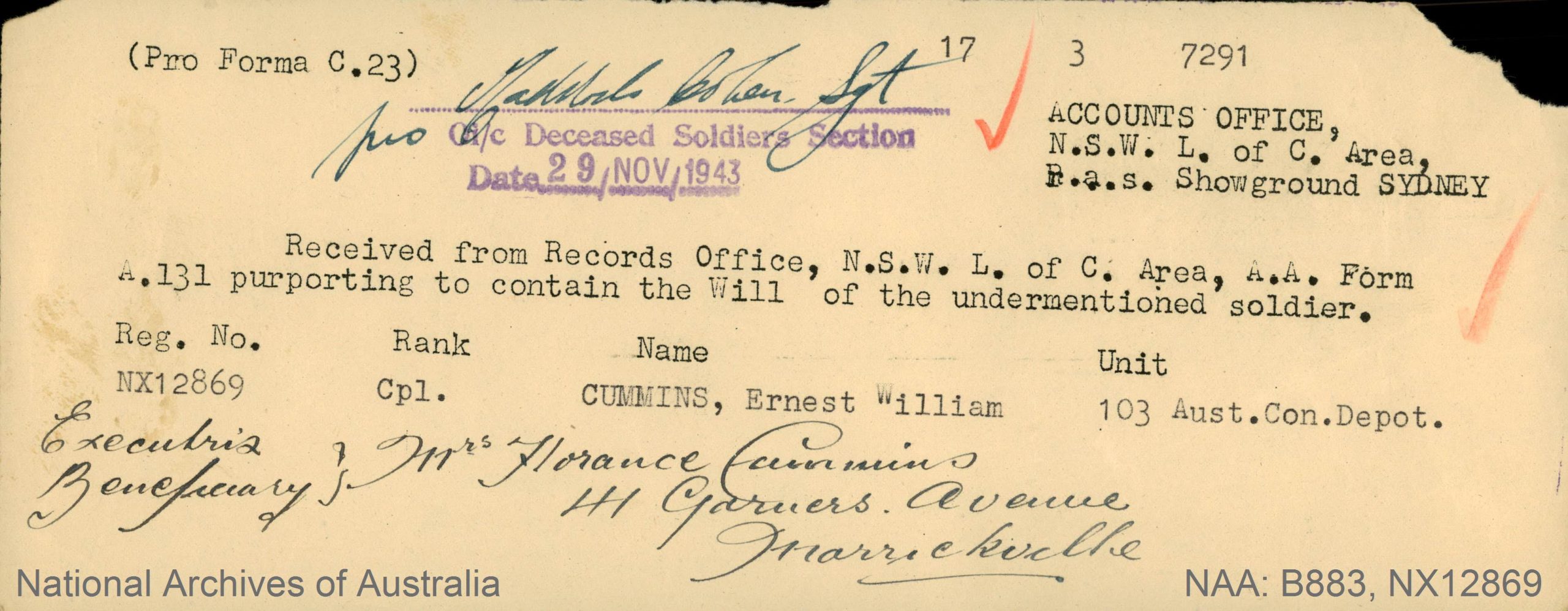
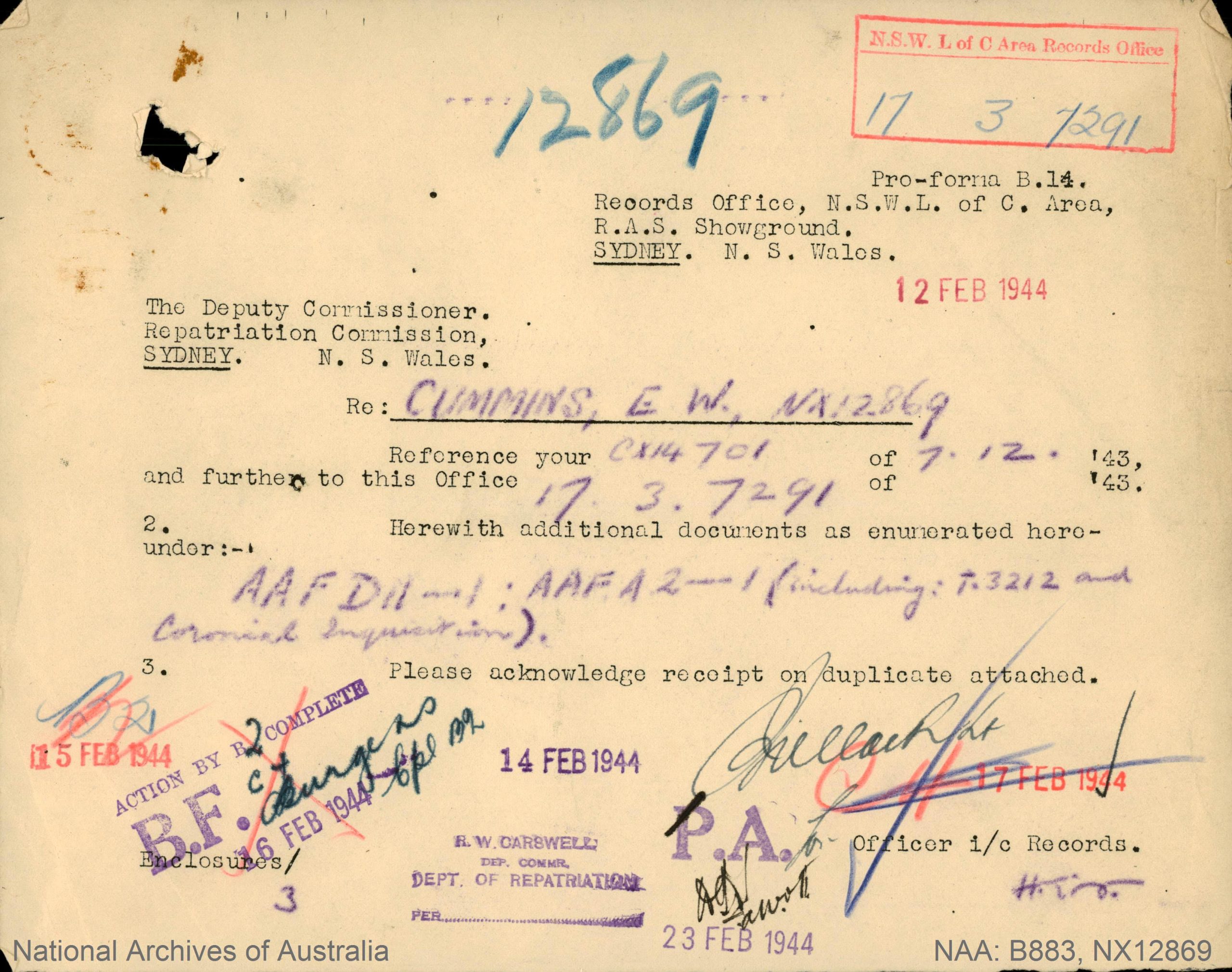
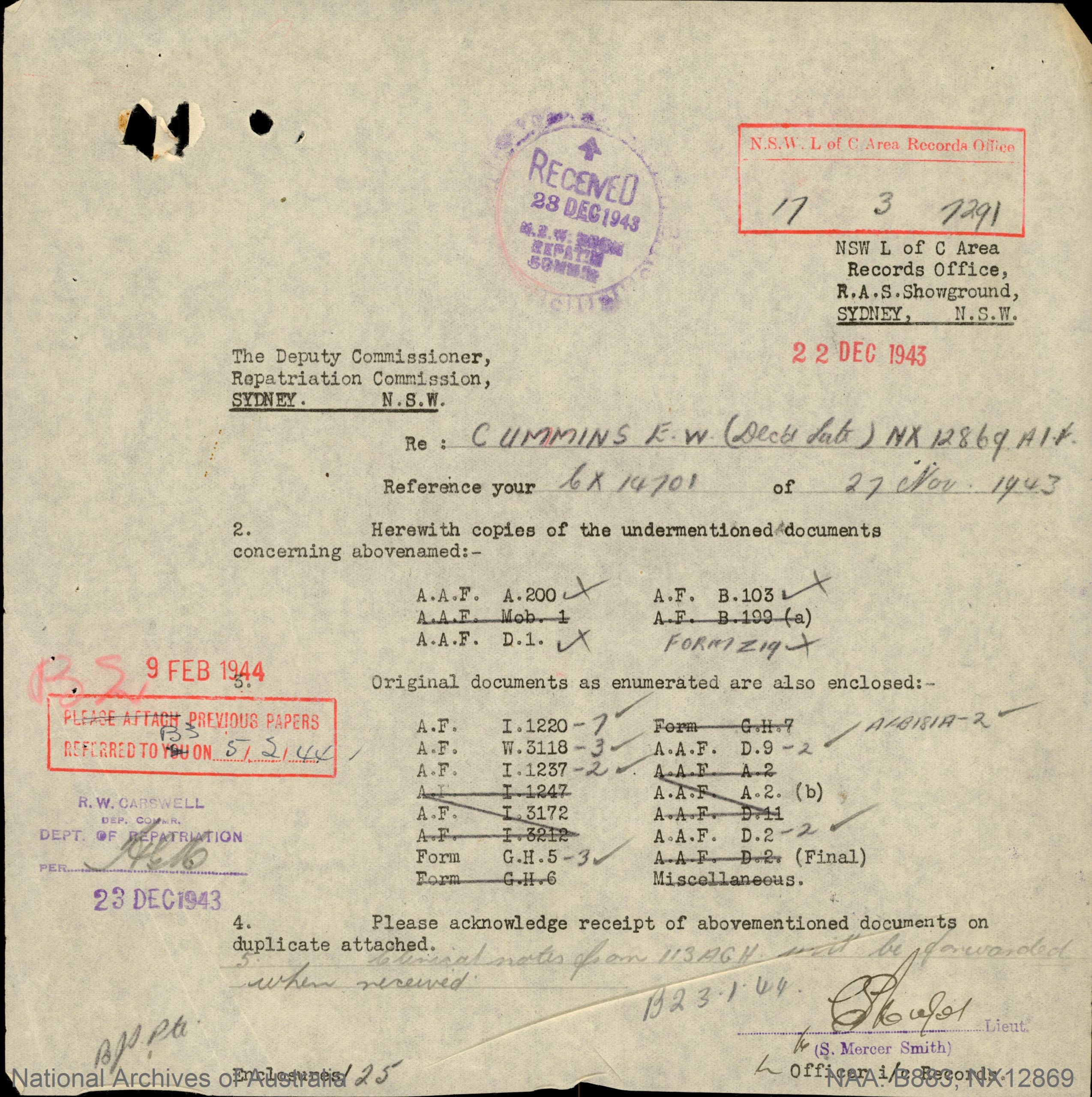
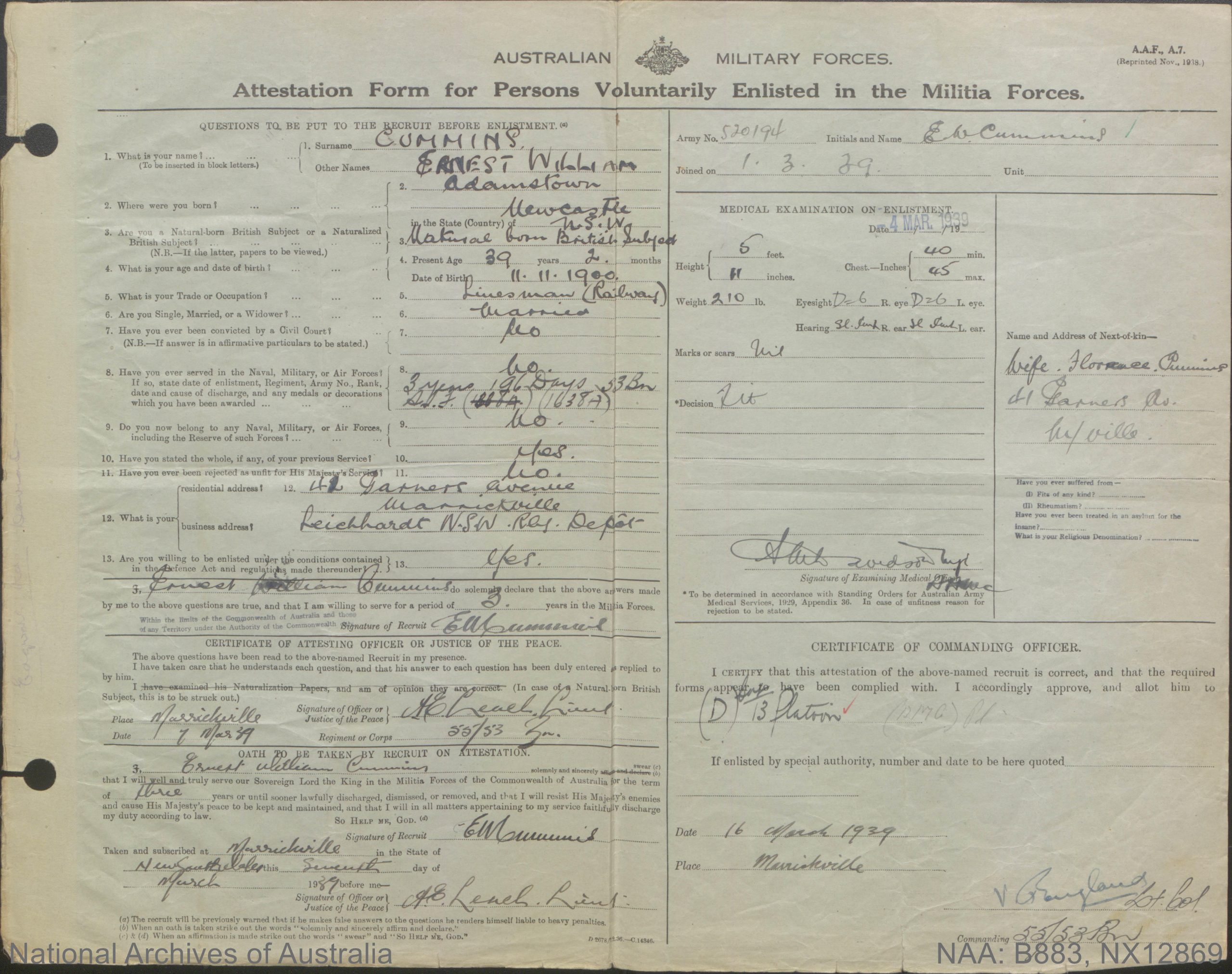

© Commonwealth of Australia (National Archives of Australia)
Under Construction: 01/01/2024-26/02/2024.